#frank stands firm on AMERICAN MADE ONLY
Explore tagged Tumblr posts
Text
m*a*s*h set in present day: frank seduces margaret by gifting her flag-themed lingerie ($2.99 clearance at walmart) in a high-end designer shopping bag. she can't contain herself and drops hints all day about how ✨someone✨ is treating her like a queen and wouldn’t-you-like-to-know what he got me and from WHERE here's a hint it's on FIFTH AVENUE. it goes south when frank does something to inspire swamp rat revenge, so they stir up trouble by leaving evidence around that the original contents of the bag were for you-know-who instead. the last straw and last joke of the b-plot as she kicks him out of her tent is that "THESE ARE MADE! IN! CHINA!!!!"
#frank stands firm on AMERICAN MADE ONLY#unless it’s on sale#she can forgive a lot but some things are beyond the pale!!!#frank/margaret i love everything that's wrong with you never change#mashblogging#mash
114 notes
·
View notes
Text
“When Life of Brian first appeared on Britain’s cinema screens in November 1979, it was the funniest film I had ever seen in the cinema. Back then, there was still a Christian church capable of a low, meaningful growl at this evidently facetious treatment of its founding credo. Yet the artistic integrity, the long serpentine backbone of Python, held firm.
A lot has changed since then. According to Cleese, the ‘Loretta’ scene, in which a male member of the People’s Front of Judea demands his right to have babies, raised eyebrows at a read-through in New York last year. ‘We love the script, but you can’t do that stuff about Loretta nowadays’, the Americans told Cleese. Here we see how an religious diktat, incomparably more impactful than anything from the church of the 1970s, has forced Cleese and Co to expunge one of Life of Brian’s most beloved moments.
In 1979, self-proclaimed defender of the faith Malcolm Muggeridge and the then Bishop of Southwark appeared on a late-night chat show to defend the Gospel against Life of Brian. They challenged John Cleese and Michael Palin for what they saw as the film’s tiresome, wanton, schoolboy vandalism of their faith. I remember watching it at the time. I was 14 and knew nothing of Muggeridge’s genuinely heroic stand against Stalinism, or rather against Fleet Street’s reluctance to address its evils. I was simply impatient with these old men and their indignantly quivering jowls. Get out of the way, I thought, you’ve had your day. We’re the young generation, and we’ve got something to say. Now I see that they were merely the Horatiuses at their own bridge, just as I am at mine now. One need only wait. The world rolls, and sooner or later you find it at your door.
That trans is the new religion has become a cliché. But it will rarely be illustrated more vividly than here, as its scowl humbles a jest that once stood up to Rome and Canterbury combined.
Scott Alexander once wrote on his Slate Star Codex blog that the new woke creed was rushing into the God-shaped hole left by the New Atheism movement of the early 2000s. It was persuasive. Although I still find it curious, if not downright suspicious, that trans ideology should have been so enthusiastically and noisily embraced by everyone from Goldman Sachs to Disney and basically the entire global corporate hegemony.
(…)
There is a part of me – my brain, specifically – that would rather Cleese (and Eric Idle) stopped trying to re-engineer and re-stage their earlier classic works altogether. The Pythons have made more last laps of the farewell circuit than Frank Sinatra. They are not, I fear, going to unearth untapped artistic potential. And there is a danger now, by allowing these kinds of artistic castrations, that they will begin to do real, Roger Waters-tier damage to their collective legacy.
In any case, the real blame for this has to lie with Cleese’s new opponents. Unlike today’s Christians, Loretta’s co-religionists would be willing to disrupt his production by any means necessary – from intimidating punters, shaming advertisers, withdrawing labour, etc. (Has there ever been more naked projection than in the nom de guerre of Stop Funding Hate?)”
1 note
·
View note
Text
so. uh.
cut for frank discussion of chronic illness and the serious failures of the american healthcare system. tw for fatphobia and gaslighting.
Last July, I got sick. It wasn’t too bad at first: some fatigue, body aches and a slightly elevated temp, until suddenly it was bad and I wound up in the ER. It took three rounds of steroids, a round of antibiotics and a more powerful inhaler to get my feet back under me, but I never fully recovered.
I didn’t talk about it here, except for answering an ask in October and blaming my lack of creative output on depression. It really, really wasn’t depression; it was my health progressively collapsing, one system after another until the avalanche of symptoms that flattened me just after New Year’s.
For the last four months, I’ve spiked a fever over 100°F nearly every single day. My joints hurt. My knuckles are knobbly and swollen, and occasionally my fingers are so painful and weak I’ve had to literally tape my pen to my hand at work. I get rashes at random that itch so badly I claw myself bloody. I overheat and have hot flashes in temperate rooms. The skin on my face and neck and shoulders turns red and hot to the touch, like I’m burning for hours with no immediately discernible provocation.
Some days, I wake up and I don’t have the strength to get out of bed. Some days I can’t wake up at all. I’ve slept through deafening alarms for hours, long enough for my phone battery to run out and die. I can only stand up for ten minutes a day without being hobbled by the effort, and every extra minute beyond that I pay for in hours spent bedbound by exhaustion and pain.
I keep losing words. I’ll arrive at the middle of a sentence and stumble to a halt, because the word I need isn’t there. It’s not true aphasia, and it’s not all the time. I comprehend written and verbal communication perfectly well, but I can’t get my own thoughts out without tripping over them.
I am, to quote a friend attending school to be a nurse practitioner, “a textbook case for SLE,” and I agree, but somehow I can’t pay a doctor to treat me seriously.
In January, I was referred to a rheumatologist after the bloodwork my PCP ordered indicated I had autoimmune activity of some kind.

To date, that’s my only test for anything that’s come out definitively positive for any kind of disease state at all. Ever. I tested negative for celiac disease on a technicality nine years ago, despite how specifically and intensely sick gluten makes me, so I was dismayed but not too surprised when follow-up bloodwork for lupus came back just barely inside the range of “normal.” Despite that, I wasn’t prepared to be jerked around as much as I have been.
The first rheumatologist I saw, back at the end of January, had barely been in the exam room for thirty seconds when I could see he’d already made up his mind about me. He was dismissive and perfunctory and condescending when he told me that “plenty of perfectly healthy people have positive ANA results,” and he referred me back to my PCP for an exercise program and antidepressants to treat my “fibromyalgia.”
Putting aside that I’m not a “perfectly healthy person,” I’m a Fat Lady living in America, and I’ve experienced medical fatphobia for decades at this point. You learn the key words and phrases pretty quickly, and “exercise program” has never not been a euphemism for “weight loss.” (Which is heavily ironic in this particular situation, because before I was Fat, I walked 2-3 miles a day for funsies and spent 15-20 hours in the gym every week. I only stopped because I somehow shredded both my ACLs in one summer. I’d love to get back to that if a rheumatologist could help me figure out how to be active and uninjured at the same time.)
I was frustrated after that first appointment, enough to request a referral to one of the best teaching hospitals in the country. Why not go to the best, right? There was a five month wait for an appointment, but I am stubborn, and I made use of the time by documenting every bullshit symptom my body threw at me. I have a daily symptom journal, full of subjective entries like my pain and fatigue levels, as well as objective entries like daily temperature changes and photos of my rashes and my burning face and my goddamn mouth ulcers.
I thought I had enough logged to be impossible to ignore, and then I saw the second rheumatologist three weeks ago, and the first sentence out of her mouth was the beginning of an interrogation on my blood pressure, and whether I was taking medication or if I was on a fucking exercise program for it. I tried to get the appointment back on track by sharing my symptom diary, and she turned back to my just-under-the-wire test results, and told me, “many healthy people have positive ANA results, it doesn’t mean anything without other positive test results for specific conditions.”
I said, “Healthy people don’t run a fever for months.”
And then she told me that a "fever is not associated with any of the conditions a rheumatologist treats." I was so startled by the confidence and authority with which she stated the lie that I was unable to speak to rouse a defense or contribute anything else for the rest of the appointment. After an insultingly brief examination, in which I never took my face mask off and she declined to look at any of my photos, she said that she “didn’t see anything that could be rheumatologically wrong with me.”
I asked her what she thought could be wrong with me, and she grudgingly admitted it’s possible, though rare to have an autoimmune disease and test negative for everything, so she would order more tests and refer me to appropriate specialists for my various symptoms. She ordered a referral to an infectious disease specialist for my fevers, and a referral to a dermatologist for my “rosacea” (that she’s assuming I have, because I would like to again note she did not see it, at no point did she actually look at my face or a photo of it), and a referral to an ENT for a salivary gland biopsy for my dry mouth, and a referral to a neurologist for my “stroke-like” memory and speech problems.
It was, all told, an unbearably shitty appointment. I cried in my car for an hour in the hospital parking garage so I wouldn’t do anything impulsive like lying down in traffic, and then I went home, cried some more, and went to bed for three days.
On the fourth day, I woke up enraged. It’s one thing to be blown off by a doctor when you’re just reporting symptoms without proof, it’s a wholly different thing for a doctor to ignore your proof and lie about diagnostic criteria to your face.
It’s hard enough not to think you’re crazy when your test results come back negative over and over; it’s that much harder after being told that your major concrete measurable symptom is diagnostically irrelevant, when it really, really isn’t.

(for the record, just going off the symptoms I can concretely prove I’ve experienced in the last week alone, I land a 16 on this chart, which is the most up-to-date, widely agreed-upon diagnostic criteria)
I have decided, for the moment, to play ball. I don’t have the energy to jump through all the hoops this rheumatologist wants, but I'm angry enough to drag myself through them. Tomorrow I’m supposed to see the infectious diseases specialist. On Wednesday I see the dermatologist. In two weeks I see the ENT, and I’ve got a neurology appointment tentatively scheduled for December.
I’m going to be blisteringly forthright with all of these doctors about why I’m there, and that I’m looking to exclude diagnoses other than the lupus I pretty obviously have. (Except with the ENT. Apparently they treat allergies, and I’d like to be able to go outside long enough to walk a dog, someday.)
I’m supposed to see this rheumatologist again at the end of November. Depending on how this week’s appointments go, I’m aiming to either move up my appointment with her when one becomes available, or just send a firm yet diplomatic email asking why the diagnostic criteria apply to everyone but me.
If anybody else has gotten through this fucking nightmare successfully, I’m open to suggestions, it’s not like it can get worse at this point.
#long post#sufferpunk life#chronic illness#chronic pain#sle#lupus#aka why I've gotten nothing interesting or creative done since last year#fml
116 notes
·
View notes
Note
recently rediscovered your blog and read the fic from your dad spy au where scout starts out as the "guard" and then becomes scout from there and lemme tell you that shit put me on some s-tier brainrot. like a cranial decay type beat.
i had a concept in my head that instead of being hired as a guard, he could have been hired as a right hand man to the administrator like pauling, because i think hed be awesome in that position. like imagine having a personal merc who can get in fast and out even faster. but maybe he would stay in the base like the rest of them, sort of like a secret on call intel gatherer, who also maybe sometimes has to dig a couple graves. and also like, nobody on the team expects anything from him at first because its this 20 year old newbie kid. hes dressed in his formal clothes and he talks like somebody from relatively around boston but not quite. i can just imagine one day he comes back during a team dinner with his shirt half untucked and stained with blood, hair disheveled as he asks soldier if he can borrow his shovel, or him debriefing them for a mission when miss pauling is busy. same vibe as the fic i mentioned before but scout gets to have a job as cool as miss paulings. honestly id write it myself if i didnt have the attention span of a fly
anyways your scout content gives me life thank you
scout teamfortress but 20% more competent standing next to miss pauling teamfortress while she's doing her job and doing like silly quips and otherwise contributing nothing like it's a buddy cop film is literally my fucking ideal
(warnings for some canon-typical violence)
-
“Oh, Pauling, it’s good to see you again,” greeted the chairman, smiling in an imitation of a grandfather and clasping her hands perhaps too-kindly considering she barely knew him. “Young as ever, and still so stylish, I see. And who’s the new fellow?”
“He’s just here to help with transport, Mr. Montgomery, nothing unusual,” Miss Pauling replied, returning his smile and adjusting her glasses. “Heavy cases, you know how it is.”
“Of course, I remember you almost toppling clean over last time we made a trade!” Montgomery agreed, frowning at the memory. “You’ll pull a muscle that way, better to be careful. It’s a pleasure to meet you, young man. And your name?”
“Mr. Normandy, sir,” the new kid replied easily enough despite his slight East Coast accent, giving the man a firm handshake, expression neutral and stony, the picture of professionalism. Internally, Pauling breathed a sigh of relief.
“Firm grip there, young man,” Montgomery praised, nodding approvingly. “Tennis player, perhaps? Or golf?”
“Baseball, sir,” he replied, still evenly. “First baseman.”
“Ah! Of course! Were you any good?” Montgomery joked.
“At everything but playing in front of the crowds, otherwise I’d be in the major leagues,” he replied, tilting his head just slightly to imply that he was joking, his sunglasses glinting at the movement, and Montgomery barked a laugh.
“I like this one, Miss Pauling!” Montgomery said, and Pauling just barely caught herself from physically relaxing at it.
“We do too, Mr. Montgomery,” she agreed. “I was under the impression that you’re very busy today, so we won’t keep you for too long, we just wanted to sort out the final details surrounding the manufacturing rights for the—“
“—Pacific Northwest branch, up into British Columbia and Alberta, of course,” Montgomery agreed, nodding faintly. “Of course, of course.” He turned to regard his own man in a dark suit, the one standing to the right, who appeared to be unsuccessfully trying to stare down Normandy, who was completely ignoring him. “My briefcase, please.”
The man handed over the briefcase, and Montgomery put it on his desk, opening it and pulling out a sheaf of papers. “All our requests are submitted and approved, at this point we just had a few dustbins to take care of regarding initial percentages and making sure everything is wired to the correct accounts, which names are undisclosed, things like that,” Pauling explained as he glanced through the papers.
“Right, right, everything looks good here,” the man murmured, nodding to himself, sending his long-white hair just ever-so-slightly out of place. “I’m assuming these more sensitive documents should be sent some way besides through the mail?”
“If you finish them today I can take them with me, otherwise either me or Mr. Normandy can return to pick them up at your convenience,” she replied, to which Normandy gave a singular nod.
“Oh, it would only take me a short while,” Montgomery said, waving a hand. “We have a lovely lounge just down the hall from here if you’d prefer to wait there, it should only take me ten, fifteen minutes at most. In the meantime, I do believe there’s also the manner of payment for services rendered.”
Miss Pauling tilted her head just slightly to one side, confused.
“I arranged with Helen already,” Montgomery explained, not looking up from where he was initialing a few things. “The payment, rather than being wired, she asked to be made in material investment. A venture of mine from years ago that she’s willing to sit on. Rather than gold or bonds, she agreed to take some old currency of mine that my family collected, from early 18th century New Zealand and Australia. Monetarily it’s worth around the same, and I’m quite a bit attached to it to be entirely frank, but it was at her request to buy the whole collection from me, and after years of the work we’ve been doing together, well, I’d never trust it with anyone else.”
He gestured to the other man, the one on his left, who stepped forward to hand him a manila envelope, which he passed to Pauling.
“Inside is both keys, the door alarm codes, and all other security information for the building where the collection is being stored. They’ll ask for a few codes and confirmation of identity, only because several other art collections and artifacts are being stored there by other affluent individuals such as myself.”
“Thank you, Mr. Montgomery,” Pauling said, taking the envelope gratefully.
“Think nothing of it, my dear. Helen talked me into it all her own,” he said easily enough. “Now, gentlemen, if you would let Miss Pauling and Mr. Normandy into our lounge? I should have these wrapped up before any of us can even think about lunch, eh?”
One of the suits showed the two of them through the doors and down the hallway, through two doors bracketed by similar suits who simply nodded politely at Pauling and ticked their chins at Normandy as they passed them.
Normandy posted up beside the door for all of three seconds before they shut and Pauling pulled her glasses up, rubbing at the bridge of her nose and making a vaguely distressed noise. He then promptly relaxed, instead leaning his hip against an armchair probably worth the same amount as a small car. “So, uh, we’re glad that he’s giving us a bunch of commemorative coins from when dinosaurs still walked the earth?” he asked just below normal speaking volume, eyebrows raised.
“Yes. Very glad. Because unlike about six people total on the planet, he hasn’t figured out yet how valuable those are.”
“What, is a picture of a kangaroo on some copper really gonna make up for a couple hundred thousand American dollars?” Normandy asked, sounding doubtful.
“Not copper. Something else,” she replied. “I can’t tell you much more about it other than that, but these coins are made of something priceless to us. And to the Administrator.”
“…Love? Memories? The magic of family?” he joked, cracking a smile, and she rolled her eyes, moving to open the envelope and start reading the papers inside. “Hey, uh, not to question whether my job should exist, but what the hell am I doing here, exactly? Besides carrying a briefcase. Like, chivalry isn’t dead but I really don’t think you need me carrying your bags and holding the door for you.”
“You’re helping with security, basically,” she replied, adjusting her glasses to squint at tiny handwriting about the collection. “Mr. Montgomery is trustworthy, but he mostly hires out to… well, people like us. His security detail is mostly people we’d rather have screened, freelancers, stuff like that. A lot of people we contract out to are like that. Most of them have heard about me and know better than to try and pull something, since I can hold my own pretty well, but if they haven’t, seeing a second person might persuade them to think it over again.”
“Oh, so I’m like, uh, when it says ‘tow zone’ next to the no parking signs even though nobody checks, or when they’ve got a camera in the corner of the store that isn’t even plugged into anything,” he said, and the looked up at him, confused. “Like, uh, what’s the word… I’m a casual deterrent.”
“Sure,” she said, because it sounded like he knew what he was talking about, shuffling the papers back away and closing the envelope again, making a note to ask the Administrator if she should change their current containment procedures to be closer to Mr. Montgomery’s. “Just… if there’s a fight, you deal with it, otherwise you just stand there and look like you’re paying attention.”
“That’s what the sunglasses are for,” he agreed. “I was blinking morse code at the guy across from me literally the whole time.”
“You know morse code?” Pauling asked, surprised.
“Just the alphabet, ‘S.O.S.’, and ‘ass’.”
She rolled her eyes again, and that’s when the door opened.
She expected Mr. Montgomery, not one of the men in suits. “Excuse me, both of you, if you don’t mind,”the man said, accent having the slightest English tilt to it, a Londoner if Pauling had to guess. “You’re Miss Pauling, the Mann Co. affiliate, yes?”
“That’s me,” she agreed, hesitant, and glanced at Normandy.
“I’m afraid there’s been a mistake. Mr. Montgomery have you the wrong envelope on accident,” the man said apologetically, extending a hand forward. “We apologize for this unfortunate mix-up, it’s really quite embarrassing, but those documents are sensitive and we’ll be needing to see them back now.”
Pauling looked at him, and within a moment, shifted her expression. “Oh, I’m so sorry!” she agreed, nodding. “No, right, of course. These aren’t the papers for the currency collection?”
“I’m afraid not,” the Brit agreed, head tilting just slightly, hand still extended, moving a fraction further forward.
“Well, thank goodness we figured out now and not with us halfway back,” she joked, and moved to hold the folder closer to her body. “I’ll take this right back to Mr. Montgomery, then.”
“He’s sent me to correct the error,” the man explained simply.
“Right,” she said, and saw in her periphery that Normandy had already started sneaking a hand in towards his primary, clearly having pieced together something she was only suspecting. “We can bring this to his office, then, right down the hall.”
“You misunderstand,” the man said, taking a step forward again. “I’ll be taking it to his office myself.”
“That’s funny,” Pauling said. “I didn’t realize you had clearance to be in there. Or to be carrying a semi-automatic instead of a standard handgun.”
The Brit reached for the semi-automatic, and before he could even get it out properly, Normandy hit one clean shot to the side of his head and another to his thigh, sending him crumpling to the ground.
Pauling had only as far as pulling her own handgun free, thumb on the safety, and breathed a sigh of relief, glancing over at Normandy, shifting to more comfortably hold her gun. “Quick reflexes,” she noted.
“Just noticed a lot sooner, maybe,” he shrugged, stepping forward to glance over the body, tucking his gun back away.
“What was your hint?”
“He’s here to give us the right folder, yeah? Well, why were his hands empty, then?”
She was just starting to nod and realize that as well when a second man shouldered through the door, holding a gun at the ready. Normandy scrambled to draw his own, but Pauling fired a shot into his knee, shoulder, and neck to send him dropping before he was even close. “There’s quick on the draw, and then there’s prepared,” she said pointedly. “Gotta think of if there’s more than one, new guy.”
He nodded, and drew his gun again, bending to hit the guy on the ground at the temple hard enough to knock him out if he wasn’t unconscious already. He then glanced up at the sound of a shout from the other side of the door, two men shouldering through, guns drawn but lowered. It was only the firm eye contact they made with both her and Normandy that made her pause the millisecond it took to realize these ones weren’t trying to kill them.
“Pauling, what on earth is going on here?!” Montgomery demanded, entering the room and staring with wide eyes at the bodies on the ground. “What could’ve possessed you to—“
“He was trying to run off with these documents,” she explained quickly, gesturing with the envelope. “He knew whatever was in here was valuable.”
“He drew his gun, sir,” Normandy added, tipping his head down towards the body, and Pauling glanced down as well and found herself a little surprised. He’d rearranged the man just slightly, apparently, adjusting the arm to be holding the gun a bit further outward. “Other one was aiming to kill.”
“My, my,” Montgomery tsk’d, shaking his head as he surveyed the scene. “What a mess. My apologies, Miss Pauling, Mr. Normandy.”
“It’s alright, but you need to start doing more thorough checks on your staff, Mr. Montgomery,” Pauling stressed.
“He’s only been here two weeks, sir, he was one of the men we hired in a hurry after the incident last month,” one of the bodyguards said, and Montgomery shook his head.
“Thank goodness nobody was hurt,” he sighed. “Mutiny, and besides that, they’re bleeding on my carpet. Here are those papers, Miss Pauling—what a day, eh?”
“It’s really alright, we handled it,” Pauling assured him, giving her bravest smile, a little exasperated now.
“Right, right, you and the first baseman,” he agreed, and Normandy fought back an actual smile.
“If you’d like, we can take care of those for you,” Pauling said, gesturing at the bodies. “To pay you back for the carpet and the scare.”
“Sounds fair to me,” Montgomery agreed, clearly relieved.
-
“My dad’s gonna be pissed, by the way,” Normandy was so helpful as to say on the way back up the path to the base. “And you’re fielding that.”
“About the suit, or the fight?” she asked, glancing at his clothes where he was somewhat covered in a fine dusting of mud and grime from the gravedigging, shovel still in his free hand.
“Both. Mostly the fight. Your fault for saying it’d be an easy one to start with,” he said.
“If it was going to be that much of a problem, you wouldn’t have gotten this job. I’d just have made you go do dishes all day or something,” Pauling replied.
“Point taken,” he said, walking ahead to get the door, holding it open for her. “Wait, we’re allowed to mention what we do, right? Just not names?”
“Or locations, even with travel distance. Round up to the hour if it comes up,” she replied.
“Sure, sure,” he agreed, trailing a step behind her as she led the way through the base.
In the common area, there was a bit of a ruckus happening. Soldier, Heavy, and Demo appeared to be having some kind of arm wrestling competition on a rapidly-toppling table, the Engineer was on a stepstool trying to fix the ceiling fan, and Sniper appeared to be half-watching the beginnings of an argument between Pyro and the Spy regarding use of the oven as Medic patched up a burn on his arm.
“Hullo,” Sniper greeted the two of them, sounding a little bored, Medic giving them a brief, polite nod. Normandy’s eyebrows were raised pretty far as he surveyed the room.
“Hi, Sniper,” she greeted in return, then cleared her throat, raised her voice. “Team meeting in five minutes! New mission for next week!”
Groans from the room at large, the eight mercenaries starting to finish up what they were doing and filing out. Spy moved over, glancing over Normandy and starting to talk to him in rapid-fire French, picking smaller bits of gravel off of his suit as they walked.
“Alright,” she addressed the room, Normandy peeling off from getting mother hen’d by Spy to stand next to the blackboard with her. “Monday, you’re all going on a transport mission. Getting the truck from point A to point B with everything in the boxes intact. Already we’ve had to put up with some people trying to get ahold of these things, so bring your guns.”
“Oh, our guns, you said? Lads, this is a serious one, keep your heads on a feckin' swivel, she’s sayin’ we might even need guns, can you believe it?” Demo faux-gasped, and chuckled when Spy bopped him on the arm, rolling his eyes at the Scot's theatrics.
“Yeah, yeah,” she waved off, flipping through the papers a bit. “So Engie, I’ll need the keys to the truck, me and Normandy are going to be loading those tomorrow, all of you need to be at this drop point bright and early.”
“How early?” Heavy rumbled.
“Six. Hour and a half of drive from here.”
Some complaints from the room that she sighed at.
“Hey, hey, calm the hell down,” Normandy cut in, and she glanced over at him where he had his arms crossed and a stern look on his face. “You chuckleheads get to have all eight of you to unload the damn thing, me and Miss P gotta do all the rest of this on our own and probably kill twenty guys on the way there and back. She had to be up at 6 AM, workin’ since 7 AM, lunch break at noon and nothin’ else, and we just got back now at, what, fuckin’, 10, 11 PM? Any of you work her shift and then see if you even got the energy to complain about wakin’ up early, how about that?”
The room went utterly devoid of complaint or backsass. “Thank you, Normandy,” she said politely, and he just nodded once, glancing off to the side. “Anyways, anything new on this end? Spy, how are you adjusting?”
“Very well,” he said simply. “I have nothing pressing to say. Once I’ve been updated from the stock weaponry provided here to my requested preferred weaponry, I believe I should do just fine.”
“I see you already have Herr Normandy digging graves,” Medic chimed in. “Straight into the hard labor, ja?”
“Eh, hey, y’know, it’s why they keep us young people around,” he shrugged, grinning, and there was a brief uproar to drown out Medic’s entirely offended scoffing and Spy’s snort-laughing.
“Get ‘im, lad!” Demo cheered, and Normandy indeed looked fairly proud of himself.
“Monday, transport mission,” Pauling noted over the noise, writing it up on the chalkboard to hide her own smile from the room. “Normandy, you and me are doing the boxes tomorrow. Everyone on the same page? Good. Dismissed. Oh, and Pyro—stop taking the fire alarms down when they beep. They’re beeping because you light things on fire in the base. Do that outside.”
“Oh, hey, uh, helmet guy, All-American Beef,” Normandy called, and Soldier straightened up. “Here’s your shovel back. Gettin’ my own tomorrow.”
Soldier walked directly over to him, clasping a hand on his shoulder. “That’s a high honor, Cadet,” he said, tone grave. “Do not take this responsibility lightly.”
“I, uh, I won’t?” he said hesitantly, and blinked a few times as the shovel was carefully taken from him before it was promptly marched from the room in double-time. Only then did Normandy look over at her. “So he’s always like that?”
“You’ll get used to it,” she assured, dusting chalk from her hands. “You should get to sleep soon, we have to be up early.”
“Sure thing, Miss P.”
#tf2#team fortress 2#my fanfiction#dad!spy#father-son bonding au#shut up me#que?#in this au he picks a fake name like she does. later i think demo starts calling him norman and some of the others do as well as goofs#also apologies for montgomery i couldnt quite get away with not naming random rich guy. just barely scraped by with guards one through four#everybody talks
112 notes
·
View notes
Text
Healing Hands: Chapter One

Summary: You find yourself abroad in London as the Chief of Pediatrics. Everything has been running smoothly until you are faced with an undiagnosed case and the doctor assigned is anything but willing to face defeat. Will you be able treat the child's unknown disease in time, along while facing uncharted waters with love in the workplace?
Parings: Henry Cavill {Dr. Cavill} x Y/N {F!Reader}
Rating: Overall series 18+ only, Chapter is PG
Word count: 2200 +/-
Tags: @evansamericanass @meowpurrbooks @lilithpaijiee @pterodactylterrace
A/N: Trying something new at writing Henry fanfic. IDK if it’s any good, but either way wanted to start writing. LMK if you're interested, comments and tags welcomed! 💜
P.S. I am no means in any medical field or sorts, so if I get something incorrect on a term or process, bear with me xo.
----------------------------------------------------
You knew that it was a gamble moving to the UK for the Chief of Pediatrics position. But it was time for a change. You needed to leave Eugene, Oregon. Start fresh. There was too much pain there and you had to get away. So when your cousin, who was a nurse from Brighton informed you that there was a need at her hospital for the highly-visible role, you thought why the hell not? You'd score a free round-trip to England of anything and actually see some family you've never met if it didn't pan out.
Little did you know that you'd fall in love with London: the weather, the people, the imagery of it all. Oregon weather wasn't all too different, so you acclimated well. It had been a few months of you settling in: understanding more of the language barriers despite it still being English. Knackered, cuppa, trollied.
That is until you had a run in with the division chief of Pediatrics, Dr. Cavill. The staff adored the renowned and painstakingly handsome doctor. And while you could appreciate the view as well, you never were on the same page with his ideals. His defiant behavior of undermining your direction of the unit was becoming a thorn in your side.
But this time, this time you'd had enough. He mentioned to a patient's parents, while with the speciality case, the hospital could take on their son's situation as priority and receive around the clock care. You threw down the patient's file on your desk and pinched the bridge of your nose. It was a lost cause, you had looked into the patient ever since you started the role.
The child seemed perfectly healthy and lab tests may show no signs of illness. But the chronic pain and fatigue were unexplainable. You empathized, but the poor child has undergone so many tests that at this point it was about providing facts to the parents. And right now, there was no cause of alarm. You weren’t a Dr. House, this wasn’t television. You didn't have the staff to dive into any research or clinical studies. You had a hospital to run, employees to pay, other lives needed saving.
You picked up the phone to the case nurse on the pediatric floor.
"Hello? Yes, this is Dr. Y/LN. Can you please remind Dr. Cavill of our 5pm? He's late. Thank you."
Slowly hanging up on the phone, you turn back to the patient's file. The boy, Jon Foulger, was just shy of his ninth birthday. No positive results for Lupus or Guillain-Barré syndrome. But This case had been bothering you, poor Jon had been in the hospital for three months and still no progress on a diagnosis. While you were never known to give up on a patient, you knew giving false hope to the parents was detrimental not only to the family, but to the same of the hospital's integrity. You were in a high esteemed role now, you knew that you had to discuss further with Henry on his actions.
Twenty more minutes passed by and you checked your watch. Fuming, you stood up from your desk and headed down to the pediatric floor by the lift.
As you briskly walk down the hall corridors you can't wait to give Cavill a piece of your mind. You turn the corner and ram right into a brick wall, or so you thought. Your hands instinctively pick up and see placed on the doctor's firm chest. You immediately flush and lose composure.
You knew he was a good-looking man, but this up close and personal was a whole other level. His dark hair and curls were fluffy and good enough to touch. His piercing steel blue eyes looked at yours and made immediate contact. His bone structure made the Michaelangelo's David blush.
"My apologies, Dr. Y/LN. Didn't see you there," his voice was like butter.
You straightened out your white coat, "Ahem, yes. Well I seemed to have been lost in thought. My apologies as well."
"You wanted to see me?"
"Yes, almost an hour ago…" you shifted your weight to stand a bit taller. He towered over you with his muscular frame and height.
"Patient...Jon Foulger. We must discuss the repercussions of your current actions."
"Jon-Jon," he replied stoic.
"Excuse me?"
"He likes to be called Jon-Jon."
"Well yes, let's go to my office and discuss further, please Dr. Cavill."
"As you wish," he replied and pivoted his heel to the nearby lift.
The rise up to the 12th floor was a quiet one, awkward overall as you knew you had to give a coaching and hated the notion. You missed practicing medicine; while you enjoyed the administration of your position, the thrill of helping others and using your hands were erased with cases of employee performance reviews, reports, budgets.
He coughed into his fist and then held his strong hands in place in a clasp.
He finally broke the silence, "Enjoying London?"
"Yes, thank you."
"Have you had any time to take a holiday?"
"Um, no. Been too busy."
"It might do you some good," he replies as he looks to check his watch.
You huff, "Somewhere you need to be, Doctor?"
"No, just checking the time."
His arrogance irritated you and now you weren't feeling as badly to give him his coaching.
The lift opened as you arrived at the floor and he held out the door for you to exit first. You nod and walk to your office, your kitten heels clicked on the hospital's linoleum floor and the sound echoed through your ears.
As you both enter your office you stride quickly to your desk to assume dominance of the room.
Henry stood near the doorway, admiring your photos and certificates on the wall.
"I knew you were American, but Stanford Medical? Interesting, thought you were from Oregon. When will you be returning?" You can't read him if that was a compliment or sarcasm.
"Dr. Cavill, would you be so kind to shut the door," you state firmly and sit down, ignoring his comment about your return to the states.
His brow peaks and he nods, turning to close the door.
"Please, have a seat," you say.
"I'd rather stand, thank you," he replies and you know this is going to be a difficult conversation.
"Well this will only take a moment then. Your recent behavior with the Foulger family, while I commend you for your dedication, has been slight askew with the hospital's protocols."
"Is that so?" His voice dropped and his brow arched. "In what way, Dr. Y/LN?"
You cough as the drawl of his mouth turns upward and you can swear there's a smug smirk across his face.
"Well...for one...you've promised around the care of the child. Now simply put, we've exhausted all efforts for a diagnosis and until Jon...Jon-Jon…shows any new symptoms, we are at liberty to provide him comfort care for the remainder of the evening, but he will need to be discharged in the morning. We've exhausted him enough with MRIs, blood tests. I'm at a rock in a hard place, Dr. Cavill."
"The rock or the hard place where you give up on a child's well-being simply because you haven't thought to see him as a person? Rather as a number on your statistical analysis of how functioning this hospital is?"
His eyes pierce through you and make your knees grow weak. The nurse staff usually talks about him being a cuddly bear, always making the children laugh and smile. But this man before you, why he's no cuddly bear. He was a beast of a man. A grizzly in fact.
"Now see here, I will let you know that this case is very important to me. All the children are. But what you fail to see is that for whatever reason you've gravitated to this particular case, you're chasing something that doesn't exist."
His broad shoulders and strong neck tense at your words. He blinks methodically, as if he's scoping out his prey. No, don't let his charm and rugged good looks distract you. This is a man who is used to getting what he wants and you are a woman who knows perfectly what to do with that.
"And I believe you're blind, Doctor."
"Excuse me?" Your voice was shrill and short. "This is borderline insubordination. I'd be careful with your next words, Cavill."
"Pardon my frankness, Dr. Y/LN, but I've been here longer and know these patients in and out," his voice raised and you could see the hint of a vein showing on his thick neck. "Some of the children come from very poor and debilitating environments. We can't just cast them off once a diagnosis doesn't stick simply because we need the bed or we're done trying!"
"DR. CAVILL," you exclaim and let out an exasperated sigh. His demeanor changed and his upper lip curved slightly.
“Dr. Y/LN. With all due respect, I think you’re making the wrong judgement call here. Things are not adding up with Jon-Jon, if we just give it a few more days...I feel like we’re making progress and I’ve labored enough research into it-”
"Again, while I appreciate your passion...”
“Passion which you need to show for the patient-”
You raise your hand to silence him, “This is not up to you, Dr. Cavill. As Chief of Pediatrics, this is my call. We will discharge Jon tomorrow if he does not show any new symptoms. If you disobey any further protocols, I will have no other choice but resort to disciplinary action. Do I make myself clear, Doctor?"
You press your hands on your desk and lean inward, portraying your stance.
"Perfectly," he responded.
"And another thing, I -" you start, but he turns and abruptly walks out of your office, leaving your door open.
The nerve! Did he really just do that? Where does he think he's going? Didn't I just tell him I'd resort to disciplinary action?!
You rush out of your office and you see him striding through the hall. His strong posture, shoulders back eluded to years of boarding school perhaps or military. You noticed his fists were clenched and it gave you slight satisfaction that you chipped away ever so slightly at his ego.
It was going to take a lot more than that to send you packing, you thought.

----------------
The next day came and went. You had confirmed that Jon-Jon was discharged with the floor nurse and while you were relieved to have handled that quite professionally, you knew it did not bear well with the rest of the staff.
You were still getting your feet wet and learning more about your team. It was solid overall, many years of expertise collectively, but they treated you like the outsider you were. No requests to meet for lunch or drinks after work. No camaraderie birthday cards seeking your signature or date night advice. Just the normal days in and out, pulling many late nights in your office, up to the point of exhaustion. You'd collapse in your double bed after work, stare at the ceiling of the small room you rented from your cousin, Laura, and try to drown out all the bustle of seven people in the same 3 bedroom flat.
Just like any other day, You sat alone during lunch. But that never really was ever a bother being used to it now. You were excited about an audiobook you were meaning to dive into and right when you were about to use your airpods, that's when you noticed him enter the cafeteria.
His presteen, crisp white lab coat was tight around his build. You could tell he took fitness seriously and wondered what he was hiding underneath it all. You unknowingly licked your lips as you watched him search for a fruit out of the bowl off the commons counter. Curious to know what he fancied: was he into a sweet apple or something more tart like cherries.
He picked up a peach and squeezed it with his massive hand, making it look quite comical considering his size. His eyes met yours and you quickly looked away, trying to now draw any attention to yourself. You fumbled with your phone as you connected to the audiobook and heart his footsteps approached your empty table.
"Good afternoon," he said. His voice was deep, smooth, and inviting. Not at all like the day before in your office.
You play coy and don't bother to look up, fidgeting with your sandwich.
"Hello," you reply distantly. He made you nervous. Would he bring up yesterday's conversation? Will he continue to look that delectable each day?
He smirked and took a bite of the fuzzy peach. There was a slight crunch as he dug his pearly whites into the rounded fruit. The velvet and thin layer of skin eased off and entered his mouth; he chewed slightly and let the piece swirl around with his thick tongue.
You peered to look at him and his stare hadn't relented. He took another bite. This time the luscious juice slips out of the white-yellow fleshed fruit and down slightly on his chin. Oh, to be that piece of fruit and have him ravish you that way. How he’d expertly use his hands over you and taste you with those lips.
He can tell you're still distant, however he notices you're unable to tear your eyes away from him.
He walks over, closer to you now, and you can smell his cologne: a woody aromatic scent tied with a hint of suede. It's downright delicious and with the mix of the peach, your senses are in overdrive.
What is it with this man and his ability to excite and anger you all at once? You not only want to put him into his place, you want to do so right here on the cafeteria table and have your way with him.
"Lovely day, isn't it?" He smiles devilishly and places the half eaten fruit on the table next to your phone and walks away.
Your cringe and use all your might to not look back at him. He's going to make this very hard for you, very hard indeed.
#henry cavill#henry cavill fanfic#henry cavill x reader#henry cavill x female reader#henry cavill imagine#henry cavill fics#romance#london#Healing Hands#enemies to lovers#doctor romantic
144 notes
·
View notes
Photo

Springtime in Brooklyn by Nancy Rosoff, Andrew W. Mellon Senior Curator, Arts of the Americas
As I look out my window at the falling rain, I know that these April showers will soon be followed by May’s flowers. The vibrant colors of budding trees and blossoming flowers give us hope that we will overcome the current crisis, and the world will be rejuvenated, stronger, and more unified. The following works from the Brooklyn Museum’s diverse collection celebrate the arrival of Spring and our hope for a healthy and more peaceful world.
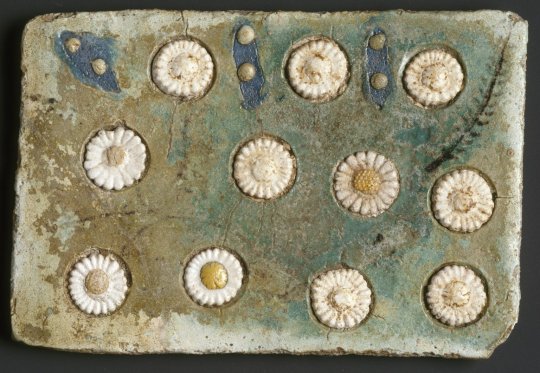
Brightly colored plants and flowers made of faience once decorated the walls of the Great Palace of king Akhenaten at Amarna. Sun light and the disk of the sun itself became the focus of religious worship in the Amarna period (1353-13336 B.C.E.). The floral motifs of these tiles were meant to evoke rebirth of life brought about by the sun. See the artwork in our open collection.

While the Nile was revered as a life-giving place, the desert was also teeming with nature. Here one can see animals breeding in their desert environs. To the right, a feline is showing interest in another feline. At the lower left, a male antelope, mounting his mate, rears his head into the row above. At the lower right, the hindquarters of an antelope giving birth and the emerging head of her calf are partly preserved. The bovine calf at center left completes this depiction of the cycle of life. See the artwork in our open collection.

This detail from a Nasca mantle not only illustrates some of the plants and animals native to Peru’s South Coast, but it also conveys how the society’s spiritual beliefs are connected to agricultural seasons. The blossoming huarango tree seen here represents life and is shown growing out of a human trophy head on the back of a pampas cat. The trophy head symbolizes death but it is also a germinating seed from which life sprouts in a never-ending cycle of life, death, and rebirth. See the artwork in our open collection.

This late-seventeenth-century painting from viceregal Peru shows Saint Joseph standing hand-in-hand with the Christ Child in a field of blooming flora and enclosed within a border of bright carnations and lilies. Saint Joseph’s popularity flourished at this moment in the Spanish Americas as he embodied ideals of fatherhood, marriage, divinity, and masculinity. Here, he holds a stem of white lilies, which symbolize his holiness and purity. See the artwork in our open collection.
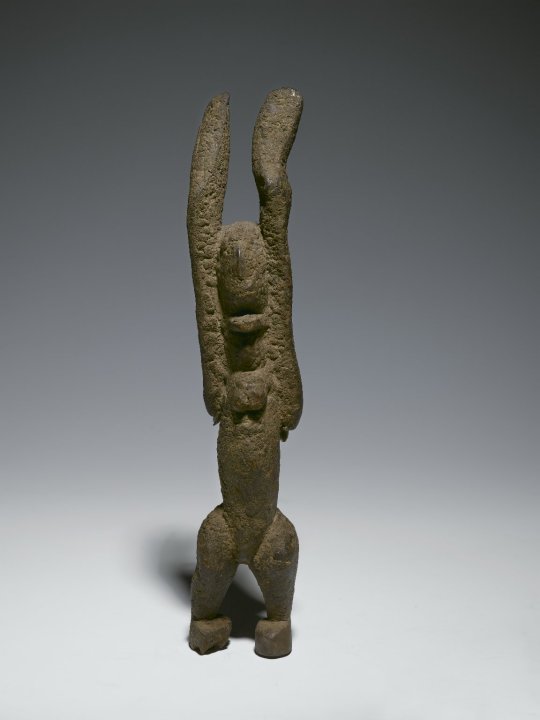
This sculpture would have served as a means for people to contact spiritual intermediaries for aid. Its raised arms are said to refer to prayers for rain, crucial to survive and thrive in arid the Mopti Region of Mali. See the artwork in our open collection.

The use of naturalistic floral motifs, such as carnations, tulips, and hyacinths, was a trademark of the design workshop of the Ottoman court in Istanbul in the mid-sixteenth century. This design principle was adopted in central and distant areas of the empire and applied to different media, such as manuscript illuminations made in Istanbul, textiles made in Bursa, and tiles made in Iznik and Damascus. This octagonal tile from Syria brings the beauty of spring indoors permanently. See the artwork in our open collection.

Vibrant greens and blues bring a spring woodland scene inside the Museum, creating an eternal verdant landscape. The effects of changing sunlight or a passing cloud can animate the glass used to depict the stream, tree trunks and leaves. Originally installed in the Universalist Church of Our Father at Classon and Atlantic Avenues in Brooklyn, the windows were purchased by the All Souls Universalist Church on Ocean Avenue and installed in 1945, before coming to the Brooklyn Museum a few years ago. Tiffany Studio was extremely skilled at creating panoramas that open onto lush, brilliantly colored vistas. See the artwork in our open collection.
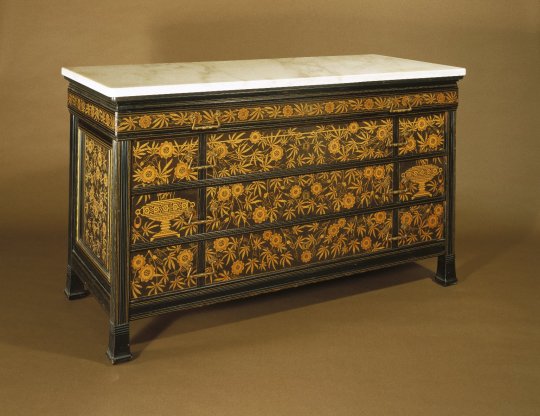
This elaborately decorated cabinet brought ever-blooming flowers into the owner’s bedroom. Inspired by Japanese precedents, New York’s most important late-19th-century furniture manufacturing firm Herter Brothers employed different colored woods to create the densely packed, abstracted flowers and leaves on this luxurious, yet functional chest-of-drawers. See the artwork in our open collection.

In the Japanese tradition, cherry blossom season is a time for celebration: the world wakes up after a long winter and people head outside to gather under the pink-and-white canopies created by trees that seemed barren only a week or two earlier. This year the picnics were cancelled, but in nature the show goes on whether there’s an audience or not. See the artwork in our open collection.
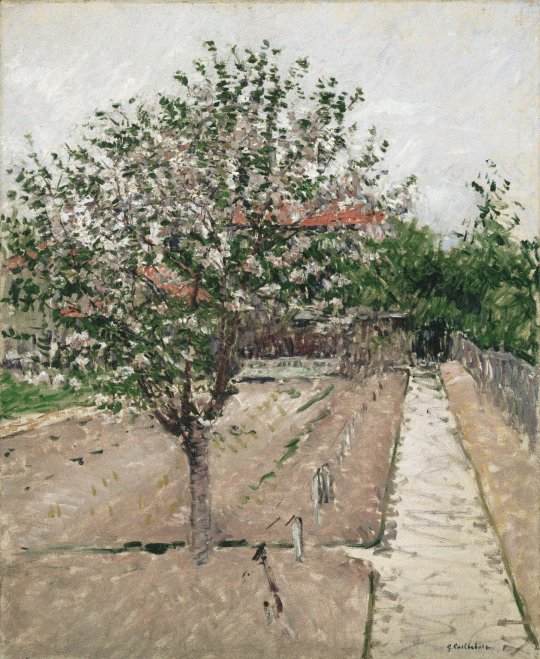
In this painting, Gustave Caillebotte offers a glimpse of his private garden in Petit Gennevilliers, a small village on the Seine opposite Argenteuil. The apple blossoms are rendered in thick touches of paint, which contrast with the sketchy treatment of the path that leads toward the denser foliage beyond the tree. See the artwork in our open collection.

Nothing celebrates Spring more than this dazzling child’s cap with its delicate beadwork on vibrant rose-colored velvet. It was lovingly made by the mother or female relative of a little girl who would have worn it with pride during special occasions. See the artwork in our open collection.

A table set with bread and coffee in a blooming garden along a sun-dappled path conjures the pleasures of the warmer months to come. Robert Delaunay would become known later in his career for more abstract work, but in this early painting the 19 year old artist was still working under the influence of Impressionism. See the artwork in our open collection.

Redolent with the sweet scent of peonies, American Impressionist Ernest Lawson paints his flowerbeds in a dazzling display of jewel like tones in the Cos Cob art-colony located along the Connecticut shore. See the artwork in our open collection.

This Balinese cover features bright brocade rosettes in purple, blue, red, yellow, and green. The gilded gold overpaint features patra cina designs borrowed from Chinese floral patterns. Together, they create a glittering textile that is awash with color and floral motifs. See the artwork in our open collection.

One of the Brooklyn Museum’s most important Japanese paintings is a folding screen showing a group of urbanites walking together, followed by a musician and a servant with a big box. The only clue that they are heading to a cherry-blossom-viewing picnic comes from a woman who extends a branch of flowering cherry back toward a group of men. Attached to the branch is a long strip of paper of the type used traditionally in Japan for writing poems. What does the poem strip say? We don’t know, but it seems fair to guess that it serves as an invitation to romance. The screen reminds us that the spring tradition of partying beneath the cherry trees wasn’t solely about communing with nature. See the artwork in our open collection.

Inspired by Japanese folding screens or byōbu, Elizabeth Boott Duveneck’s five panels bring the natural world into the interior of the house depicting all four seasons from Autumn Foliage to Apple blossoms throughout the year. See the artwork in our open collection.

Beginning in the early 1930s, Consuelo Kanaga became one of few white photographers to make artistic portraits of Black Americans. This closely cropped and sharply focused image of a girl’s face with a flower was likely included in Group f.64’s inaugural exhibition in 1932, which announced a new realist direction in photography. Considered radical in its time, Frances with a Flower explores powerful ideas about beauty, gender, and race. See the artwork in our open collection.

Mary Wollstonecraft was a renowned women’s rights activist who authored "A Vindication of the Rights of Woman," (1792), a classic of rationalist feminism that is considered the earliest and most important treatise, advocating for equality and education for women. Akin to the nature of Spring, Wollstonecraft's life symbolized the fruition of a legacy—from which infinite linages of women continue to reap the fruits of her labor. See the artwork in our open collection.

With rose-patterned leggings and an elaborate floral armature/headdress, Nick Cave’s Soundsuit transforms the human body into a lush garden. Since the early 1990s, Cave has been fabricating inventive sculptures out of scavenged materials, which he often overlays with beadwork, stitching, and other embellishments. One of the first, crafted from twigs, was made to be worn and created a rustling sound, which led to the eventual name of such works: Soundsuits. Cave’s costumes draw from a variety of sources, including both African and Caribbean traditions of masquerade. See the artwork in our open collection.
Posted by Nancy Rosoff with contributions from the Curators and Curatorial Assistants of African, American, Ancient Egyptian, Arts of the Americas, Asian, Contemporary, Elizabeth A. Sackler Center for Feminist Art, and Islamic Art
Photos: Gary Alan Bukovnik (American, born 1947). Rhododendrum, 1980. Lithograph on paper. Brooklyn Museum, Gift of the artist, 81.15.2. © Gary Alan Bukovnik(Photo: Brooklyn Museum); Tile with Floral Inlays, ca. 1352-1336 B.C.E. Faience. Brooklyn Museum, Gift of the Egypt Exploration Society, 35.2001. Creative Commons-BY (Photo: Brooklyn Museum); Relief with Desert Scene, ca. 2472-2455 B.C.E. Limestone, pigment. Brooklyn Museum, Charles Edwin Wilbour Fund, 64.147. Creative Commons-BY (Photo: Brooklyn Museum); Nazca. Mantle ("The Paracas Textile"), 100-300 C.E. Cotton, camelid fiber. Brooklyn Museum, John Thomas Underwood Memorial Fund, 38.12; Cuzco School. Saint Joseph and the Christ Child, late 17th-18th century. Oil on canvas. Brooklyn Museum, Museum Expedition 1941, Frank L. Babbott Fund, 41.1275.191 (Photo: Brooklyn Museum); Dogon. Nommo Figure with Raised Arms, 11th-15th century (possibly). Wood, organic sacrificial material. Brooklyn Museum, The Adolph and Esther D. Gottlieb Collection, 1989.51.39. Creative Commons-BY (Photo: Brooklyn Museum); Octagonal Tile Depicting Peacock in Prunus Tree, 16th century. Ceramic; fritware, painted in black, cobalt blue, green, and manganese purple under a transparent glaze. Brooklyn Museum, Gift of Jack A. Josephson, 1990.21. Creative Commons-BY (Photo: Brooklyn Museum); Tiffany Studios (1902-1932). Dawn in the Woods in Springtime, 1905. Stained glass window. Brooklyn Museum, Gift of All Souls Bethlehem Church, 2014.17.1. Creative Commons-BY; Herter Brothers (American, 1865-1905). Chest-of-Drawers, ca. 1880. Ebonized cherry, other woods, modern marble top, brass. Brooklyn Museum, Modernism Benefit Fund, 1989.69. Creative Commons-BY (Photo: Brooklyn Museum); Utagawa Hiroshige (Ando) (Japanese, 1797-1858). Suijin Shrine and Massaki on the Sumida River (Sumidagawa Suijin no Mori Massaki), No. 35 from One Hundred Famous Views of Edo, 8th month of 1856. Woodblock print. Brooklyn Museum, Gift of Anna Ferris, 30.1478.35 (Photo: Brooklyn Museum); Gustave Caillebotte (French, 1848-1894). Apple Tree in Bloom (Pommier en fleurs), ca. 1885. Oil on canvas. Brooklyn Museum, Bequest of William K. Jacobs, Jr., 1992.107.2 (Photo: Brooklyn Museum); Woodlands. Child's Cap, ca. 1890s. Velvet, cloth, beads. Brooklyn Museum, Gift of the Edward J. Guarino Collection in memory of Josephine M. Guarino, 2016.11.2. Creative Commons-BY; Robert Delaunay (French, 1885-1941). In the Garden (Dans le jardin), 1904. Oil on canvas. Brooklyn Museum, Gift of Iris and B. Gerald Cantor, 86.28 (Photo: Brooklyn Museum); Ernest Lawson (American, 1873-1939). Garden Landscape, ca. 1915. Oil on canvas. Brooklyn Museum, Bequest of Laura L. Barnes, 67.24.10 (Photo: Brooklyn Museum); Cover, 19th or early 20th century. Silk, pigment. Brooklyn Museum, Dick S. Ramsay Fund, 45.183.110. Creative Commons-BY; Cherry Blossom Viewing Picnic, ca. 1624-1644. Ink, color and gold leaf on paper. Brooklyn Museum, Gift of Frederic B. Pratt, 39.87. Creative Commons-BY (Photo: Brooklyn Museum); Elizabeth Boott Duveneck (American, 1846-1888). Apple Blossoms, 1882. Oil on wood panel. Brooklyn Museum, Gift of Joan Harmen Brown, Mr. and Mrs. William Slocum Davenport, Mrs. Lewis Francis, Samuel E. Haslett, William H. Herriman, Joseph Jefferson IV, Clifford L. Middleton, the New York City Police Department, Mrs. Charles D. Ruwe, Charles A. Schieren, the University Club, Mrs. Henry Wolf, Austin M. Wolf, and Hamilton A. Wolf, by exchange, Frank Sherman Benson Fund, Museum Collection Fund, Dick S. Ramsay Fund, Carll H. de Silver Fund, John B. Woodward Memorial Fund, and Designated Purchase Fund , 2005.54.3 (Photo: Brooklyn Museum); Consuelo Kanaga (American, 1894-1978). Frances with a Flower, early 1930s. Gelatin silver photograph. Brooklyn Museum, Gift of Wallace B. Putnam from the Estate of Consuelo Kanaga, 82.65.10 (Photo: Brooklyn Museum); Judy Chicago (American, b. 1939). The Dinner Party (Mary Wollstonecraft place setting), 1974–79. Mixed media: ceramic, porcelain, textile. Brooklyn Museum, Gift of the Elizabeth A. Sackler Foundation, 2002.10. © Judy Chicago. Photograph by Jook Leung Photography; Nick Cave (American, born 1959). Soundsuit, 2008. Mixed media. Brooklyn Museum, Mary Smith Dorward Fund, 2009.44a-b. © Nick Cave (Photo: Image courtesy of Robilant Voena)
#virtualtour#springtime#spring#brooklyn museum#museums#brooklyn#virtual tour#art#art museum#bkmtours#virtual tours
571 notes
·
View notes
Text
Helpless (Part Six)
Let me know what you guys think!
*banner by @starkrobb*
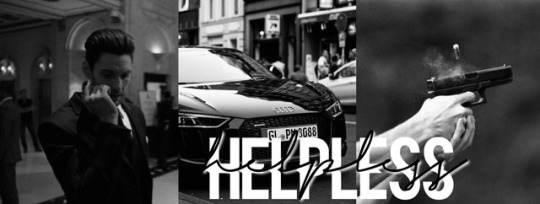
You had no idea who this Frank guy was, but you assumed he worked with Billy. The phone rang once before a gruff voice answered.
“You got news for me, Bill?”
You took a breath. “Um… Hey. Hi. This isn’t Billy, but he, uh… asked me to call you—”
“Who the hell is this?” The man asked back.
You bit your lip; you weren’t sure if you were supposed to give this guy a fake name or be honest with him. You decided to compromise with yourself. “I’m with Billy,” you answered, “He’s, uh, protecting me and he asked me to call you.”
“Where’s Bill?”
You heard a gunshot in the distance and turned to see Billy standing over a body a few feet away. “He’s over there,” you said, knowing the man couldn’t see what you were referring to, “Making sure all the guys who attacked us are dead. He wanted me to give you this location…” You rattled off the numbers and directions on the GPS, and the man grunted in response. “Are you… Are you coming?” You asked after he didn’t say anything. “Billy set our car on fire.”
The man made a noise that you interpreted as a chuckle. “Sounds about right… Yeah, I’m on my way.” And with that—he hung up.
You stared down at the phone in your hand, unsure of what to do and unhappy with your current state of restlessness. When you looked up again, Billy was approaching you.
“Did he answer?” He asked, guiding you by your elbow and leading you away from the burning car.
“Yeah, or well—someone did,” you said back, “Did you kill the guys?”
Billy nodded, eyes facing forward. “One was already dead. I killed the other two.” He glanced down at you, watching you for any signs of shock or disapproval; he didn’t find any. “So,” he said, hand still on your elbow, “back there, you were… That was impressive.”
“What? My driving?”
“Yeah. I’d seen surveillance photos of you that Homeland had,” he grinned, “but seeing you in action was… You got skills.”
You grinned back. “Thanks.”
“So where’d you learn to drive like that?” He asked.
You shrugged. “I kind of just taught myself,” you answered, “My parents died when I was young, and I kind of hopped around in the system for a few years…”
Billy was staring at you. “You grew up in the system?”
“Till I was adopted. Why?”
He looked away. “My mother abandoned me when I was an infant,” he said, his voice carefully casual, “Left me on the steps of a church.” You could feel his hand on your arm, firm and heavy. “I grew up in the system, bounced around from group home to group home till I aged out.”
You blinked. “You never… You were never adopted? Your mom never came back?”
“Nah,” he shrugged, his hand falling from your elbow, “I used to think maybe she’d come back for me, but that shit is for the story books…” He turned back to you. “But I guess the story came true for you, huh? Adoption? How was that?”
You scoffed. “C’mon man, I know you read my file…”
He stopped, and you stopped with him. “I saw that Yakavetta was listed as your father, but I thought that was some kind of insurance ploy you guys came up with as a scam… He adopted you?”
“Uh huh,” you felt strangely nervous, so you reached down and took Billy’s hand in yours, leading him forward, “Ronnie, too. It was a scam, just not for insurance,” you explained, “Joe wanted complete control over us. He’s…” You took a breath, thinking of that last night you’d been with Joe and Ronnie. “He killed my brother,” you said, eyes glazed over, “I never thought of Joe as a father figure, but Ronnie was my brother. And now he’s dead.” You blinked, looking up at Billy. “You never looked for your mother?”
Billy gave a humorless laugh. “That—I… Usually, when people ask me that, I lie,” he said, looking over at you, “But I don’t… Shit, I don’t know why, but I don’t want to lie to you.” He squeezed your hand in yours. “I found her when I was 15,” he told you, “She was a drug addict, and she said she wanted me to have a better life…” He shook his head, laughing again. “She’s in a facility now,” he went on, “They say she’s got a ‘nother few years left in her.”
“And your father?”
“Who knows? Ma was so cracked out, she has no idea who my sperm donor was,” he said back. “What about you? What were your parents like?”
Things went on like that for what felt like hours; you and Billy playing your own version of 20 questions while you walked. You told Billy about your parents and the heists you’d done with Ronnie and Joe and the crew, and he told you about his time in the Marines.
“That’s where me and Frank met,” he said, his hand still in yours, “We were both born to be soldiers.” He stopped, dropping his hand.
“What?” You asked.
“We’re here,” Billy leaned against a boulder.
You looked around, you were in a clearing, surrounded by miles and miles of nothing peppered with a few small bushes, boulders, and trees. “Where’s here?”
“This is the location we sent Frank,” he answered, crossing his arms, “I gotta ask you somethin’…”
“Okay…”
“This… I just…” He sighed, starting over. “This shit with Yakavetta is deeper than I thought, and I don’t believe in fate or anything like that, but you gotta admit… You being involved in this can’t just be a coincidence.”
“What do you mean?”
“Yakavetta’s file is long,” he said, “and I’ve gone through it about 100 times. It looks like he’s been flirting with the mob, and I know a guy who specializes in that world.”
“Frank,” you supplied.
He grinned. “Yeah. It’s just… I don’t know you at all,” he said, “but it feels like I do. It’s ridiculous.”
You laughed, going to stand next to Billy with your back against the rock. “I know what you mean.” You looked up at him, he was bloody and sweaty and still looked appealing to you. You felt a strange sense of comfort by his proximity, and you had to admit—Billy checked a lot of your boxes without you even knowing you had boxes to check. “Can I ask you something? Like… For real?”
“Yeah.”
“Why did you stop calling?” You pushed off of the rock and faced him. “I’m not… It’s fine, I just… I always wondered.”
Billy sucked in a breath. He put a hand through his hair. “It’s not because I didn’t enjoy… what we did,” he started.
“Oh, yeah,” you grinned, “I know that.”
He chuckled, shaking his head slightly. “I, uh…” He looked up at you, those dark eyes shining. “My business—this business,” he clarified, “had been a dream of mine for a long time. But dreams cost money,” he shrugged, “Charm, courage, skills—those things I had, but money? Nah. So I made an arrangement with this rich asshole I met in active duty, did some things that were…”
“Illegal?” You guessed.
He nodded. “Yeah. Spilled a lot of blood in the pursuit of the American dream,” he answered, “And he paid well. By the time me and you started hooking up, I was almost paid up. Then one day he called, had one last job that would settle the debt and I…” He looked down, self-disgust and raw anger clear in his face. “I had to go running when he called.” He looked back up at you, and you had the feeling that this was the most honest Billy had ever been with another person in a long, long time. “I never meant to be away for so long, and by the time I came back…”
“…I was gone,” you finished.
Billy stepped over to you, moving slowly. He moved as if he thought you’d move away from him, but you didn’t. You couldn’t. You watched as he raised his hand and put it on your face, his deep eyes staring into yours. “Where did you go?”
“A job,” you answered, “Joe called and I…”
“…had to go running,” Billy’s lip twitched upwards, “Yeah…”
“When you took this job,” you said, hands going to wrap around his middle, “you said it was because it was personal. When I left…did you miss me?”
He nodded. “I didn’t want to,” he admitted, “I didn’t understand why I did, but I did. I missed you.” His hands dropped to your waist. “Did you miss me?”
Fuck—what a question. “Yes,” you breathed out.
Billy leaned down and kissed you, and you kissed him back. You were being tracked down by Joe, there were dead bodies only a few miles back, you were virtually helpless, but you couldn’t stop yourself from melting into his touch. Billy gripped you tight, and you did the same to him. He pulled back; you were grinning—
—but he was not.
“I have to tell you something,” he said, stepping back. He glanced behind him, and you saw dust billowing up in the distance.
“What’s going on—”
“It’s Frank,” he assured you, not at all concerned, “Just—listen…” Billy ran his fingers through his hair again, a nervous habit that was starting to make you nervous. “I—in your file, in Joe’s file, there was… Someone on your crew…” He stepped back again, and you frowned. “Homeland had an informant. Madani was getting information in exchange for immunity—from your brother.”
Your eyes widened. Ronnie. You felt tears prick in your eyes, but you blinked them away as the sound of the approaching car got louder.
“Y/N…” Billy said.
You shook your head, moving past him to watch the car pull up. You watched, detached and cold all over, as a black van pulled forward. You heard Billy behind you, gathering the duffel bags, and you watched as a man got out of the van. Your jaw dropped.
“Is that the fucking Punisher?” You asked, gawking.
“He goes by Frank,” Billy deadpanned, standing beside you now.
“What the hell’s going on here, Bill?” Frank asked, lumbering over. “Who’s she?”
“This is Y/N,” he answered, walking over and shaking up with the freaking Punisher, “she’s my client.”
You scoffed, and both men turned to you, an eyebrow raised. “Yeah,” you said, walking over to the car, “I’m the client. Nice to meet you.”
Billy and Frank exchanged a glance behind your back but said nothing. The three of you piled into the van, and Billy caught Frank up on what was going on—Homeland, the mole, how your life was in danger.
“Wait,” Frank said, turning the wheel, “What’s this guy’s name again? The one Madani’s so hot for?”
“Joe Yakavetta,” Billy answered, “You know him?”
Frank’s jaw tightened. “Yeah, I know him. He’s on Rawlins’ payroll. Yakavetta leads to Rawlins.”
You could see the tension in both men’s shoulders from the back seat, and you leaned forward. “Who’s Rawlins?” You asked.
Frank glanced at you, then at Billy before looking back at the road. “It’s a long story,” he said, his voice gruff.
“He’s the one I owed the debt to,” Billy said, and you could tell there was much more to the story. So much for being honest.
“I got a warehouse,” Frank informed you, “We can regroup there, dress your wounds,” he said, nodding over at Billy, “Figure out what to do next.” He glanced back at you again. “Madani know you’re with me?”
You looked at the back of Billy’s head, unsure.
“Nah,” Billy answered, “Homeland can’t be trusted. I sent Madani an SOS, but stopped all communication from there.”
“Madani’s on the up-and-up,” Frank pointed out, “but I agree it’s best to keep this contained. I put in a call to Micro.”
Billy groaned.
“Who’s Micro?” You asked. “Or… what’s Micro?”
“What is a good question,” Frank said, smirking, “He’s my tech guy.”
“He’s a fucking weirdo,” Billy sighed.
You sat back, hands in your lap, and listened as the two men talked about Micro and warehouses and shit you didn’t understand. You felt numb, but the numbness kept being interrupted by random shock of pain in your chest, and it was like you could see and feel 100 things at once. You saw Ronnie, heard his laugh, saw his blood, red and slick on your hand while at the same time seeing Khalil’s wide eyes and hopeful smile, and Joe’s cold, critical eyes. You could feel Billy’s hands on you, could feel the soft firmness of his lips ghosting over your skin, heard the way he said your name when he was inside of you all while feeling the way your chest had tightened the day he stopped answering your calls. You sat there, feeling everything and nothing all at once, until Frank pulled the car into an underground garage. You got out, avoiding making eye contact with Billy, and followed them into the warehouse, as Frank had described it.
His description was spot on.
The warehouse was, at best, a spacious wasteland. There were a few chairs, a table, and lots and lots of guns and computers, but not much else.
“I forgot how depressing this place is,” Billy mumbled, tossing your bags in a corner.
“It ain’t no penthouse,” Frank agreed, “but it does the trick.”
“Is the trick claustrophobia?” Billy deadpanned. He was watching you; you could feel his eyes on you, but you were busy staring up at the many monitors on the wall.
“What’s all this?” You asked, eyes darting from one screen to another.
“Surveillance,” Frank said simply.
“That’s Anvil,” Billy was next to you now, and he pointed at a screen on the far left. There were men and women training with about five people supervising. The space looked impressive, you had to admit.
Frank disappeared somewhere, but you heard his low, gruff voice and assumed he was on the phone. You didn’t look at Billy, just stared at the screen. “Nice,” you said, referring to Anvil.
“Hey,” Billy said, “listen… Your brother, he… He was doing what he thought was best—”
“How would you know?” You asked, turning to him, eyes narrowed. “You read it in his file?”
“Actually,” Billy turned, going over to the bags and unzipping his, “I did.” He pulled out a manilla folder and held it out to you. “Here.”
You walked over and took it. “What is this?”
“Ronnie’s file,” Billy answered, “and Joe’s. And yours.” He stepped back. “You should read it.”
You looked down at the files in your hands, and suddenly you were afraid. What would you find out? What else hadn’t you known about your brother?
“It might help,” Billy went on, “There are things in there… Homeland—Madani—knew more than she let on, and I should have…” He sighed. “Just… Read it,” he said, walking off, “please.”
You sat down at the table, moving a few sandwich wrappers and bullet packs out of the way. You started with Ronnie’s file, eyes moving over the text greedily. He’d been reporting to Homeland for over 6 months—how had you not known? And more importantly—why hadn’t he told you? And what was his plan? Once he was granted immunity, would he visit you in jail? Was he concerned about Jamal and Justin and Khalil and Alex? Didn’t he care about any of you? You flipped the page, feeling your heart constrict as you read on. He’d reported to Stein, who you knew for a fact reported to Madani. She’d known about Ronnie, who he was, way before she waltzed into that police station to “save” you. He’d trusted her—a stranger, a cop—more than he’d trusted you, and man… That shit hurt. You turned to the next page, ready to throw each and every piece of paper to the ground, when you stopped.
Ronnie’s contact with Homeland was there, that scrawl that he called a signature scribbled on the bottom, and oh…
There were contingencies to the agreement, things Ronnie required before he gave Homeland even one piece of information—
—immunity for you and leniency for the others.
Your eyes filled with tears, and suddenly, you were crying. Ronnie did everything he could to protect you and the guys, there was nothing in the contract about himself, nothing to benefit him—just a guarantee that no legal action would be taken against his sister. The tears fell silently, and you covered your face with your hands. Ronnie was the only good thing you’d ever had in your life, the only person who never left you, and he did everything for you. And now he was gone.
You were all alone.
“There was nothing in the world more important to your brother,” Billy said, his voice low behind you, “than you.”
You nodded, back still to him. You couldn’t speak, and even if you could—you didn’t know what to say. The grief and anger and sorrow were just too much. You closed your eyes, shuddering, when you felt Billy’s hands on you. He pulled you, gently, from your seat, and turned you around to face him. Wordlessly, he wrapped his arms around you, and you let him. You sank into his chest, crying and shaking, and let him hold you. It was like you were floating in a cloud of emotions, and he was your anchor, keeping you level.
“Did you read the other files?” He asked.
You shook your head.
“Madani’s notes say that it was likely Yakavetta knew that Ronnie was working for Homeland,” he said, “but they didn’t pull him—or you. They wanted more info before they made good on his contract.”
You looked up at him, eyes wet with tears. “Madani knew?”
“Possibly. It’s like I said before, Homeland doesn’t care about protecting you or Ronnie or any of their witnesses—they care about making a case.” Billy reached up and wiped your tears, his hand warm on your face. “But I care about you,” he clarified, “I didn’t want to, but I do. And I swear, Y/N, I will protect you.”
That brought a new batch of tears to your eyes, and you leaned into Billy’s touch, suddenly desperate for it.
“Billy—” Frank’s voice broke through the tension, and you and Billy stepped away from each other. You dabbed at your eyes, wiping away the rest of your tears. “Micro’s on his way. He says Yakavetta’s been scooped up by Rawlins and they’re heading to his compound.” His eyes were wide and wild. “It’s time to make a move.”
Billy nodded. “So it’s true, they’re working together. This speeds up the timeline.”
“Yeah it does,” Frank went to the table and grabbed a gun that looked like it belonged in a video game, “And adds some new bodies to the deadpool.”
“Joe’s probably got his own security?” Billy asked you.
You nodded. “Knowing him, he’s got a new crew too: tech guy, gunner, driver—he likes to have a full deck.”
“We’re gonna have to revamp our plan here,” Frank grunted. He looked over at you. “You any good with one of these?” He asked, lifting up the gun.
“I can shoot, if that’s what you’re asking,” you answered.
“She’s not coming with us,” Billy interjected, “she’s staying here.”
“What? Like hell I am—”
“You’ve got a target on your back, and we’re going up against an unknown number of guns. You’re staying here where it’s safe.”
“Hell no! I’ve got a target on my back; I need to be in the action!” You glanced at Frank, but he was busying himself with looking through your/Billy’s files. “Billy, Joe is after me. I can’t just keep hiding—I need to face him head on!”
“You need to stay here,” Billy shot back, “I’m not asking for your opinion, Y/N.”
You stepped up to him, glaring up at him with tears still wet on your eyelashes. “And I’m not asking your permission, Russo.”
Billy glared down at you, but you could see a spark in his eyes. You felt it too: that uncontrollable, completely irrational want that bloomed within you whenever you were close to him, or even thinking about him. He opened his mouth to say something—that mouth that you wanted to kiss—but closed it when Frank spoke up.
“We could use her help, Bill,” he said, waving your file in the air, “She’s got skills.”
“Thank you,” you sighed.
“Micro’s pulling up,” Billy said, turning away from you. Frank, grinning, walked off to receive his friend. Billy glanced back at you. “This conversation isn’t over,” he said, turning and following Frank.
You grinned. “I dunno, man,” you called after him, “Feels over to me!” You turned back to the monitors, triumph, and looked up at them—
—only to find them glitching, the images distorted and twitching. You turned again, about to shout for Billy or Frank, but stopped…
…there was a red dot on the middle of your chest.
*******************************************************************************************
OOOOOOOH, somebody’s bought to get SHOT! Thanks for reading!
Everything Taglist: @encounterthepast @jigsawlover10 @gollyderek @charlylama @realduckvader @teacuplotus @whovianayesha @lexxierave @loveintheroyalfamily @fanfictionrecommendations-com @maxslime-blog @songforhema @lucielandss @themadhatter92 @christinawxxx @anabella-baby @blackcoffeeandgreenteaforme @luminex3 @ashkuuuu @luckysstrikes @carlaangel86 @floralpeaceofmind @dylanobrusso @iaintnofurry @ymariejp @its-my-little-dumpster-fire @mrsjaxtellerfan @holamor @drinix @rhabakoli @stories-you-wont-hear @king4thesirens @leahnicole1219 @evanlys19 @binbons-is-theloml @aikeia @bitch-imma-head-out @witchygagirl @geeksareunique @sparrows-books
Benny B Taglist: @suchatinyinfinity @fandomlifeandeverythingelse @starkrobb @elanor-of-imladris @thesumofmychoices @marauderskeeper @honeyydippaa @thebabblingbookworm @kathuang13 @ladyblablabla @woodlandreads @ms-delos @belladonnarey @thesandbeneathmytoes @georgiagrl1990 @kahlanmars @the-blind-assassin-12
Benny B Taglist (minus Sirius): @banditthewriter @something-tofightfor
Helpless Taglist (let me know if you’d like to be added or removed): @accioromancff @funerals-with-cake @700teacups @thesumofmychoices @wangmangagavroche @aikeia @im-a-mess-ness @fangirlharbor @vhgirlforever @coraz0ndcristal @contanto-que-voce-me-queira @editboutique @lysawayne @benbarnestongue @fireeyes-on-teller-dixon-grimes @agent-bossypants @hellsregnantqueen @ilkaeliseb @kimmie113080 @sweetybuzz25
237 notes
·
View notes
Photo

After her marriage with Frank Randall has failed and Claire Beauchamp flees from her violent husband, she finds refuge in the house of the Fraser/Murray family in Berlin-Wilhelmshorst. But then tensions arise between Britain (which has since left the EU) and some EU member states. All holders of an English passport are required to leave EU territory within six weeks … and suddenly Claire’s fate looks more uncertain than ever.
This story was written for the #14DaysofOutlander event, hosted by @scotsmanandsassenach

Note: This chapter contains references to domestic violence and suicidal thoughts. If these things trigger something in you, please skip this chapter.
Chapter 3: 14 Seconds (1)
Etienne Marcel de Provac Alexandre was satisfied. No, Etienne Marcel de Provac Alexandre was not satisfied. He could not be satisfied at all, because in reality he did not exist. It was James Alexander Malcolm MacKenzie Fraser who was satisfied that Etienne Marcel de Provac Alexandre, his alias, had also successfully completed this assignment. Neither the negotiations nor the conclusion of that special trade agreement with the Argentinians had caused any problems, so he was able to finish his job in the time allotted.

“Buenos Aires - Skyline” by maymuc
The success with which he had been able to complete his mission helped him to get over the inconvenience of his onward flight to Boston. It took more time for these 8,500 kilometres than for the return flight from Boston to Berlin. So he flew from Buenos Aires-Ezeiza shortly after eight in the evening first to Lima, where he had an 80-minute stopover at the Jorge Chavez International Airport. Then he was able to board a plane that took him from the Peruvian capital to Florida. He used the time on the plane to get some sleep. When he arrived at Miami International Airport, he first had an extensive breakfast. Then he wandered around a bit, just to move his legs and afterwards he immersed himself in various wine magazines. While he was still reading and waiting for his connecting flight to Boston, an elderly gentleman approached him. According to his legend, Jamie introduced himself as a French wine merchant who, on behalf of the Berlin-based company "In Vino Veritas - International Wines and Spirits", searched for new wines worldwide or brokered wine sales to partners. This company - "In Vino Veritas" - really existed. And if anyone should have the idea to make further investigations about the firm, he would find nothing else but a flourishing wine and spirits trade, based in the German capital. Every time James Fraser mentioned this name or passed on his business card bearing this company’s name, he had to force himself not to smile. The irony of this name had made him laugh out loud when Ernst Neuenburger first told him about it. Because there was no truth in the wine that this company sold at all. On the contrary, this wine was nothing but deception. "In Vino Deceptio" would have been the correct name, but for very understandable reasons, that name had not been chosen. Ernst Neuenburger had acknowledged Jamie's loud laughter by saying:
"Irony is one of the best gifts to survive the challenges of this life."
The elderly gentleman who approached him at the airport in Miami made a harmless impression. He showed no great interest in the personal background of the person he was talking to, nor in his business relationships. It seemed as if he was simply trying to bridge his own waiting time by philosophizing with someone he liked about a topic in which both were interested. For Jamie, that was o.k. It was due to his thorough preparation by Ernst Neuenburger's staff that Jamie was not only very well versed in European wines, but also in Australian, New Zealand, North and South American wines and their respective markets. On their behalf, he attended the Austrian Wine Academy and completed his training as a Wine Academician with the Wine Diploma, also known as the "International Wine Specialist". He was thus not only accepted into the "Club of Wine Academics", whose members were active in 41 countries around the world, but also acquired the prerequisites for the "Master of Wine" degree. Jamie was happy to take the trouble of this training, which not only helped him to fulfil his covert mission, but also raised his status in his real business life. The fact that his certificates and diplomas were issued in his alias name and in the name of James Fraser was also taken care of by Neuenburger’s staff. Etienne Marcel de Provac Alexandre talked for almost an hour with the older American, who introduced himself as Bob Snider ("the one from Boca Raton, not the folk singer from Canada"), mainly about American, French and German wines. Then his flight was called and Etienne Marcel de Provac Alexandre said a hearty farewell to his interlocutor.

“Terminal - Miami International Airport” by Martin St-Amant (S23678) - Eigenes Werk, CC BY 3.0, https://commons.wikimedia.org/w/index.php?curid=6281155
When James Fraser took his seat on the plane that was supposed to take him (finally!) to his next destination, he first wrote down the content of his conversation with "Bob Snider" and all the details he could remember about the man he had spoken to. The senior may have been harmless, but the mere fact that a stranger had come to speak to him obliged him to report this contact to his employer. It was shortly after three in the afternoon when his plane landed at Logan International Airport. He took a taxi to the hotel where "In Vino Veritas" had booked the so-called "Boston Studio" for him. When he entered the room, he had to smile. The arrangement of the furniture in the various hotels around the world amazed him again and again. Here, it was the mixture of modern furniture and furniture trimmed on old that made him shake his head slightly. He would never really feel comfortable in such a mixture. But maybe it was better that way. The discomfort he felt in such rooms made him want to return home all the more. All that mattered to James Fraser was that the hotels booked for him had a fitness area that was open 24 hours a day. And that's exactly where he went after having a light dinner in the hotel restaurant that evening. One hour of workout and a long shower later he returned to his rooms where he went over the planning for the next day. Twenty minutes later James Fraser, alias Etienne Marcel de Provac Alexandre, sank into his bed and fell asleep contentedly.

“Luftbild des Hafens von Boston” by ArnoldReinhold - Own work, CC BY-SA 4.0, https://commons.wikimedia.org/w/index.php?curid=83686125
Just a few blocks away from Fraser's hotel, Claire Elizabeth Beauchamp Randall was lying in the bed of her conjugal bedroom. Tears were streaming down her face and wetting her pillow. Although she had been lying under her warm blanket for more than half an hour, she trembled all over her body as if she were standing outside the house on a frosty winter's night without a coat. Behind her lay another evening of arguments, insults and humiliation. Frank, her husband for almost 10 years, had left the house at some point in a rage. She knew that he would now be sitting and drinking in one of the nearby bars. If he picked up any woman who wanted to spend the night with him, he was never expected to come home soon. But if he left the bar empty-handed, he would return ‘home’ and the night could turn out even darker. Frank Randall could not find a woman that night who would voluntarily share a cheap hotel bed with him. He returned to the house he and his wife had once called ‘home’. That night, Claire Elizabeth Beauchamp Randall's worst fears came true.
The next morning, James Fraser woke up well rested and full of energy. His first course, after a brief visit to the bathroom, took him back to the hotel gym and then to the shower. Just as he was getting dressed for the new day, the room service brought the "Continental Breakfast" that he had ordered the night before. He had breakfast, reading on his tablet the various international newspapers whose online editions he had subscribed to. Exactly the peaceful and quiet morning time, as he appreciated it. There were still four hours to go before his next appointment, a business lunch with “Paul Smith”. That man was also on Ernst Neuenburger’s payroll but had a completely different legend. Jamie had decided to use this time to have a look around the area of his hotel. The hotel's limousine service first took him to Paul Revere's house, and an hour later he was driven from there to the Old North Church. He would also have liked to visit the Museum of Fine Arts, but there was not enough time left and so he let his driver take him to the steakhouse where he should meet "Paul Smith". When he arrived there, his "business partner" was already sitting at the table reserved for them. The men, who had never seen each other in person before, greeted each other like long-time friends. No one would have suspected that they knew each other only from photos that Ernst Neuenburger had placed quite innocently in the advertisements of a wine magazine some time before. They ate and drank and had lively conversations (and for those sitting nearby with ears too big) about current trends in the wine scene, prices, order quantities and shipping options. At the end of the extensive business dinner, they signed each other's contracts, both of whom knew that they would never experience any real economic development, and then toasted each other loudly with champagne to this glorious "business deal". Shortly before three o'clock in the afternoon, "Etienne" and "Paul", who called each other by their first names only and addressed each other as "brother", left the restaurant. Their sunny mood was in stark contrast to the dull, autumnal weather that swept over the city of Boston that afternoon. Paul waved at a passing taxi and got in. Jamie waited for the limousine service, which was parked a bit far away, and due to the rather cold weather was quite happy that the car started moving in his direction immediately. While he was still waiting, his eyes fell on an advertising flyer, which was driven across the sidewalk by a light wind. A name that was emblazoned on this flyer caught his attention. It was the name of a painter - Gerhard Richter. Jamie not only admired the paintings of the professor, who had taught painting at the Art Academy in Düsseldorf from 1971 to 1993 and whose works were among the most important and expensive of any living German artist. He was also fascinated by his life story, to which Florian Henckel von Donnersmarck had set a monument in his film "Never look away" (”Werk ohne Autor”). Without thinking for long, Jamie bent down and picked up the flyer. Still in the car he began to read. A small gallery not far from his hotel advertised an exhibition documenting Richter's life and work. Jamie put the flyer in his left breast pocket. He would love to spend part of his free evening visiting this exhibition. But now he had to hurry, because a small, private teleconference with the "managing director" of "In Vino Veritas" was scheduled for three o'clock in the afternoon local time, and he didn't want to be late.
While Etienne Marcel de Provac Alexandre reported to his boss in faraway Berlin about the successfully concluded contracts with "Paul Smith", Claire Elizabeth Beauchamp Randall made her way through her neighbourhood. Although the weather was unusually cold for the time of year, with 13.8 degrees Celsius, she could no longer bear to stay in her "home" after everything that had happened the previous night. At first she had thought of going to a nearby café that she visited regularly in the past. But the thought of having to sit on a hard wooden chair had made her refrain from doing so. Not far away there was also a church that she had visited repeatedly and the fact that the pews were furnished with soft seat cushions lead her steps hopefully towards this building. But her hope was to be disappointed. On the - closed - main portal there was a handwritten notice that on that day the doors of the church would stay closed due to a sudden illness of the sexton. Resigned, she turned around. Where could she go now? Her gaze fell on a small gallery that was open until six o'clock in the evening. That was still three hours away. Three hours in which she could look at the pictures there, or sit down in front of one of the works of art. Three hours in which nobody would approach her or ask her about anything. Three hours in which she could think about her next steps in peace. Somehow she had to find a way out of this misery. But she did not know how. Only one thing she knew with one hundred percent certainty: She would never return to Frank Randall. Not a single moment would she voluntarily stay in the presence of this monster again. She would rather put an end to her miserable existence. Claire had already thought about this once before. Back then, on 31 May 2018, when Longfellow Bridge was reopened after five years of repairs. But when she stood on top of the bridge, she was not sure whether a jump from there would bring the longed-for end to her agony. She had turned away and had returned. Returned to her life with Frank, whom she knew was cheating on her regularly. Returned to a life of lies. Returned to a life where she tried to numb all her pain with alcohol and pills. But if her experience had shown one thing, it was that no drug in the world could cover those wounds, especially not those that Frank had inflicted on her the previous night. Something had to happen.
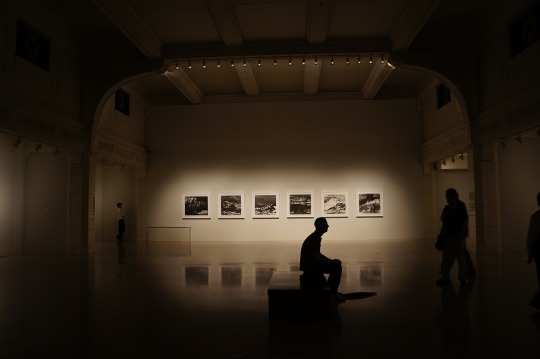
“Ausstellung” by beludise Twenty minutes before 4:00 pm Jamie had finished the conference call. Through one of the windows of his room he looked outside and noticed that the sky was darkening. A strong wind had come up and rain began to patter against the windows. But even if the thunderstorm was about to start, he would not be deterred from visiting the small gallery whose flyer he still carried with him. He dialed the number of the reception and ordered the limousine service again. On the way to the lobby of the hotel he thought about how much he would have loved to get in touch with Jenny, Ian and the kids via video conference. But that was not possible. The chance of endangering himself, his job and possibly his family was too great. But it would not be long before he would finally see them again. The following evening his flight left and the following day, with a small detour via the headquarters of "In Vino Veritas", he would arrive back home and see them all again. He was already looking forward to it very much. For him, his family was the most valuable earthly possession and he wished for nothing more than to be able to start a family himself one day. Up to now he had always pushed that thought away. While he was still living in Scotland, the administration of his parents' estate and the political activities took up all his time and energy. Moreover, he would not have wanted any women to be the wife of a man who was a convicted traitor, being held in a London high-security prison and therefore not able to provide for his family. But more important than this was the fact that he had not yet met "the" woman with whom he really wanted to spend his whole life and with whom he wanted to start a family. When he entered the foyer and the receptionist told him that his limousine had just arrived, James Fraser had no idea that he was less than an hour away from that very encounter. Claire Elizabeth Beauchamp Randall had entered the gallery, paid the entrance fee and accepted an exhibition guide, which she had immediately stowed in her handbag. She had wandered aimlessly through the rooms until she found a small bench in one of the back exhibition rooms. It stood in front of a picture showing an older man with glasses, standing in front of a reddish wall. But she only took note of it peripherally. Much more important in her present situation was that there was soft upholstery on the bench. Carefully she sat down on it and yet the pain went through all her limbs.
When Jamie's limousine stopped at the curb in front of the gallery entrance, it had already begun to rain in torrents. The sky had darkened to black and now and then a loud roll of thunder could be heard. Carl, the limousine driver, parked near the entrance and then quickly jumped out of the car with a large black umbrella bearing the logo and name of the hotel in golden letters. He opened the door on the rear passenger side and held the umbrella so that Jamie could get out without getting wet. The chauffeur accompanied him the few steps to the gallery, then quickly hurried back to the limousine where he would wait for the guest to return. As soon as he had entered, Jamie was greeted by a friendly member of the gallery staff. He paid the entrance fee and received the exhibition catalogue. Then he slowly started his way through the exhibition. It took him about forty minutes to reach the back room of the gallery. Already from a distance he saw the well-known photo that showed the painter in front of his famous work "Wall". Only once had Richter had himself photographed in front of this work. This photo had then adorned the title page of the art magazine "art".

“Locken” by KRiemer In front of exactly this two-meter by two-meter picture sat a petite woman, whose head was surrounded by an only slightly tamed, dark brown mass of curls. Carefully and anxious to make as little noise as possible, Jamie approached her with some distance. A few minutes passed, then he heard the woman sniffing softly. She opened her handbag and was obviously looking for a handkerchief in a hurry. Jamie reached into the right pocket of his jacket and pulled out a pack of Tempo tissues, which he opened and held out to the unknown woman.
"Please, take one of these.” The woman turned her head up to him and looked at him with big amber eyes, red from weeping. Later, James Fraser would tell again and again how those first 14 seconds, when he looked into the most beautiful eyes in the world, decided his future path of life.
#14DaysofOutlander#Outlander#From Boston to Berlin in 14 hours#Claire Beauchamp#Jamie Fraser#Frank Randall#Boston#Berlin#Ian Murray#Jenny Murray#Outlander Fan Fiction#clairexjamie
61 notes
·
View notes
Text
The Celtic Tiger - A Kaiserreich Ireland AAR Chapter 2: An American Tragedy
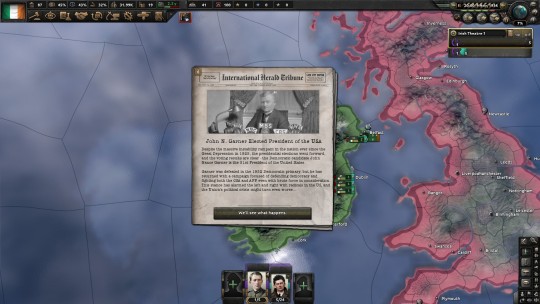
12 February 1937 - Home of Michael Collins, Cork, Ireland
“The United States of America has faced challenges since its founding, but it is an enduring republic. When we were invaded, we fought off our attackers. When the Great Storm hit Galveston, we built cottages from the storm lumber. When Black Monday reached our shores, we passed the Garner-Wagner Act to deliver our people relief. The American people, through this election, have made their will clear. They do not want the empty promises of Jack Reed. They demand more than the sayings of Huey Long. Words are not enough, action is required. That is what I shall promise: action. We will stand firm against the threat of populism and syndicalism.”
Benjamin Franklin, after the Constitutional Convention, was asked whether the United States was a democracy or a republic. His words were: ‘a republic, if you can keep it.’ That was not mere wit, but a charge; a sacred duty given to every citizen. Today we say: it is our republic, and we shall keep it.” -US President John Garner, Excerpt from Inaugural Address
In Michael Collins’s case, war never seemed to have a countdown, but sure enough, the war looked like it would begin in 30 days. Just the thing to ruin his vacation; he had hoped to spend a few days in Cork to recharge his batteries, and ended up having indigestion and headaches the entire trip.
The United States had been a roiling mass of discontent since 1925, but it had only gotten worse during Black Monday. President Garner had won a lot of support in his campaign, which had focused on trumpeting the successes of the Garner-Wagner Act and touting the President’s willingness to fight any who threatened democracy. “A snake is a snake is a snake,” Garner had been fond of quoting on the campaign trail, swaggering with a pair of revolvers. “I plan on working to fix the mess that we’ve found ourselves in. If Jack Reed and Huey Long want their voices heard, I’ll listen to them. If they want prosperity for America, they’ll listen to me. And if they want to fight, they’ll get one. I don’t plan on striking first, but as God is my witness, I’ll be striking last!”
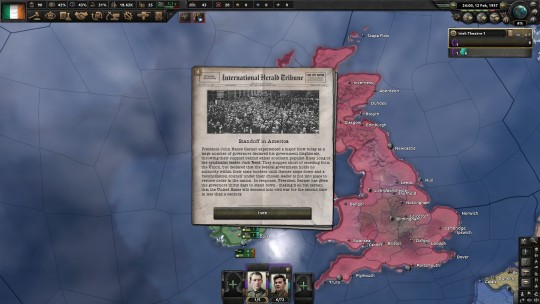
That had been enough for the Presidency. Jack Reed’s Socialist Party of America and Huey Long’s America First Party had strong regional support, but neither movement received enough votes to beat the Republican candidate Alf Landon, let alone Garner. Yet the victory was narrow, and both candidates claimed voting irregularities arranged at the polling places by supporters within the state voting commissions, along with other accusations of beatings and intimidation campaigns. Herbert Hoover endorsed Garner in a show of cross-party American solidarity, and Landon himself was a guest of honor at Garner’s inauguration. Garner had already promised the Republicans some Cabinet appointments in the hopes of building a coalition government strong enough to stop Long and Reed. It was an uphill battle; the 1936 voting season had been marred by political demonstrations turning violent, they had even called it the Red Summer, and now Long and Reed were railing against the legitimacy of the vote.
When the populists had made their accusations, the governors in their regional strongholds had backed Long and Reed. The populists, it seemed, had called President Garner’s bluff. The governors demanded a “national reconciliation council” under their talking head, and both had made it plain that the other would not be welcome on it, making it all but certain that war would come, and it would not be small. Jack Reed was popular in the Steel Belt and Huey Long had an almost religious appeal in Louisiana and in the rest of the Southern United States. Reed had much of the industrial heartland, but Long had far more pull among the military including high ranking officers. It wouldn’t be an easy fight, no matter what Texans had to say. In both ways, it was bad for the United States.
Collins had hoped it wouldn’t be war, but he was sure that it would be. If Jack Reed was able to successfully overthrow Garner, the Internationale would be emboldened. The Communards might still be reluctant to face Germany, given how large such a war would be, but Mosley would almost certainly want to snap up Ireland to carry forth syndicalist momentum. Anti-Irish rhetoric had only intensified in the months following Ireland’s meteoric 1936 rise, with Mosley claiming that Michael Collins had become “every inch the oppressive king he fought against.” Collins laughed when he was first told it, but as the days went on he seethed against the man, wishing he could have five minutes alone in a room with him. He was sure his sainted ma would not look fondly on him for beating on a man with a limp, but she’d forgive him.
When the reporters asked for a quote, Collins was sure to give them one. “Look at Mosley in the war. Gallivanting around in an aeroplane like war was just boys at camp, crashing trying to be a showboat. I suppose I must be kind, he tried to prove he was a brave man, I’m sure it’s not his fault he ran behind a desk before a year was out. That’s where he’s most comfortable, hiding and sipping his gin while he sends young boys to do the fighting and dying.”
Collins had a good laugh, but he made sure to tell his diplomatic service to make sure that Ireland would have plenty of friends on both sides of the Atlantic, just in case the Union tried anything. Laugh in public, but service your pistol in private.
---
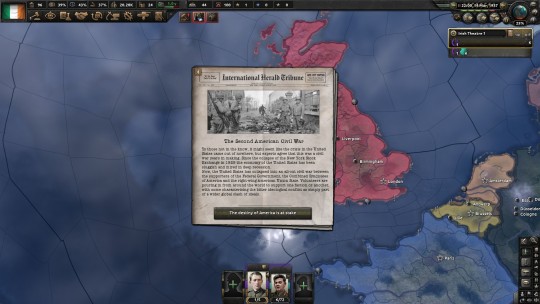
14 March 1937 - Áras an Uachtaráin, Dublin, Ireland
It was war. The entire world was aflutter with the news that the United States had descended into a civil war. President Garner’s deadline had come and went, and both Jack Reed and Huey Long had declared war on the United States. In response, Garner had appointed General George Marshall as Chief of Staff of the Army. The Internationale had already voiced its support for Jack Reed, with Chilean, Communard, and Union supporters already on their way to support the newly-formed Combined Syndicates of America. The German Empire was far more reserved in its support. German-Americans primarily lived in areas controlled by the Combined Syndicates, and the United States government had primarily conducted a pro-Entente policy during the Weltkrieg, leading the Kaiser to support Huey Long out of pure pragmatism. Canada had fallen into debate within the Houses of Parliament on who they were supporting.
Collins had no such reservations about debating who to support in the Dail. Collins had sent out a call for a volunteer division, the 1st Thunderbolts, and had placed them under the command of Daniel McKenna. The East Coast was dense with urban areas, and McKenna was just the man to fight in that difficult urban war, having fought the English in the cities before. The Thunderbolts had been training for months in preparation for the outbreak of hostilities. Most were young men, too young to have seen the Independence War, but their officers and senior NCO’s had. That would carry them, fighting in unfamiliar territory would mean they would have to adapt quickly and rely on the experience of the leaders. Other IRA volunteers, particularly those with families in the United States, had opted to go there themselves, fight in the American army, and return later.
The first target would have to be the syndicalists. With their position in the American industrial heartland, they’d have the manufacturing prowess and the civilian manpower to build and repair war materiel far faster than the mostly rural southern states. They would have to trust in their greater manpower and equipment to hold the southern front against the aggressive generals of the American Union State. The United States had begun mobilizing forces on the West Coast to get them to move east, and requisitioned several rail lines for exclusive military use, but it would be hard fought. America was going to need all the help it could get.
---
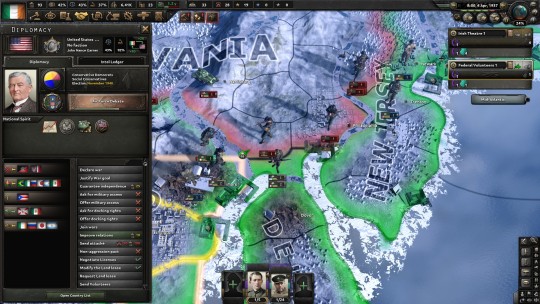
13 April 1937 - Northern Maryland, United States of America
“We have traitors to our left, and traitors to our right
Our Congress and our president have long since taken flight
No ammo, no armor, no pills, no cargo
No prayers, no chance, no hope of tomorrow
Just you and me and a hell of a lot of fight.” -Frank McHewlitt
Pennsylvania had become a battlefield for the Second American Civil War just as it had for the first. The Pennsylvania governor had declared for Jack Reed, but the Federals had made a march into central Pennsylvania, seizing York to Fulton counties, but lack of manpower, difficult terrain, and Communard volunteer tank brigades had ensured any excursion was short-lived. From New York to the Midwest was controlled by the Syndicalists. Fearing being overrun, Joseph Kennedy Sr. had asked Canada to send an occupation force to protect them from the Syndicalists. This had infuriated President Garner, but pragmatists in his Cabinet had argued that the region was indefensible since the Syndicalists held New York, and better that the Canadians occupy it, and the Combined Syndicates risk a war with the Entente, than the factories be taken over by Jack Reed. Further south, Canada had sent a force to occupy the Panama Canal after the Americans had withdrawn their garrison force. The Canadians had said their mission was to protect trade, but had banned ships flying Communard, Union, or Chilean flags.
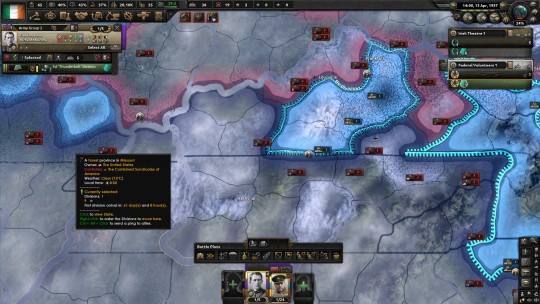
Further south, Texas to the Carolinas, and everything south, had pledged loyalty to Huey Long’s vision. Several companies had even signed on to the “Share Our Wealth” program. His men were heavily-armed and competently led, and they had already made significant inroads pushing north into Kentucky from Tennessee, even making contact with and fighting Jack Reed. George Patton had been named the overall commander of the American Union State, and on land the America First Party had shown themselves to be exceptional fighters pound-for-pound. Their goal had been to push and seize whatever territory they could, to turn the factories over to Longist control and get their war materiel production up to match the Federals and the Syndicalists. It had been remarkably successful, Patton’s armor techniques had run circles against disorganized Kentucky militia and revolutionary syndicalists alike. Already there were unconfirmed reports of mass shootings of CSA prisoners by AUS irregulars. The Federals were hard-pressed, often surrounded and potentially encircled by hostile forces in Kentucky. Only the chaos of the war and the close proximity of all three forces, kept them from being killed outright. Desertions, particularly from militia unfortunate enough to be in the encircled regions, were high.
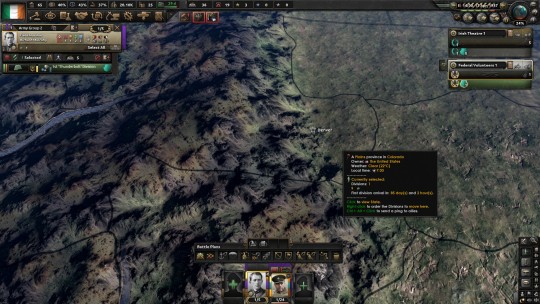
Washington was no longer the capital. With Maryland under fire and the Firsters pushing from the south into Virginia, Garner had decided to temporarily move the capital to Denver, where he could oversee the political business of state. MacArthur had elected to remain in place as the commander of the East Coast Enclave, suggesting that Dwight Eisenhower take command of the main Federal forces in the Midwest. “He’s a Kansas man, there’s no man better in command from the Midwest. The troops will fight tougher and harder if they know we haven’t abandoned them. Don’t worry, Mr. President. Those bastard traitors won’t set a foot in D.C.” With his trademark corn cob pipe and a wave to the press, MacArthur took a ride on a Vultee V-1 to take up command, with Eisenhower being named the overall commander of Army Group West, with the goal of pushing east from Kansas into Missouri.
MacArthur welcomed the service of the volunteers sailing and landing on the Chesapeake, no traitor forces had been able to ensure naval supremacy on the East Coast and none were willing to risk firing upon a flagged vessel and invite any nation’s full-blown entrance into the conflict. Lavr Kornilov, eager to project strength and stability after the assassination of President Kerensky. Hirohito had also dispatched volunteers citing the strong relationship between the United States and Japan and the need for legitimate government to be re-established in the United States to project stability in the Americas. Calles in Argentina, eager to re-establish the Monroe Doctrine to act as a bulwark against the Patagonian Worker’s Front, and always eager to fight syndicalists. Brazil likewise had ordered troops to support the United States. Mexico, eager to avoid any war spilling over their borders, had closed the borders to the American Union State and had sent divisions through the Gulf of Mexico before the Longist navy could seize control of the waters and potentially cut off trade and transit. MacArthur ensured that each division had several bilingual Americans to serve as liaisons and communications personnel. He couldn’t command the volunteers, but he did demand adherence to military law and that any abuse of US civilians or military personnel would be dealt with by firing squad. Similarly, MacArthur promised his own men that they would be punished harshly if they stole from or fought with Federal volunteers. Regular correspondence was mandatory, and passwords changed regularly to allow foreign soldiers to identify themselves quickly to friendlies, passed via radio operators who had signed up with the Federals in record numbers when President Garner forced a bill and executive order expanding the civil rights of Native Americans to shore himself up for the upcoming emergency. The Navajo Nation, who provided one of the largest units, dispatched signals operators to coordinate with the volunteer brigades, providing exceptional communications security and coordination between the Federals on both fronts.
Yet things were not going well. MacArthur had enforced military law within the East Coast enclave, and garrison forces frequently looked to seize supplies and materiel for their war effort. Oftentimes, a token effort at compensation or promise of restitution to come later was the only balm in Gilead; it did not help those who starved.
The volunteer forces moved north to the Mason-Dixon line, where the Combined Syndicate militia were threatening to move south into Maryland from their regional headquarters in Philadelphia. The Russians opted to secure themselves in Baltimore, while the Argentine and Mexican forces moved to Cecil County to secure Delmarva from the syndicalists seizing the east bank and potentially cutting off vital access to the Chesapeake. McKenna and the Irish 1st Thunderbolt, acting aggressively, crossed into Pennsylvania and secured themselves in York. Not willing to pass up a fight, Russian and Irish volunteer brigades pushed into Lancaster County, threatening Philadelphia and forcing the Communards to reinforce their position lest Philadelphia fall and the road to New York be pushed wide open.
---
17 April 1937 - Economic Committee of the Dail, Dublin, Ireland
It had been a constant flurry of activity in the new year. The Dail was debating loosening immigration restrictions to help bring in new blood to help support Ireland’s effort to modernize. Even if good policy and hard work had led Ireland out of the depression following Black Monday, manpower was still the hard limit on everything they could do. Once unemployment fell, there would be no new employees for businesses, and they’d turn away from Irish investment.
There had been two major sources of pushback against immigration reform. The Unionists in Ulster had been vocal opponents, calling the efforts part of a planned demographic shift to stock the north with people that would sideline their concerns as Unionists. Their proposal had instead suggested an increase in immigration from select countries, notably Canada, Australasia, and the British Dominion of India. Gearóid Ó Cuinneagáin was far more hostile to immigration overall, demanding no immigration save from Celtic-majority countries, particularly those who wished to depart the Union of Britain from Scotland and Wales. Some of the measures proposed had truly been radical, such as instituting a Gaelic language entrance exam to new immigrants. The hAiséirghe crowd had always been a touchy subject, they had enough support in Munster that they couldn’t be ignored as much as Collins wanted to throw the bastards into the ocean.
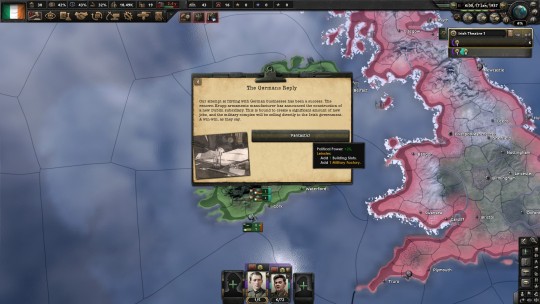
Collins had been lucky, his Dublin financial capital idea had already been receiving positive responses. The German Kaiserreich, still deep within the throes of Black Monday, had debated whether or not to permit German businesses to invest in Ireland. The protectionists in their government had argued that the last thing that they needed to do was open up subsidiary companies in Ireland and send work away from Germans. The market liberals were far more enthusiastic, suggesting that the profits made could be reinvested in Germany; an influx of cash that wouldn’t increase the money supply and devalue the Mark. In the end, Wilhelm II had agreed to the proposal. He had known that the Irish Republican Army had been looking to re-equip their forces, and Krupp could easily manufacture rifles and mortars with a sizable government contract. Krupp opened Krupp Rüstungsbetriebe Irland, redesigning the Krupp Radreifen into the shape of a shamrock.
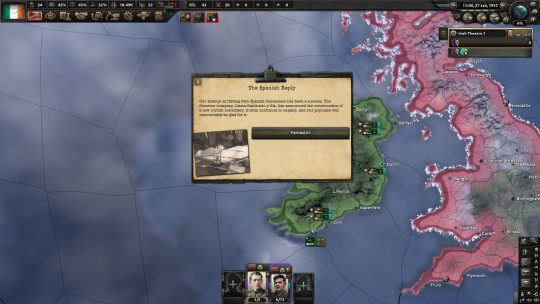
The Kingdom of Spain had also looked to establish an arms company in Ireland, eager to arm those who were also hostile to the syndicalists, and quite isolated on the European continent, with France and the German Protectorate of Morocco making an uneasy set of neighbors. Having a well-armed Irish Republic was a benefit to King Alfonso, who agreed to set up a subsidiary of Llama-Gabilondo y Cia SA, taking the name Dóiteáin-Gabilondo Incorporated, and selling their famous pistols to the Irish Republican Army. With regular army drills, and now a larger armaments industry within Ireland itself, a more significant and professional Irish Republican Army was starting to take shape.
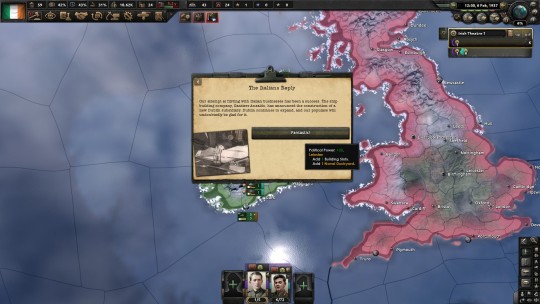
The Italian Republic, floundering in the wake of massive German and Austrian stock selloffs, were eager to find ways to bring in cash and stabilize their own economy. Seeing a pressing need, the Italian Republic opted to establish a naval manufacturing dockyard in Dublin as Gio Ansaldo Irish Sea Shipwright, Ltd, to help produce submarines for the Naval Service. Italian engineers could work in Ireland, the revenue would flow into Italy, and the Irish would receive a powerful deterrent against the Union of Britain’s navy. Working in the choppier northern waters was different from the warmer and calmer Mediterranean, but the Italians proved up to the challenge, christening the first Irish U-Boat the new Fenian Ram.
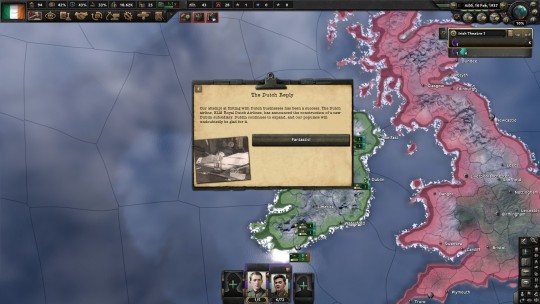
The rush of European activity to invest in Ireland had not gone unnoticed in the Netherlands. After a fierce and competitive bidding war, the Dutch government, very busy with their preparations for the upcoming elections in May, had given the go-ahead for Royal Dutch Airlines KLM to do business within Ireland. Rather than operating a strict subsidiary, as the government was still facing the worst of Black Monday, Royal Dutch instead opened a joint venture with Aer Lingus, operating a civilian airfield that would bring in much needed tax revenue, and providing expertise for the construction of a military airfield in Leinster. The Union of Britain had lodged a formal complaint against the move in the Netherlands, but the ambassador had been dismissed out of hand, the official response being “Ireland has a right to the sky, and Britain has no right to dictate policy to the Netherlands.”
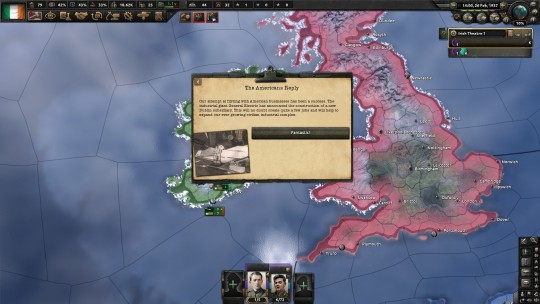
The United States had been considered highly unlikely to invest in Ireland. Even with the positive relationship that had existed between the two countries, the USA had been facing an existential crisis. To Collin’s great surprise, Garner had actually encouraged American companies to open subsidiaries in Ireland before hostilities broke out. In a diplomatic message to the Irish President, Garner had written: “I am certain there will be war. American industry will certainly not be spared. This initiative may save American lives and enrich both our countries. If the worst comes to pass, may God protect us both.” General Irish Electric, as the company titled itself, designed a logo incorporating the Irish harp in the signature “G” of the GE logo. The company received a grant from the National Industrial Investment Fund and purchased a factory abandoned during the Black Monday fallout, bringing up to speed in record time to produce civilian and industrial-grade electronics. Almost immediately, GIE had orders tasked almost to capacity for factories across Ireland to upgrade their own operations, throwing itself into the greater industrialization efforts that Michael Collins had championed the previous year.
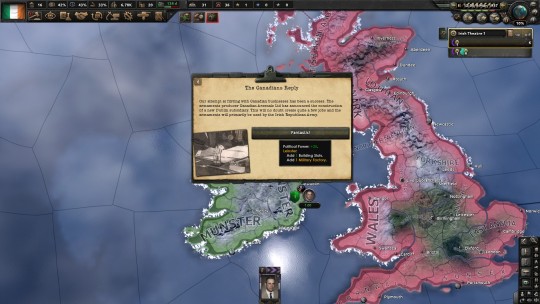
The Dominion of Canada was a much more difficult beast to wrangle. Edward VIII had made no secret that he wished to reacquire not just the British Home Isles, but the British Empire as well; he would not be a second-fiddle to the Kaiser. That would mean the Six Counties, surely, perhaps even re-establishing the Free State as a Dominion. Collins had debated even making the offer to Canada, but a good relationship with Canada was, putting Edward aside, a sound policy. Canada needed money to support their war efforts, and a friendly relationship with Ireland would mean less problems when launching their operation to take back the Home Islands. Collins privately feared that they would want to use Ireland as a staging ground. Ireland had situated itself as a prominent financial hub, and since Dublin was designated a Special Economic Zone, it could potentially be very lucrative and offer a way to sell to the rest of Mitteleuropa without dealing with the Kaiser. The Canadian government had assented to Canadian Arsenals, a crown corporation to open a subsidiary in Dublin named North Atlantic Arms. Collins made sure that it acted in all things as a private company, insisting that King Edward appoint an executive staff the same as any other business. That had been a headache in the Dail, with Eamon de Valera angrily demanding not to sell Irish land to King Edward. Collins had countered that Ireland was a free and independent republic, and that the King had to obey Irish law rather than dictating laws to Ireland.When rumors came around that Jim Larkin had supported Dev’s objections, the Fianna Fail politician withdrew his opposition in favor of a more moderate compromise, asking only that the Dail be presented the terms of the contract in open session so that they could vote on them. Dev’s desire not to give Larkin more ammunition had rapidly diminished opposition to the measure within Fianna Fail, and Sinn Fein offered only a token dissent, permitting the venture to go forward.
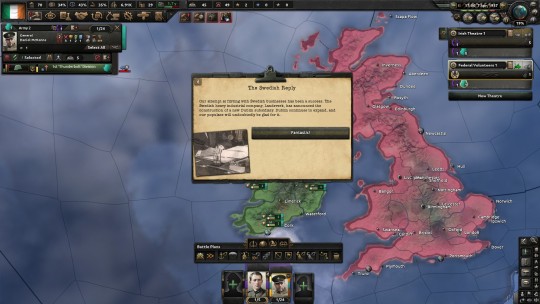
With the outbreak of war in the United States and Ireland’s rapid industrialization, Sweden had sensed an opportunity to open a subsidiary business in Ireland as well. AB Landsverk had originally sought to open a tank manufacturing plant, since the Irish tanks were largely outdated and the Irish Republican Army was going to need to modernize its arsenal. Fierce protest erupted from the social democrats within Sweden’s Parliament, opposing the idea of arming Ireland and facilitating a possible war between Ireland and the Union. The hawks within Sweden had supported the venture, but military arms, even support equipment, could not secure a large enough coalition for the Economic, Defense, and Foreign Ministers to agree to the venture. Not wanting to lose out on the potentially lucrative deal and already facing their own problems with syndicalist unrest, Sweden’s market liberals had offered a compromise within the Riksdag, allowing Landsverk to open Landsverk Inneal, specializing in tractors and harvesting equipment to support the modernization of the Irish agricultural sector. Several prominent military analysts noted that the new Inneal tractors, with a few modifications, looked suspiciously similar to a light tank with the turret removed, but these were dismissed as products of an overactive imagination by both Swedish and Irish military analysts.
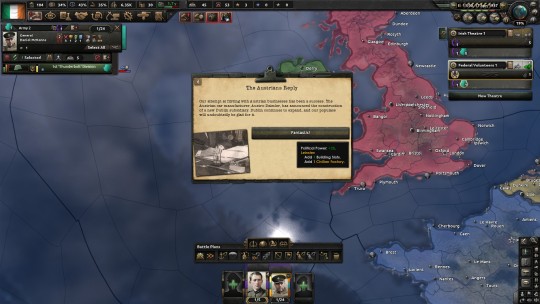
The Austrian Empire was in a difficult position in 1937. Emperor Karl I had been making significant plans for his Ausgleich Federation plans, and saw the Irish initiative not simply as a means to support his economy, but as a means to demonstrate both Austrian power and his willingness and initiative to support cooperation efforts for mutual gain. The Emperor had made his commitment to pluralism plain within his proposed federative model, he had hoped that participating in Collin’s economic initiative would help sway skeptics and naysayers to his side to give him greater support against Hungary. If it could help his economy and put neutral voters who cared more about their own personal livelihood than the greater plans of Austria-Hungary, that was fine as well. Daimler founded Irish-Daimler and focused on developing automobiles and lorries. While the Emperor could not be there in person, he had prepared a statement for the opening of the plant in Dublin. “Irish-Daimler is in the business of Irish business. Her success is our success, and our success is her success. May we both prosper in the days ahead.”
Eight nations had opted to do business with Ireland in such a short period of time, and there had already been murmurs for other nations to do likewise. The success of Irish Black Monday reforms had been the talk of the European financial sector. Even distant Japan had expressed an interest in perhaps opening a branch of one of their zaibatsus in Ireland to sell to Western markets, though such a discussion was in the planning stages. When interviewed by The Financial Times, Lemass had made the quote that had made the headlines. “Ireland is the Emerald Isle. She always sparkled in our hearts, now everyone can see it.”
When Michael Collins had heard that, he smiled. The man had the head of a businessman but the heart of a poet. The head and the heart needed to complement each other if he wanted to see Ireland through.
---
8 May 1937 - Áras an Uachtaráin, Dublin, Ireland
As the war passed into its third month, Collins started to wonder about the upcoming elections in the fall. America had been on his mind a lot lately. An emergency act by the Oirechtas called the Díodean initiative had allowed Americans seeking refuge to come to Ireland, and plenty had taken Collins up on his offer. Many immigrants came with much of their wealth with them, which had provided an influx of capital. Even more valuable, however, was the technical knowledge. Many of the immigrants had been factory managers or entrepreneurs, and they had knowledge which made them highly valuable in the industrial sector. Not every tale was so fortunate, however. Some culture shock was perhaps inevitable, but it had been incredibly slow going. Collins had remembered the first time he saw a new settler to Ireland drive on the wrong side of the road and cause a car accident. This felt like seeing that unfold in slow motion on a national scale. The poor Americans had felt the Irish were cheating them out of wages and exploiting their desperate circumstances, while the wealthy felt their standard of living drop precipitously.
The hAiséirghe crowd again troubled him. Reports of nativist gang uprisings in the poorer parts of cities and rural areas were on the rise. There were demonstrations that the new arrivals were stealing all of the good-paying jobs; this had been going on since the new immigration reform but now was reaching a fever pitch. The Unionists again rallied against Collins, accusing him of colonizing the north with people opposed to King Edward under the guise of humanitarian aid to defeat the Ulster Unionists at the ballot box. They demanded a series of refugee and work permits that did not confer voting rights as opposed to outright immigration and naturalization. That had caused a firestorm on the debate floor, causing no shortage of headaches for Collins.
To alleviate the shortages, Collins had organized refugee brigades in the Republican Army, where young men could earn a wage and provide a livelihood for their families. The Yanks were excellent shots, and Collins had hoped that seeing immigrants wearing a uniform would cause the locals’ respect for the military to undermine nativist tendencies. It was a mild success at best, mostly in Leinster where there had already been fewer problems overall. Collins had weighed outright banning the Ailtirí na hAiséirghe, but that would just send them underground like the Labour Party had. He had to settle for punishing assaults when they were reported, and increasing Gardaí patrols to keep the peace.
In the leadup to the elections, Collins had seen cracks start to form in his ironclad voting bloc. While syndicalism had little popularity in Ireland itself, Sinn Fein had seen an upsurge in popularity with Black Monday despite Collins’s efforts. The Irish Christian Front and the Ailtirí na hAiséirghe had campaigned against him thanks to his immigration policies. Fianna Fail had campaigned on greater liberalization, and the National Centre Party had wanted to re-orient foreign policy to a more pro-Entente position. Sinn Fein and Fianna Fail had opted to engage in tactical voting, with candidates withdrawing from ballot races in order not to split the vote. Jim Larkin had endorsed the move, promising to work with Sinn Fein to provide greater relief to the Irish working class. The Irish Christian Front opted to boycott the elections and both they and the Ailtirí na hAiséirghe accused Collins of bringing in foreign refugees to ensure he had the votes needed to win.
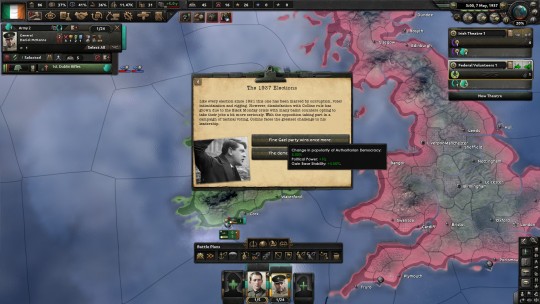
At a closed door meeting, Collins was asked a simple question. “Sir, what should we do about the election?”
Collins, his hands shaking, had only one response. “Whatever it takes.”
---
15 July 1937 - West Virginia, United States of America
“We’re in the right thick of it now, ain’t we?” Daniel McKenna shouted over the din of battle.
The East Coast Enclave had stabilized its borders after the early initial push, but still faced the difficulties of being surrounded by the enemy. Food and water shortages, irregular supply shipments, and losses from attrition were starting to take their toll on the beleaguered Federals. The Appalachian mountains had stymied Syndicalists pushing in from Ohio and Illinois, and the hilly and forested terrain had helped somewhat slow the push by Long’s forces, but only barely. Eisenhower had more success on the west, where the greater manpower has really started to pressure the American Union State on their Texas front.
The Federals still controlled the air though. That had made securing their defenses much easier. Flying over the Great Plains was effectively a death sentence, and few had the nerve to establish air cover on the east coast. That was a small comfort to Dan McKenna, who had gone to the Applachians in response to a new Syndie push. The Federals had retaken Charleston in June, but their position was tenuous there, and with new militia units being sent into battle, someone had needed to defend this key western outpost.
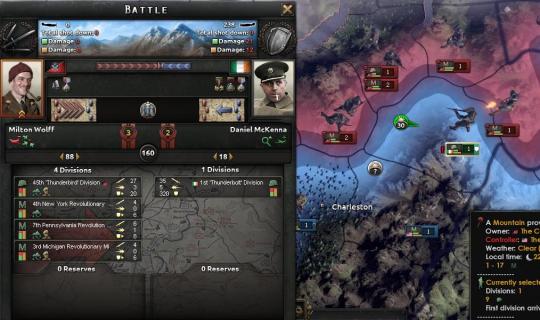
American militia units had stayed to defend the city, but McKenna had looked to secure the hills to the northeast. The Applachian plateau looked to give a good vantage point for artillery if any could succeed in the arduous task of towing them up to that position. Loyalist civilians had offered to do it on their own, pulling the units with their own work trucks, but that would be a dangerous undertaking without escort. McKenna took his Thunderbolts, with their own artillery pieces, to secure the hills first, while the militia guns could follow second when the way had been cleared. The Syndicates, tipped off by sympathetic informants, launched a massive push with their own 45th Thunderbirds, supplemented by local revolutionary forces, to prevent bombardment. The battle plan called for an overwhelming attack to break the dug-in mountain entrenchments, attacking from multiple directions in an attempt to dislodge the stubborn Irish defenders and find a weak spot.
McKenna demanded that the forces hold, using high-explosive burst shells over the heads of the enemy to maximize effect on the enemy. The engineers had dug in extensively, and had used dynamite to blast further fortifications and built entrenchments. The Thunderbolts only had a few guns, which were primarily pointed toward the northwest against the more highly-trained Thunderbirds. At such high elevation, and with such difficult terrain, evacuating casualties was difficult on the mountain, and men sometimes collapsed where they stood due to a combination of fatigue and high elevation.
That had been days ago, and the Thunderbolts were in tatters. The less wounded had even taken up shifts at night, or taking over service positions so able-bodied men could shoot and spot for the artillery. They had been holding, but just barely so. If it hadn’t been a mountain, they would have already been overrun. “I’ll be damned if I die on some cold rock half the world away from home.” McKenna defiantly continued to stand, hoping to wear down the superior numbers with artillery shells. He was the Wall of West Virginia, and he wouldn’t let the bastards through.
---
10 September 1937 - Pittsburgh, Pennsylvania
It had been months of hard fighting. Charleston had remained in Federal hands, and the front had stabilized, but all hopes of recovering the Federals in Kentucky were lost. The loyalists could only hope that the army groups had disbanded to make their way back to Federal territory in smaller numbers rather than being shot en masse, or worse, deserting to fall in with the enemy for their own salvation.
MacArthur had relied on the volunteers to fight a great deal of battles, more than he had preferred. The states under his control were tapped out for manpower resources, and if he started poaching from the factory floors for more able bodies he’d run out of supplies. Supply was irregular, especially for fuel, which he needed to keep the planes in the sky and the troops moving across the front. Olds and Tunner were able to airlift a lot of supplies, but demand always outstripped supply, and the more supplies he lifted the more danger there was for explosions in the cargo holds.
Ultimately, MacArthur decided that he needed to attack, to keep the pressure on the east so that the Syndicalists did not pull more men to prevent Eisenhower from marching toward Chicago from Kansas and the Dakotas. The Syndicates had been attacking south against the American Union State and fortifying out of New York City, and MacArthur had theorized that they would be weak in between those two strongpoints. The Brazilian and Argentine volunteers offered to push toward Philadelphia, with the hopes of breaking the regional command post and sending Syndicalist forces into disarray, while the Irish opted to push into Pittsburgh to seize the valuable steel mills and threaten a push into Ohio. The Mexican volunteers opted to remain in Virginia to help guard the line against the Longists; they had feared if the American Union State won, there may have been calls to expand further south to seize valuable oil and mining territories; fears of the Golden Circle expansion as it was dubbed in Mexico had been a hot button issue for the Mexican volunteers. If the Irish could secure Pittsburgh, that would give them control of the railroad junctions and the rivers, and allow MacArthur to bring in militia units to bring the territory under control with little fighting. With that, they could push further north toward Erie, splitting the Syndicalists and isolating them in New York. With Canada closing the border to the Combined Syndicates, even to the point of having the Royal Canadian Mounted Police arrest suspected border crossers and turning them over to the Federal government in Denver, that would render a similar fate to the lost Federals in Kentucky. MacArthur just hoped that his south could hold against the Firsters. Trading Virginia for Pennsylvania was not a winning proposition.
The B&O Line had been cut early, forcing McKenna and the Thunderbolts to march for most of the trip. Even in September, Pennsylvania was still hot, to help with water and the unfamiliar terrain McKenna had largely followed the Mononghaela river. To the east, he had Federal troops supplemented by Maryland militia moving north to take Harrisburg. McKenna force-marched his troops into Syndicate territory, hoping to secure a clear pathway along the rail lines for American repair crews to fix the B&O.
McKenna had been fortunate, western Pennsylvania had been defended by irregular militia units, poorly armed and lacking artillery support. In many cases, McKenna found that they didn’t have enough rifles for every man and only a few machine guns, some had taken to using shotguns better suited for partridge than men. When he was lucky, a few barrages from the field guns was enough to send them packing, but even without that, a dedicated attack usually was able to force back the disorganized units. A pity he didn’t have tanks, even a couple of old Weltkrieg landships would simply be able to drive to Pittsburgh unimpeded as long as it was gassed up.
The locals were fiercely divided. A few times McKenna had gone near towns, he had been welcomed and told where the Syndicates had kept their ammunition depot. Most of the time, however, the homes were ransacked, the supplies taken. Horror stories came to McKenna about “war syndicalism,” Reed’s name for the efforts taken to ensure his fighting men had the food they needed to fight. Sometimes it was the Combined Syndicates directly, but more often it seemed to be neighbors seizing on old grudges, summarily beating those they suspected of disloyalty and stealing their possessions, donating them to Reed as an act of solidarity. Worse still was what happened to those suspected of disloyalty. The Combined Syndicates offered a bounty on saboteurs and informants, and that had led to hastily-convened People’s Courts, serviced by hanging judges. Even so, there were plenty of people loyal to the Combined Syndicates, shouting their approval at finally destroying the brutal oppressors of Wall Street and their puppets in the Federal government. For a moment, McKenna thought of Ulster, and remembered everything he had heard 15 years before, and then he remembered the refugees from the British Isles after their revolution.
Pittsburgh had been hastily-fortified, with burned out hulks of cars blocking the bridges into town, forcing McKenna to navigate the crude fortifications with great care. The civilian population had largely huddled in buildings with boarded-up windows. The large buildings had been long ago hit by artillery fire or bombings from aircraft. Rail tunnels had been places of safety, McKenna’s scouts had found a few brave souls trading for various materials on picnic blankets. The mayor, who had thrown in his lot with the Syndicalists, had fled the city with the rest of the CSA, and they had thrown those city councilmen loyal to the Federal government into the Ohio. Coordination was largely infrequent, done by amateur radio. The civilians largely wanted to be left alone, out of the civil war, but the war had come to them despite their best wishes.
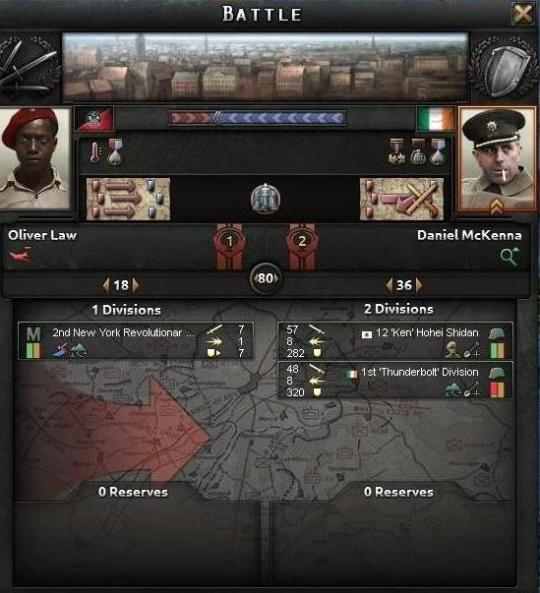
McKenna set to work, ordering his engineering corps to get the guns into firing positions. He positioned men near the Alleghany to prevent any CSA attack using the river to bypass his fortifications, and fortified the major exits with sandbags and machine guns. He had barely gone through half of his fortifications when he had heard the bad news: The Syndies were on the march along the Alleghany, and they would attack the city soon.
Yet, McKenna was not alone. The 12th Hohei Shidan, volunteer forces from far-off Japan, had come to support the Irish forces, and they had brought with them their Type 90’s, doubling McKenna’s supply of artillery. The Japanese and Irish soldiers met on the south side, and drew up plans for an attack. McKenna was given overall command, and elected to put his Irish veterans in the more dangerous forward position while the Japanese would fire on the CSA to draw them in under a battery of withering artillery fire. Once the enemy had descended past Lower Lincoln and could no longer enjoy visibility from Upper Lincoln, the Irish would ambush them in close quarters.
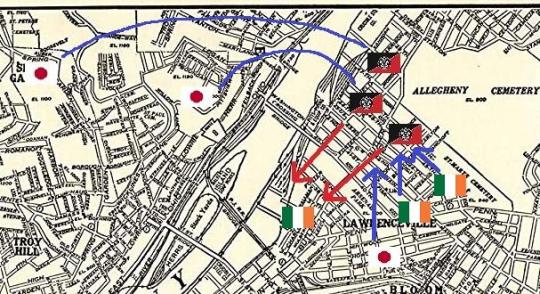
The CSA announced their attack with a radio command ordering all civilians to remain indoors, and all “foreign invaders” to surrender to the 2nd New York Revolutionary Guard, for handling by the legitimate United States government for repatriation. The 12th Hohei Shidan responded with a cannon barrage, thus commencing the Battle of Pittsburgh at 0900 on 10 September. McKenna’s Thunderbolts fought in ambush-and-retreat tactics, dividing themselves into seven-man fireteams. McKenna would fire on advancing CSA forces, retreat into a building, then have a second fireteam flank the New York Revolutionaries from across the street. Casualties were high on both sides, especially among the Irish who often refused to fight until in incredibly close combat, hoping the shock of the ambush would carry the day. Friendly fire incidents were high, especially as the day went into night, both from accidental fire on friendly troops and sympathetic civilians accidentally firing on who they believed were enemy soldiers. Yet the day stood. On 14 September, his squads battered and American troops pushing through central Pennsylvania, Oliver Law reluctantly ordered a retreat to the northeast. Western Pennsylvania stood liberated, but the war was not over yet.
---
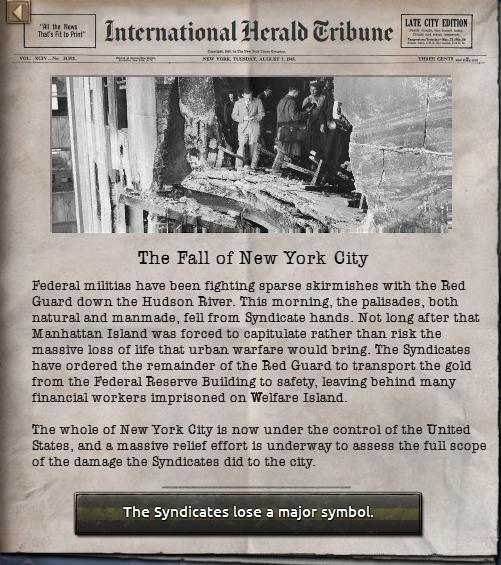
20 December 1937 - Welfare Island, New York City, United States of America
The icy winds of winter were howling, but the pit in Daniel McKenna’s stomach wasn’t from the cold. He had hoped to warm himself with a cigarette as he surveyed the successful conquest of New York City, but that had all left him. Naught but a short time ago, the celebration had been high. The Syndies had lost both a major symbol and, perhaps more pragmatically, their eastern command center. The Dominion of Canada had officially supported the Federal Government, and there had been Canadian, Indian, and French Republican volunteers sailing to Maryland to join MacArthur and the Volunteer Brigades, along with massive shipments of weapons from the Entente. Manhattan had surrendered rather than risk a massive urban brawl amongst the skyscrapers. That too, had seemed like a cause for celebration, but there was little sense of Christmas cheer among those who were picking through the ruins of New York City, for they had finally come to Welfare Island.
Inside, McKenna had found cell after cell of prisoners, skin stretched and hair falling out from starvation and malnutrition, their bodies broken from months of hard labor. When New York had fallen to the Syndicalists, they had imprisoned anyone who had worked in the financial sector, any who rented an apartment to another, or any who they considered to be bourgeoise, and demanded that they atone for the crimes of their previous lives with new, honest labor for the Syndicalist cause. They had been forced into the most dangerous jobs of the arms industry, like manufacturing artillery shells to the point where their skin had turned to a greasy yellow. Bleeding gums and fingers, limbs lost in machinery or explosive accidents were routine, each prisoner was a laundry list of atrocities written out upon their bodies.
Each horror that McKenna heard made him feel numb. He had nearly torn his gloves in two after listening, but he had made sure that he had heard it all, and that his staff heard it as well. A patriotic young woman, formerly a social columnist for the New York Tribune who had signed on to help with the support staff, volunteered to transcribe every word. “Be damned, lass, you’re a damn sight braver than any fella. Write it down, every bloody word, and know that ye’ve got a ironclad heart three times larger than any bastard who tells ye different.”
McKenna had dispatched three messages from New York. The first was to General MacArthur, who had said: “Am pleased to deliver to you New York as an early Christmas present.” The second was to Michael Collins, relaying a request for more reinforcement of men and materiel. The third, a private correspondence, bemoaned what he had seen. “The brutality of what I’ve seen is beyond words, and the only thing that breaks me more is the thought that this is not some singularly unique moment of malice, that we’ll find another Welfare Island in the South run by those America First bastards. God help me, is this what we left the English to in ‘25? Did we look at an Englishman for all those years and see the English and not the man?”
“Private. Bring all the Syndie prisoners we’ve got, make them see what went on here, make ‘em stare at each one. If they look away, hit ‘em. Then find the officers, and see which ones knew about it. And if ye find one that did...hang ‘em from the Brooklyn Bridge.”
---
Alright, that’s the second chapter, with the Syndicates on the ropes and the Firsters being slowly ground down in the western theater. The third chapter will handle the defeat of the Syndicalists and the Firsters and Mosley’s opening shots for his invasion of Ireland. Let me know what you think. And yes, I know some of the pictures are from 0.12, I’ve already mentioned that in my first post on the topic, and I know the battle map is crude; I suck at art. Also, what do you think about cropping the screenshots to make them easier to read? I think it looks fine, not too pixelated or zoomed in, but it does lose the sort of authentic “AAR screenshot” feeling. Which do you prefer, readers?
Images
Cactus Jack Becomes President
Standoff in America
Second American Civil War Begins
Battle of Baltimore
Encircled Federal Troops in Kentucky
US Moves the Capital to Denver
Germany Approves the Irish Business Initiative
Spain Approves the Irish Business Initiative
Italy Approves the Irish Business Initiative
The Netherlands Approves the Irish Business Initiative
The United States Approves the Irish Business Initiative
Canada Approves the Irish Business Initiative
Sweden Approves the Irish Business Initiative
Austria Approves the Irish Business Initiative
Rigged 1937 Election
The Wall of West Virigina
The Battle of Pittsburgh
Pittsburgh Battle Map
The Fall of New York
-SLAL
22 notes
·
View notes
Text
Wiki Garden Gnome
Wiki Garden Gnome Article <3 Thanks Wiki
Garden gnome
Garden gnomes (German: Gartenzwerge, lit. 'garden dwarfs') are lawn ornament figurines of small humanoid creatures known as gnomes. Traditionally, the figurines depict male dwarfs wearing red pointy hats. Typically, gnomes stand between one and two feet (30 and 60 cm). A recent[when?] trend has introduced miniature gnomes of only a few inches in height. Originating as a decoration for the wealthy in Europe, garden gnomes are now prevalent in gardens and lawns throughout the western world, among all social classes, and often regarded as kitsch.

Gnomes
History
In ancient Rome, small stone statues depicting the Greco-Roman fertility god Priapus, also the protector of floors, were frequently placed in Roman gardens. Gnomes as magical creatures were first described during the Renaissance period by Swiss alchemist Paracelsus as "diminutive figures two spans in height who did not like to mix with humans". During this period, stone "grotesques", which were typically garishly painted, 1-metre-tall (3.3 ft) figurines, were commonly placed in the gardens of the wealthy. Among the figures depicted were gobbi (Italian for hunchbacks). In particular, Jacques Callot produced 21 versions of gobbi, which he engraved and printed in 1616.
Pre-twentieth century
By the late 1700s, gnome-like statues made of wood or porcelain called "gnomes" became popular household decorations. The area surrounding town of Brienz in Switzerland was known for their production of wooden house dwarfs. In Germany, these garden figurines became conflated with their traditional stories and superstitions about the "little folk" or dwarfs that they believed helped around the mines and on the farm. The Dresden company Baehr and Maresch had small ceramic statues of dwarfs or "little folk" in stock as early as 1841, and although the claim has been contested, some credit Baehr and Maresch with the first garden dwarfs (German: Gartenzwerge)
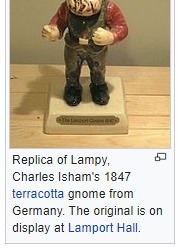
Within less than 10 years, statues of dwarfs had spread from the provinces of Saxony and Thuringia across Germany to France and, in 1847, Sir Charles Isham, brought 21 terracotta gnomes manufactured in Germany by Philip Griebel back to Britain where they were called "gnomes" in English and placed in the gardens of Isham's home, Lamport Hall in Northamptonshire. Nicknamed "Lampy", the only gnome of the original batch to survive is on display at Lamport Hall and insured for GB£1 million.
The manufacture of gnomes spread across Germany, with numerous other large and small manufacturers coming in and out of the business, each having its own particular style of design. From around 1860 onwards, many statues were made in Gräfenroda, a town in Thuringia known for its ceramics.
Garden gnomes spread to other countries in Europe in the 1840s and became particularly popular in France and Britain The term "garden gnome" may originate from the term "Gnomen-Figuren" (miniature figurines), used in the original German catalogues.
Twentieth century
Garden gnomes were further popularized when Sir Frank Crisp, the owner of the second largest collection of garden gnomes in the UK opened his Friar Park, Henley-on-Thames estate to the public at least once a week from 1910-1919. It was here where garden enthusiasts and visitors from around the world perhaps saw garden gnomes for the first time.
The reputation of German gnomes declined after World War I, but they became popular again in the 1930s following Disney's animated film Snow White and the Seven Dwarfs, when more working-class people were able to purchase them. Tom Major-Ball (father of former British prime minister John Major) was the most notable producer at that time with his company Major's Garden Ornaments.World War II and the years following were also hard on the industry, and most producers gave it up then.
Garden gnomes saw a resurgence in popularity again in the 1970s with the creation of more humorous types of gnomes. In the 1990s travelling gnome and garden gnome pranks became popular and made national news at times, where people steal a garden gnome from an unknowing person's lawn and then send the owner photos of the gnome as a practical joke before returning it.
Twenty-first century
Philip Griebel's descendants are still producing garden gnomes in Germany. As of 2008, there were an estimated 25 million garden gnomes in Germany.
Types of garden gnomes
Garden gnomes are typically male, often bearded, usually wear red phrygian caps and often have pipes. They are often shown pursuing leisurely pastimes such as fishing or napping.
Gnomes may be made from terracotta clay slip (runny clay) poured into molds. This is allowed to set up and the excess emptied from the centre, leaving a clay shell. The gnome is removed from the mold when firm, allowed to dry and then fired in a kiln until hard. Once cooled, the gnome is painted. More modern gnomes are made from resins and similar materials.
Today, many different variations of garden gnomes exist, including humorous ones ranging from the lighthearted biker or barbecuing gnome, to the more dark, such as one stabbed in the back or wearing an executioner's hood.
In popular culture and politics
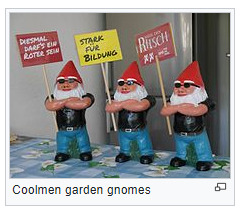
Gnomes have become controversial in serious gardening circles in the UK, and were for a time banned from the prestigious Chelsea Flower Show, as the organisers claimed that they detract from the garden designs.Gnome enthusiasts accused the organisers of snobbery, as garden gnomes are popular in the gardens of working class and suburban households. The ban was lifted during 2013 to mark the show's centenary.
In the Italian movie The Monster (1994), the main character Loris, played by Roberto Benigni, is rightfully accused of stealing the garden gnome Bashful.
A subplot in the 2001 French movie Amélie revolves around a "travelling" garden gnome.
A two-foot-tall (60 cm) garden gnome with a long, white beard, red conical hat and blue coat is the central figure in Travelocity's Roaming Gnome advertising campaign which was launched in January 2004.
Gnomeo and Juliet is a 2011 British-American CGI film that is inspired by the tragedy of Romeo and Juliet featuring garden gnomes as the characters. In 2018, its sequel, Sherlock Gnomes, was released.
The Social Democratic Party of Austria (SPÖ) used garden gnomes, which they called "Coolmen", in their campaign for the 2014 regional elections in Vorarlberg. It was intended as an ironic pun since the SPÖ historically performed poorly in elections in this part of Austria and considered itself to be a political "dwarf". The campaign placed 20,000 Coolmen holding small posters with short slogans along highly frequented roads. The party made a police report after 400 of them went missing, drawing attention from the international media.
The 2010 video game Fable III includes a side mission where a collection of garden gnomes are given magical properties, which the player character must collect throughout the world.
Garden gnomes feature as the driving motivator of Old Man Henderson, whose exploits derailed a Call of Cthulhu variant tabletop roleplaying game, described on the website 1d4chan in 2010. The character Henderson's sole motivation was to "rescue" roughly $40,000 worth of garden gnomes from a local cult, not realizing that he'd given them to charity before the game's starting session.
A 2005 episode of King of the Hill titled "Yard, She Blows!" revolves around Bobby breaking Peggy's newly acquired, and very rare, garden gnome. Hank, hating the gnome, attempts to use the event to eliminate it from the front lawn.
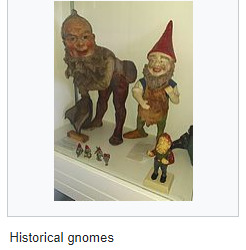

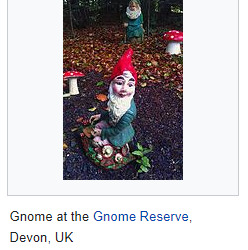
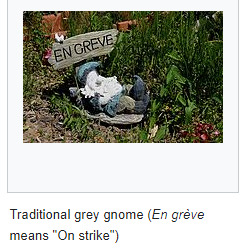
https://en.wikipedia.org/wiki/Garden_gnome
Thanks again Wiki! <3
3 notes
·
View notes
Text
The Nuptial Necessity - Chapter 20
A 12xRose Human AU
Despite an unglamorous job description, Rose loves the work she does with The Thistle Foundation, a charity founded by her best friend’s great-uncle. It doesn’t hurt that her boss, her friend’s father, is easy on the eyes. With a great job, wonderful friends and a loving family, life couldn’t be better – except for having someone to share it with.
All of that is threatened, though, when the great-uncle dies – and sets a strange condition for his nephew to inherit, jeopardizing the Foundation and Rose’s future, sparking a chain of events that might just get her everything she dreamed of and more.
Chapters will be posted on Saturdays and Tuesdays. Many thanks to my beta, @stupidsatsuma
Rated: Explicit, for eventual smut
@doctorroseprompts
AO3 | Masterlist
—
Sunday, cont’d
They entered the house hand in hand, and Rose was grateful for his silent support and the way he took the lead, allowing her to observe for a moment before diving in.
Two men stood waiting just inside the door, bowing the moment they entered. “Lord Gallifrey, Lady Gallifrey,” the closer of the two spoke first, smiling nervously. “Welcome home.” He was an odd-looking man, surprisingly short and nearly as wide, bald, but with a kind air about him. “How was your trip up?”
“Well, Nardole, thank you,” Malcolm answered easily. “Rose, this is Nardole- he’s the butler.”
“It’s lovely to meet you,” Rose offered. “Hello.”
“My lady.” With another slight bow, he turned back to Malcolm. “Shall I see to your things, my lord?”
“Yes, Nardole, thank you.”
He scurried off out the door, and it hadn’t fully shut behind him before she could hear him instructing Ross to unload the car in a firm and authoritative voice she wouldn’t have guessed him capable of. Trying not to smile for fear of seeming rude, she turned to the second man, breath catching. Blimey, he’s gorgeous. He was almost the direct opposite of Nardole; at least six foot, he looked fit and trim, even in somewhat-dorky looking laborer clothing.
“Lord Gallifrey,” he said formally, bowing slightly before turning to face Rose. His eyes widened and a smile grew, and when he said “Lady Gallifrey” it was in a far more flirty tone.
“Hello.” Tamping down a blush, she tried to remain detached, as if she couldn’t get lost in his clear blue eyes, or her fingers weren’t itching to run through his dark locks. “How do you do?”
“Stop that,” Malcolm barked, and she looked at him startled only to find he was staring at the other man with an exasperated expression.
“I’m just saying ‘hello’!” the man protested, stance easing, and she realized that this must be Jack, Malcolm’s American cousin and presumptive heir. He’d explained on the way up that the Estate could only go to male heirs, and when Jack was twenty and causing a ruckus at home, was sent back to the ancestral estate to get his head on right, and stayed. Malcolm had called him a ‘bit of a flirt’ – based on first glances, that seemed to be an understatement. “It’s not illegal!”
Malcolm sighed, a tad overdramatically, and rolled his eyes at Rose. “My cousin, Jack,” he said unnecessarily. “Don’t be fooled by his pretty words- he’s not the long-term relationship type. Meaning twenty-four hours or longer.”
Jack scoffed. “One- not true. My shortest relationship was the amazing long weekend I spent in Rio in college with my roommate and his girlfriend. Two- I am in a relationship, thank you very much.”
“I know- you think just because I’m in London I’m out of the loop? Please.” Malcolm turned to Rose, explaining, “He and our chef, Ianto, have been together for several years now.”
“And to think, you made so many snarky comments about me boinking the staff,” Jack snickered. “Only time will tell indeed.”
Malcolm’s ears turned red, and he coughed. “Anyway, Jack will be taking us through the grounds tomorrow, catching me up and giving you a tour at the same time. For now, though, he has things to see to.”
“Actually-”
A narrowed-eye stare from Malcolm silenced Jack, and with a wink and wave, he slipped around them and disappeared out the back door.
“Now,” Malcolm said, once they were alone, “how about a brief tour while they bring our things in?”
“Sounds brilliant.”
-
Despite being a rather brief overview, Rose’s head was spinning with information by the time they climbed the main staircase up to the second floor. It was an eclectic mix of old and new, much in the same way the townhouse was; it felt new and strange but like home all at once.
“So, up here are the family rooms,” Malcolm continued, “they’ll be much more modern and familiar. In the eighties Wallace had toyed with opening the house up to the public, or maybe turning it into a bed and breakfast to generate income, and he had some work done to that effect, mainly modernizing the bedrooms, but in the end changed his mind and kept it private. A lot of that had to do with the distillery opening and- well, to be perfectly frank, there’s nothing interesting here. No real draw. Homes like these are a dime a dozen, ones with much more historical interest. We do open the gardens in the winter and spring, though, for a few quid- they decorate for Christmas and Hogmanay, leaving the lights up through Burns Night, then open again when the flowers bloom. It’s beautiful.”
“I bet,” Rose murmured when he paused for breath. “So far, I’m impressed.”
He grinned. “Good.” Dramatically swinging open a door, he said, “And these are the rooms of the lady of the house.”
Rose poked her head in, eyes widening. “It’s gorgeous!” The room was of a reasonable size, but it faced the gardens; even from the door, she could see out the windows to the bright flowers and trees. A four-poster bed sat along the wall backing to the hallway, and she could just imagine waking up and being able to look outside as soon as she opened her eyes – if she were a morning person. More like I’d groan and pull another pillow over my head. She didn’t notice her suitcase, and wasn’t sure if it was already emptied and put away, or if her things were in Malcolm’s room(s?) – he did say ‘lady of the house’.
“Er, anyway,” Malcolm said, as if slightly surprised, “my rooms are next door.” Closing the door behind him he led the way the few meters down the hall, Rose trailing behind him, frowning.
Was he expecting my stuff to be there? Then, a disappointing thought- Was last night a one-time thing? Does he not want to share a room? Then, even worse- He better fucking not think he’s gonna come into my room and ‘wham bam thank you ma’am’ and go back to his own. Or that I’ll do that. I’m not a bloody booty call.
“Here we are,” he opened the next door, “and good, our things are here. I think we’ve got about twenty minutes until lunch will be served, so we can freshen up. What do you think?”
Rose followed him into the room; it was similar to ‘hers’, with more of a masculine feel to it, but it still overlooked the gardens. The bed did look inviting, like something out of a historical romance, and she certainly wouldn’t mind getting friendly in it. “Very nice,” she said, when she realized he was waiting for her approval. “I like it.”
Coming around the end of the bed she found his backpack and her carrybag perched on the settee there, and following a hunch, she opened the large armoire to find her clothes already neatly hung up and sharing the space with Malcolm’s. Like a real couple. The thought made her heart flutter, and she turned back to find he was gone.
“Malcolm?”
“Loo,” he called back. “One minute.”
When he exited he joined her at the window, looking out. In the distance, she could see a few people strolling the garden paths. “So, they put your things in here,” he said somewhat awkwardly. “If you’re not comfortable with that, we can have them moved next door.”
“Is there a reason I should be uncomfortable?” She didn’t look at him, but tensed in anticipation of his answer.
A hand gently settled on her shoulder, as if uncertain the touch was welcome. “No, but… I don’t want you to think… After last night…” They were interrupted by a knock, and he sighed in frustration, hand dropping. “Yes?”
“Lunch will be served at your pleasure, my lord,” a female voice called.
“Thank you, we’ll be down shortly.”
Rose turned, but he caught her arm, letting her go almost immediately.
“I don’t have any expectations,” he said quietly. “Just because we- I don’t expect- That’s not- I won’t lie and say I don’t want to, but more than that, I don’t want you to feel any pressure to do anything. I don’t expect sex just because we might sleep in the same bed. I want you to feel happy, and comfortable, and safe here. No expectations. Okay?”
“Okay,” she nodded, before catching her tongue between her teeth. “But you’re also saying that if I jump you, you’re down for it.”
A smile stretched across his face. “Abso-fucking-lutely.”
“Good to know.” Grinning, she turned towards the door. “Now, didn’t you say something about chips?”
-
As promised lunch was fish and chips (and beer), but it was the fanciest fish and chips she’d ever had. Served on fine china it was still wrapped in newspaper, but the dichotomy was so great she just sat for several moments, staring. “What-”
“It’s good,” Malcolm encouraged, picking his up and biting into it as if they were sitting on the couch in his office with takeaway from the local chippy. “Go on.”
They were seated across from each other, at the center of a long formal dining table, a server standing by the door as if just waiting for the opportunity to serve. Casting him a nervous glance, she leaned forward and whispered to Malcolm, “But it’s so fancy.”
“So?”
As much as Jackie would like to forget, they hadn’t always been rich. Rose had been born to a struggling twenty-year-old couple barely making rent on an Estate flat, and was seven when Pete got lucky with his business, and they were able to move up in life. She’d always been taught that fine things were meant to be saved, to be used sparingly and only for special occasions.
“It just… seems like it should be saved for something special,” she shrugged one shoulder, eyeing the food warily. It almost felt like a test.
Malcolm set his fish down, finishing his bite before leaning towards her. “That’s a valid way of looking at it,” he acknowledged, “and I think that’s one of the differences between new money and old money. How I see it is this- everything is meant to be used. Yes, this is very nice china, but it does no good sitting on a shelf looking pretty and never being touched. It should be enjoyed. And sometimes, using something special on a mundane thing makes the mundane thing special- you’ve had your fair share of fish and chips in your life, but I’ll wager this is an instance you’ll never forget.”
“That’s true,” she agreed hesitantly. “But-”
“The experience you have using the item is worth far more in the long run than the item itself. Now, it’s all getting cold, and it’s the best damn fish and chips you’ll ever have, so- eat up.”
Capitulating, she gingerly lifted the newspaper-wrapped fish to her mouth, and bit in. “Oh my God,” she moaned, “it’s so good.”
“See?”
She opened eyes she didn’t know had closed to find him watching her, looking too self-pleased to suit her. “Shut up.”
He just smirked, popping a chip in his mouth. “As fresh and homemade as it gets- potatoes from the garden, and fish from the Kyle. Caught this morning, I’d wager.”
“Yes, my lord,” the server spoke from his spot in the corner when Malcolm’s glance cut over to him. “I believe Jack caught them himself.”
“I’m sure he did. Thank you.” Malcolm grinned at Rose. “What do you think so far?”
“I think…” Rose stopped chewing, looking around the imposing formal dining room and down at her plate, before smiling back at him. “I think it’s wonderful.”
“So do I.” He lifted his beer towards her in a toast. “Welcome to Scotland, Rose Tyler.”
“Glad to be here.” She really, really was.
#bbatcfic#ficandchips#Doctor Who#doctorroseprompts#Human!12xRose#Human!Twelfth Doctor#Rose Tyler#Human AU#AU#The Nuptial Necessity
7 notes
·
View notes
Link
In 2016, voters on both sides of the Atlantic shocked the political establishment by voting for Brexit and Donald Trump. In the eyes of their critics, these movements represented the resurgence of dangerous forms of populism and nationalism. Combined with earlier “nationalist-populist” victories in central Europe, and rising support for populist parties elsewhere, commentators at the time predicted—or, in most cases, feared—that a populist wave could soon sweep across the West and beyond.
Four years later, such a wave has not materialized, though populism has hardly disappeared. Andrzej Duda recently won reelection in Poland, while Viktor Orbán’s Fidesz party has held on to its supermajority in parliament, and populist parties represent significant voting blocs in legislatures around the world. After a three-year interlude, the United Kingdom has moved forward with Brexit under the premiership of Boris Johnson.
Today, as another U.S. presidential election approaches, it is worth taking stock of the transformations that have—and have not—occurred within American conservatism during the last four years. If Trump goes down to defeat this November, some will suggest that any attempted reconfiguration of the American Right provoked by his 2016 election was a misbegotten effort, and that, after a four-year hiatus, global liberalism can now safely resume. But a closer examination of right-wing populism’s trajectory, both within and outside the United States, suggests that such a return to Bush-era conservatism is unlikely. Regardless of what happens in the November election, the gaps between conservative ideology and practical realities will continue to push right-wing parties in postliberal directions and will continue to favor political, if not necessarily partisan, realignment.
…
Michael Lind has described the situation as a new class war. “A transatlantic class war has broken out simultaneously in many Western countries,” he writes, “between elites based in the corporate, financial, government, media, and educational sectors and disproportionately native working-class populists. The old spectrum of left and right has given way to a new dichotomy in politics among insiders and outsiders.”3 Lee Drutman’s much-discussed analysis of the 2016 electorate in the United States indicates how this reconfiguration has begun to unfold. Comparing the social and economic views of voters for Donald Trump and Hillary Clinton in 2016, Drutman found, not surprisingly, that traditionally conservative voters favored Trump and traditionally liberal voters favored Clinton. What propelled Trump to victory was his three-to-one win over Clinton among populist voters—those liberal (i.e., Left) on economic issues and conservative on social questions and matters of identity. Most strikingly, populists made up 28.9 percent of the American electorate in 2016, whereas libertarian voters—those conservative on economics and Left or liberal on social questions—were only 3.8 percent of the electorate.4
It was Trump’s performance among the large number of populist voters and Trump’s disregard of libertarians that shocked the American Right in particular. Ever since Frank Meyer and William F. Buckley patched together “fusionist” conservatism in the 1950s and ’60s, the American Right has combined social and cultural traditionalism with a broadly libertarian economic outlook. The terminology has long been confusing, as American conservatives have typically held views called liberal or neoliberal in the European context: they argue for a small state with minimal intervention in the private sector; they favor (at least in theory) the privatization or elimination of many government services; and they are suspicious of public benefits as well as public services, but they make an exception for a strong military. This alliance was driven by the turn of the Democrats toward the Left, although the Democratic Party had previously been home to socially conservative Catholic immigrants who favored the corporatist agenda of Franklin D. Roosevelt in the 1930s.
…
One additional factor is needed before explaining how the Republican Party and American conservatives responded to Trump’s victory. Tocqueville was correct when he observed that America was a society full of associations, with citizens constantly forming new groups to push for political and social changes of every variety. Over the second half of the twentieth century, however, many of these associations changed from organic expressions of citizen concern to large foundations which advanced the agendas of their donors. On the right, this change meant that conservative think tanks, activist groups, and the like adopted an almost universally libertarian viewpoint—as the donors endowing these foundations held libertarian views on economics—albeit under the banner of “fusionism.” Consequently, at typical conservative conferences for university students, socially conservative students are imbued with libertarian free market doctrines (though rarely any serious empirical study of modern markets and firms).
…
The end of the Cold War and the success of Bill Clinton’s neoliberal presidency—during which he incorporated welfare reform, free trade, and stricter criminal justice policies into the Democratic platform—convinced libertarians and neoliberals on the right and left that their moment was at hand. The Republican Party came to power in the U.S. Congress in the 1994 elections on a mission to slash government spending and welfare benefits. “The era of big government,” said Clinton in his 1996 State of the Union, “is over.” While the GOP did not achieve all its dreams (it had also hoped to eliminate numerous federal agencies like the Department of Education), free trade agreements such as nafta and Chinese accession to the WTO were signed with bipartisan support. During this period, the United States conceived of a future economy that would combine the monetization of internet technology and a transition from heavy manufacturing employment to a service-sector economy (hospitality, etc.). With a few exceptions, American conservatives had little or nothing to say about this change, even as the manufacturing core of the American economy was hollowed out. Fusionist conservatives had outsourced the economic portion of their thinking to libertarians, and they mostly professed their desire to “allow market forces to work.”
In the absence of an economic policy that would help middle- and working-class Americans, however, conservatives’ insistence on conserving traditional family structures became hollow and moralistic. Many otherwise socially conservative black and Hispanic voters have avoided the Republican Party for precisely this reason. But socially conservative white voters, even those whom Republican economic policies do not help, have stayed with the party in the hopes that Republican presidents would appoint socially conservative judges to the U.S. Supreme Court and other federal courts. A tipping point during the 2016 campaign was Trump’s decision in May of that year to release a list of possible Supreme Court picks in order to reassure pro-life voters of his sympathy with socially conservative causes.
Yet Trump’s appointees have largely disappointed social conservatives with their recent rulings. It seems increasingly clear that, over a period of four decades, the conservative legal movement’s primary success has been to keep Republican voters engaged in a Sisyphean task. America’s underlying liberalism, as Adrian Vermeule put it recently, has meant that “in critical cases, involving central commitments of the unwritten constitution, it is highly likely that one or more of the middling conservative justices” will defect.5 Conservatives have pinned their hope on institutions designed to fail them in critical moments.
…
Following the shock of 2016, American conservatives have divided into three main categories: (1) those who opposed Trump, still oppose him, and hope to regain control of the Republican Party on the standard pro-business, laissez-faire platform of recent decades; (2) those who were initially skeptical about Trump but have rallied around the cause of nationalism; and (3) those who have used the occasion of the Trump presidency to push for a new Right. Let us take a brief look at these three groups.
…
The great hope of the Never Trumpers seems to be that a Trump loss in November, especially a decisive one, will revive their fortunes within the Republican Party. But their political prospects seem limited even in this scenario. Despite advertising themselves as responsible centrists, they have shown essentially zero interest in serious policymaking, focusing almost entirely on Trump’s character, personal scandals, their preferred vision of “American values,” and so on. Meanwhile, the few areas of potential bipartisan collaboration have shifted, for the foreseeable future, mainly to issues of industrial policy and technological competition with China—issues the Never Trumpers have totally ignored, both during the last few years and throughout their entire careers. It was Republicans like Tom Cotton, Marco Rubio, and Josh Hawley who recently cosponsored the American Foundries Act with Chuck Schumer, for example. And now that Democratic nominee Joe Biden has made issues like industrial policy and “Buy American” key aspects of his campaign, any Republican cooperation with a Biden administration will likely be led by the economic populists. The Never Trumpers are simply irrelevant on these issues, and their actual records when in government remain glaring liabilities for anyone associated with them. Donors and media outlets might have some use for them, as they apparently do today, but neither the Biden administration nor the post-Trump Republican leadership are likely to have much interest in these figures.
Unlike the Never Trumpers, the second group of conservatives have embraced Trump’s “nationalist” rhetoric, but they have otherwise left traditional (anti-statist) American conservatism intact. Among voters, these were Americans who gravitated to Trump’s slogan, “Make America Great Again,” along with immigration restrictions and a rejection of globalism in economic and foreign policy. Some conservative intellectuals embraced the nationalist framework from the beginning, such as Michael Anton, whose article “The Flight 93 Election” starkly contrasted the options of Trump and Hillary Clinton. Writing in 2016 at the ironically titled blog Journal of American Greatness under the pseudonym Publius Decius Mus (a blog to which I contributed as well), Anton excoriated “checklist conservatives” for having stuck with free market ideology and neoconservative foreign policy even in the face of repeated failures. This group of nationalist conservatives have congregated around the Claremont Institute and its Claremont Review of Books and affiliated publications. Aside from becoming generally more nationalist on foreign and immigration policy, however, this group has had little to say about the implications of broader political realignment.
In summer 2019, the Israeli intellectual Yoram Hazony launched a conference in Washington under the name “National Conservatism,” aiming to gather intellectuals and politicos who reject the Never Trump framework. Hazony’s own defense of nationalism, published in the 2018 book The Virtue of Nationalism, is itself sui generis. In Hazony’s account, nations are the permanent opposition to empires, against which they always find themselves locked in struggle, though it is difficult to fit into this framework nations that became or acquired empires (what would anti-imperial nationalism say about Algeria, for example?). Hazony’s view of nations is based heavily on the Old Testament and the experience of Israel and England, as well as a peculiarly English view of conservatism as subrational and traditionalist. National Conservatism is also markedly Protestant in an old-fashioned way, as Hazony has promoted the view that Henry VIII’s actions constituted the first Brexit in resistance to ecclesiastical imperialism. While openly aligning itself with European populists and nationalists, however, National Conservatism has had little to say about the sources of continental right-wing thought, from Roman law to the Catholic Church, or about the conservative use of the state.
…
The difficulty facing National Conservatism, however, is that it is primarily oriented toward rethinking conservatism itself rather than thinking primarily about the challenges of contemporary politics. National Conservatism and (anti-Trump) Principled Conservatism are both arguments over the content of conservatism. In the Anglo-American context, National Conservatism, as Hazony frames it, highlights historical empiricism (or traditionalism), nationalism (i.e., against imperialism), religion, and limited executive power. While the “nationalism” element of National Conservatism is transferable to other countries, historical empiricism and limited executive power are not the most pressing political concepts, particularly in times of economic crisis and emergency.
…
Thus most of the conservative activists wearing MAGA hats at Trump rallies or conservative political conventions are simply anti-immigration libertarians. Talk to them about the need for the state to support domestic manufacturing, or the need to boost family formation through a Hungarian-style benefit program, and they will probably call you a socialist. In general, aside from opposition to immigration and support for the American military, they have no vision of how the government is to be used at all. In different circumstances, they would revert to an anti-government stance along with opposition to increases in federal spending.
…
The third group of conservatives are those who take Trump’s election, Brexit, and the rise of populist political movements in Europe to demonstrate that the configuration of political ideologies immediately prior to 2016 had fallen out of step with conditions on the ground. As it is to this group that I myself belong, I transition here from describing the circumstances of American conservatism to outlining, however briefly, an argument for this vision of the Right.
American conservatism has been anti-statist since it coalesced in opposition to Franklin D. Roosevelt’s expansionary New Deal during the Great Depression, and particularly in its formulation after World War II. Even among conservatives who are not anti-statist per se, hostility to and skepticism of the federal government runs deep. The state is considerably less visible in daily life in America than elsewhere: health care is privately administered, public universities are not free, taxes are not suffocating, and labor is more lightly regulated. Yet most American conservative intellectuals, activists, journalists, think tank staff, and the like still act as though the primary enemy is the federal government, or use alarming rhetoric about taxation that has not been changed since the days of much higher tax rates before Reagan’s tax cuts in 1981 and 1986.
From the standpoint of the postliberal Right, the liberal view of the state as a keeper of the peace and preserver of individual liberties—the view of most American conservatives before Trump—is not an adequate answer to the present situation. A correction in the direction of the state is needed. On this point the American Right has much to learn from the European Right. And as discussed above, the constituencies that delivered the Republicans to power in 2016 would likely agree. According to a major March 2019 survey of U.S. adults, pluralities of respondents favor increased federal spending in almost every category: education, veterans benefits, rebuilding highways and bridges, Medicare, environmental protection, health care, scientific research, Social Security, assistance to the needy, domestic anti-terrorism, military defense, and assistance to the needy in the world. Only in the category of assistance to the unemployed did respondents favor keeping spending the same (43 percent) rather than increasing it (31 percent).6 Trump’s victory additionally suggests that there is a majority of Americans who favor increased state intervention to align economic production with the national interest, and who favor an end to the increasingly punitive and destabilizing form of cultural progressivism dominant at present, and a correction in favor of the family.
The way to view this movement is that a maintenance or increase of state power in the United States is going to continue. The question is simply whether the Right is willing to use power when it has access to it, and use it for the sake of the common good. Twentieth-century conservatives’ devotion to unregulated markets and libertarianism has now contributed to a series of financial crises, the loss of U.S. manufacturing, and a completely demoralized society. Yet many conservatives continue to speak as though libertarianism is the solution.
…
If we consider the policy areas that can and should drive political change in the United States, two areas stand out for the new American Right: family policy and industrial policy. On the first, merely speaking about the cultural pressures that families face, as American conservatives have typically done, is not enough. Too many families cannot afford children, and all the factors hindering the choice to raise children are only becoming exacerbated in the post-Covid-19 world. The United States has the fiscal resources for a family policy, like that pioneered in Hungary and elsewhere, that would meaningfully support the formation of families—and the creation, for conservatives, of a stable electoral base. In the fall 2019 American Affairs, I outlined what a FamilyPay proposal should look like in the United States, centered on an annual $6,500 benefit for married couples with one child, $11,500 for two, and so on. As the response to coronavirus shows, rapid political change is possible under extreme circumstances, and the Right must be ready to go with spending plans that buoy American families during a time of severe economic distress.
…
The second area of advance in conservative thinking concerns industrial policy. In the United States, industrial policy largely disappeared from public discourse after the end of the Cold War and the worldwide trend toward liberalization. During that time, though, the United States arguably implemented a different kind of industrial policy—of moving labor offshore and transitioning to a digital and service-sector economy. Since 1990, China in particular has rapidly increased its share of value-added in high-tech manufacturing, while U.S. manufacturing productivity growth has stalled. American companies have become less innovative, not more; they do less investment, not more; and many spend a significant portion of their profits boosting their own stock prices. The result is that the number of low-wage, low-productivity service sector jobs has increased, while many critical manufacturing sectors have slumped.
Politicians like Senators Marco Rubio, Josh Hawley, and Tom Cotton, in particular, are putting industrial policy back on the map, arguing that national security requires us to maintain industrial capacity, not only through Trump-style trade actions but through directing American investment toward strategic sectors. Government reports from Rubio’s office have emphasized the need to counteract China’s plan to dominate world manufacturing by 2025, a view which has since become something of a bipartisan consensus. While industrial policy has often been thought to be more appropriate for developing economies, the frightening reality is that Western economies are or soon will be merely “developing” compared to Chinese advances in 5G communications, artificial intelligence, and many other fields. The coronavirus crisis has also highlighted American dependence on Chinese-manufactured pharmaceuticals and medical equipment; the pressing need for an American industrial policy can no longer be ignored.
Moreover, the postliberal priorities of industrial policy and family policy are complementary. A comprehensive family policy will give statesmen on the right the stability from which to implement an ambitious industrial policy (and pursue concomitant goals of stronger labor policy and workforce skills development).
…
What the Right has not yet found is an ideology through which to integrate these elements of a new politics that takes advantage of the state for the sake of the common good. Indeed, the Right has implausibly convinced itself that modern conservatism is not an ideology at all. As the reaction against liberal democracy’s system of separations implies, however, majority or potentially majority constituencies across the West want their nations to be integral wholes: to have control over their borders, an economy put in the service of the common good, the ability to raise successful families, and the capacity to maintain their strategic advantage in the face of rising adversaries.
The discovery in 2016 of voters with morally right-wing and economically “statist” views has been mirrored elsewhere. In the United Kingdom, this group turned out in force, both in the 2016 Brexit referendum and in the December 2019 elections that were in effect a second referendum on Brexit. The same voter group has kept Victor Orbán in power in Hungary, and has established and expanded a right-wing majority in Poland—most recently sending Andrzej Duda to a second presidential term, even in the face of a concerted international campaign to delegitimize his election in advance. Countries previously thought to be immune to populism, like Spain, show growing movements in this direction. Italy has grown even cooler toward the European Union since the EU effectively hung it out to dry during the Covid-19 crisis earlier this year. And while the French Right is politically divided, a union of right-wing forces there would be politically formidable. While the circumstances are different, each of these changes follows a similar path. At some point along the way, an enterprising right-wing party realizes that liberalism has become an exhausted ideology—exhausted because it is incapable of clearly articulating what the common good is, and incapable of inspiring the loyalty and shared sacrifice that nation-states require to function.
Everywhere that the Right is successful, it is shifting toward a postliberal political stance to reintegrate society, economy, and the state. To do so, it must begin with a base of socially conservative voters, since voters split more strongly on social issues than on economic ones. Instead of trying to turn these voters into economic liberals, the Right should give them what they want: an economy oriented toward the nation by employing the means of state, and a society that is supportive of family life. Internally, this move will require the Right to change itself markedly. However important the traditions of Anglo‑American conservatism may be for some strains of conservatism, the moment is one in which politics and the state must reassert themselves against the attempt to dissolve them into markets and a borderless globalism. That will require the Right to become more corporatist in its approach to directing business activity in the national interests, and more integralist in its view of the link between government and the common good. The word integralism has come back into vogue in English, not to posit some immediate union of church and state, but to argue that the liberal separation of politics and the common good is unsustainable and must be reintegrated. Whatever word we use to label it, the policies of the next Right are already in evidence: it will use the power of the state to coordinate business and industrial enterprises toward the common goods of peace and strength, while pursuing macroeconomic policies that shore up the cultural base required for any functioning polity. In doing so, moreover, the Right’s focus will inevitably shift from internal debates over the content of conservatism to external coalition building and effecting a larger political realignment.
1 note
·
View note
Link
You might have heard the pithy little soundbite from FDR, “we have nothing to fear, but fear itself.” It’s pretty catchy, the sort of thing every president or head of state wants, you know, something clever enough to seem deep, but not so substantial that it inspires critical thought, something that sounds inspiring, but not something that actually directs anyone to do anything. It’s a neat little “Yes, we can!” sort of slogan that you can slap on pins, signs, shirts, anything. A pretty sharp little piece of electioneering. Great job, case closed, let’s head home.
Except, if you watch the whole thing, it doesn’t stop there. The Great Depression has been ravaging the great Capitalist economies for nearly four years by this point, and Roosevelt spells out in no uncertain terms exactly who’s to blame: not foreigners, not workers, not average people trying to get by, but the capitalists.
I am certain that my fellow Americans expect that on my induction into the Presidency I will address them with a candor and a decision which the present situation of our Nation impels. This is preeminently the time to speak the truth, the whole truth, frankly and boldly. Nor need we shrink from honestly facing conditions in our country today. This great Nation will endure as it has endured, will revive and will prosper. So, first of all, let me assert my firm belief that the only thing we have to fear is fear itself [emphasis mine]--nameless, unreasoning, unjustified terror which paralyzes needed efforts to convert retreat into advance. In every dark hour of our national life a leadership of frankness and vigor has met with that understanding and support of the people themselves which is essential to victory. I am convinced that you will again give that support to leadership in these critical days.
In such a spirit on my part and on yours we face our common difficulties. They concern, thank God, only material things. Values have shrunken to fantastic levels; taxes have risen; our ability to pay has fallen; government of all kinds is faced by serious curtailment of income; the means of exchange are frozen in the currents of trade; the withered leaves of industrial enterprise lie on every side; farmers find no markets for their produce; the savings of many years in thousands of families are gone.
More important, a host of unemployed citizens face the grim problem of existence, and an equally great number toil with little return. Only a foolish optimist can deny the dark realities of the moment.
Yet our distress comes from no failure of substance. We are stricken by no plague of locusts. Compared with the perils which our forefathers conquered because they believed and were not afraid, we have still much to be thankful for. Nature still offers her bounty and human efforts have multiplied it. Plenty is at our doorstep, but a generous use of it languishes in the very sight of the supply. Primarily this is because the rulers of the exchange of mankind's goods have failed, through their own stubbornness and their own incompetence, have admitted their failure, and abdicated. Practices of the unscrupulous money changers stand indicted in the court of public opinion, rejected by the hearts and minds of men.
True they have tried, but their efforts have been cast in the pattern of an outworn tradition. Faced by failure of credit they have proposed only the lending of more money. Stripped of the lure of profit by which to induce our people to follow their false leadership, they have resorted to exhortations, pleading tearfully for restored confidence. They know only the rules of a generation of self-seekers. They have no vision, and when there is no vision the people perish.
The money changers have fled from their high seats in the temple of our civilization. We may now restore that temple to the ancient truths. The measure of the restoration lies in the extent to which we apply social values more noble than mere monetary profit.
Happiness lies not in the mere possession of money; it lies in the joy of achievement, in the thrill of creative effort. The joy and moral stimulation of work no longer must be forgotten in the mad chase of evanescent profits. These dark days will be worth all they cost us if they teach us that our true destiny is not to be ministered unto but to minister to ourselves and to our fellow men.
Recognition of the falsity of material wealth as the standard of success goes hand in hand with the abandonment of the false belief that public office and high political position are to be valued only by the standards of pride of place and personal profit; and there must be an end to a conduct in banking and in business which too often has given to a sacred trust the likeness of callous and selfish wrongdoing. Small wonder that confidence languishes, for it thrives only on honesty, on honor, on the sacredness of obligations, on faithful protection, on unselfish performance; without them it cannot live.
Restoration calls, however, not for changes in ethics alone. This Nation asks for action, and action now.
Our greatest primary task is to put people to work. This is no unsolvable problem if we face it wisely and courageously. It can be accomplished in part by direct recruiting by the Government itself, treating the task as we would treat the emergency of a war, but at the same time, through this employment, accomplishing greatly needed projects to stimulate and reorganize the use of our natural resources.
Hand in hand with this we must frankly recognize the overbalance of population in our industrial centers and, by engaging on a national scale in a redistribution, endeavor to provide a better use of the land for those best fitted for the land. The task can be helped by definite efforts to raise the values of agricultural products and with this the power to purchase the output of our cities. It can be helped by preventing realistically the tragedy of the growing loss through foreclosure of our small homes and our farms. It can be helped by insistence that the Federal, State, and local governments act forthwith on the demand that their cost be drastically reduced. It can be helped by the unifying of relief activities which today are often scattered, uneconomical, and unequal. It can be helped by national planning for and supervision of all forms of transportation and of communications and other utilities which have a definitely public character. There are many ways in which it can be helped, but it can never be helped merely by talking about it. We must act and act quickly.
Finally, in our progress toward a resumption of work we require two safeguards against a return of the evils of the old order; there must be a strict supervision of all banking and credits and investments; there must be an end to speculation with other people's money, and there must be provision for an adequate but sound currency.
There are the lines of attack. I shall presently urge upon a new Congress in special session detailed measures for their fulfillment, and I shall seek the immediate assistance of the several States.
Through this program of action we address ourselves to putting our own national house in order and making income balance outgo. Our international trade relations, though vastly important, are in point of time and necessity secondary to the establishment of a sound national economy. I favor as a practical policy the putting of first things first. I shall spare no effort to restore world trade by international economic readjustment, but the emergency at home cannot wait on that accomplishment.
The basic thought that guides these specific means of national recovery is not narrowly nationalistic. It is the insistence, as a first consideration, upon the interdependence of the various elements in all parts of the United States--a recognition of the old and permanently important manifestation of the American spirit of the pioneer. It is the way to recovery. It is the immediate way. It is the strongest assurance that the recovery will endure.
In the field of world policy I would dedicate this Nation to the policy of the good neighbor--the neighbor who resolutely respects himself and, because he does so, respects the rights of others-- the neighbor who respects his obligations and respects the sanctity of his agreements in and with a world of neighbors.
If I read the temper of our people correctly, we now realize as we have never realized before our interdependence on each other; that we can not merely take but we must give as well; that if we are to go forward, we must move as a trained and loyal army willing to sacrifice for the good of a common discipline, because without such discipline no progress is made, no leadership becomes effective. We are, I know, ready and willing to submit our lives and property to such discipline, because it makes possible a leadership which aims at a larger good. This I propose to offer, pledging that the larger purposes will bind upon us all as a sacred obligation with a unity of duty hitherto evoked only in time of armed strife.
With this pledge taken, I assume unhesitatingly the leadership of this great army of our people dedicated to a disciplined attack upon our common problems.
Action in this image and to this end is feasible under the form of government which we have inherited from our ancestors. Our Constitution is so simple and practical that it is possible always to meet extraordinary needs by changes in emphasis and arrangement without loss of essential form. That is why our constitutional system has proved itself the most superbly enduring political mechanism the modern world has produced. It has met every stress of vast expansion of territory, of foreign wars, of bitter internal strife, of world relations.
It is to be hoped that the normal balance of executive and legislative authority may be wholly adequate to meet the unprecedented task before us. But it may be that an unprecedented demand and need for undelayed action may call for temporary departure from that normal balance of public procedure.
I am prepared under my constitutional duty to recommend the measures that a stricken nation in the midst of a stricken world may require. These measures, or such other measures as the Congress may build out of its experience and wisdom, I shall seek, within my constitutional authority, to bring to speedy adoption.
But in the event that the Congress shall fail to take one of these two courses, and in the event that the national emergency is still critical, I shall not evade the clear course of duty that will then confront me. I shall ask the Congress for the one remaining instrument to meet the crisis--broad Executive power to wage a war against the emergency, as great as the power that would be given to me if we were in fact invaded by a foreign foe.
For the trust reposed in me I will return the courage and the devotion that befit the time. I can do no less.
We face the arduous days that lie before us in the warm courage of the national unity; with the clear consciousness of seeking old and precious moral values; with the clean satisfaction that comes from the stem performance of duty by old and young alike. We aim at the assurance of a rounded and permanent national life.
We do not distrust the future of essential democracy. The people of the United States have not failed. In their need they have registered a mandate that they want direct, vigorous action. They have asked for discipline and direction under leadership. They have made me the present instrument of their wishes. In the spirit of the gift I take it.
In this dedication of a Nation we humbly ask the blessing of God. May He protect each and every one of us. May He guide me in the days to come.
The language and ideology at play in the preceding paragraphs can be deservedly criticized, but they should also be understood both in substance and in the critical context in which they were spoken.
Crisis is a feature of Capitalism, not an aberration. A sound reading of the mechanics of Capitalism relies on several “laws” for its continued function. One such law is to produce as much as possible, for as little cost as possible, to as great a profit as possible. Another is that the capital coming in to an enterprise must be greater than that going out if it wishes to remain in solvency and continued operation. The ultimate result of the functioning of these two laws is firstly that wages, ie the outflow of capital from those possessing it, is predominantly inferior to the inflow of capital to those with the power to capture it, and secondly that profit, the driving force of the Capitalist economy, evaporates as those commodities which it has produced in such abundance become so depreciated in value by their ubiquity that, even if there is demand for them, the population at large loses the ability to purchase them at all, much less for the amount necessary to produce a profit great enough to continue large scale operation.
Or to put it another way, no matter how cheap things become, the “consumer class” loses the ability to purchase them. When that happens, production of those commodities ceases, and when production ceases, employment ceases, and when employment ceases, the economy ceases. For Capitalism, there are only two ways out of this trap: the first is through the creation of a tremendous amount of debt, and subsequently the infusion of a tremendous amount of capital by which it jumpstarts purchasing and consumption again. The other is the destruction of capital, in fact the annihilation of productive capital, which is what would result from this crisis in what would become understood as the Second World War.
This is the situation in which the Capitalist world found itself in 1933. Now, the Working Class, while a product of Capitalism, is not bound by the survival of Capitalism. Debt or Destruction are not the only two options open to the workers of the world. The inability to generate a profit does not in any way hamper production in a material, mechanical sense. People will always need food and shelter, clothing and education, transportation and medication. The elements necessary for their creation do not suddenly turn to dust because the economy no longer has a use for them. The only thing preventing workers from working is the Capitalist class and their armed thugs preventing them from doing so. As this fact makes itself known, the workers come to realize as well that, possessing the labor necessary, the knowledge necessary, and the means necessary, they understand that the Capitalists themselves are not necessary.
And that is the situation the Working Class and the Bourgeoisie find themselves in 1933. Those are the social and material forces that have put Franklin Delano Roosevelt on that podium, and which allowed him to indict the Capitalist class overtly, to the cheering of the crowds. FDR was a compromise on the part of the Capitalists. They allowed him to take command of one of the premier Capitalist economies on the planet, and to reform it to save themselves, and their property, and their fortunes. In doing so they may have gotten more than they bargained for. FDR would go on to be elected to an unprecedented four terms. FDR talks about a popular mandate for his policies, and surprisingly he isn’t joking. In the election that carried him into office he won 42 states to Herbert Hoover’s 6. In 1936 he would crush his opponent by winning 46 states to Alf Landon’s 2. Even in 1940, on the eve of WW2, he would win an unprecedented third term, 38 states to 10. In 1944, Roosevelt would win a fourth term, 36 states to 12. He would die three months into his fourth term as president, the most popular since Lincoln or possibly even Washington, having utterly transformed the country.
The war years and those leading up to them would be fatal for the working class. The devastation of every other major economy on the planet would lead to a revivification and revitalization of Capital, propelling it through the devastation wrought by it via the Cold War. The reforms won by the working class wouldn’t last either. Roosevelt was himself hardly cold before Congress would slam the door for any likeminded reformers shut behind him. The bourgeoisie would themselves claw back bit by bit every penny, with interest, that they surrendered to keep their necks from the guillotine and their property firmly under their control.
Which brings us to now, to circumstances not too dissimilar to those a century before that brought FDR to his podium.
In our time, it’s not organized labor bringing Capitalism to its knees, but Capitalism’s own excesses. Bernie Sanders, for reasons at which I can only speculate, seeks to be the Reformer that will rescue the working class from those excesses, and possibly even Capitalism from them as well. Whether or not this would be for good or ill, only time can possibly tell.
Yet, the Working Class is not the prisoner of History. As Marx so ably notes, workers play an active role in both the functioning of society and the production of history. We can see that however necessary reforms might be, reforms in themselves won’t liberate the workers. At best they will buy workers only breathing room—breathing room that will be utilized by the Capitalist class as well. Their position has changed also in the century since FDR. They know just as well that it’s a poor businessman that buys the same mule twice. With automation achieving new levels of sophistication with every passing day, what need have they with a restive and demanding working class? Their stock has only risen with previous mass cullings embodied historically in the processes known as World Wars 1 and 2. Now climate change offers them an even more expedient means of dispensing with the so-called reserve army of labor—all the better that it’s “natural,” free-range, guilt-free, on their part at least.
FDR’s words, spoken nearly a hundred years ago, resonated with the Working Class then in part because they were true—all great propaganda carries with it a core of truth around which builds its fantasy. There’s no point in fearing the inevitable, and anyone can see the inevitable result of the course we find ourselves on. For Workers those words are as true now as they were then, the only thing we have to fear is fear itself—nameless, unreasoning, unjustified terror which paralyzes needed efforts to convert retreat into advance. There is no need to fear climate change—it is already here. There is no need to fear fascism—it is already here. There is no need to fear persecution and repression—they are here already also.
You do not fear losing your job. It was never yours in the first place, so long as someone can deprive you of it by their whim.
You do not fear losing your family. Without the means to provide for them by your own will, from the beginning they were never yours to keep.
You do not fear losing your life. As long as you have to beg and scrape for permission to live, permission to eat, permission to love, permission to grow, it was never your life to begin with. Everything which you identity as “you” and “yours” is but on loan from the person that can take it from you by order of the bank, or court, or the rights claimed by the immortal, insurmountable corporation.
None of us have anything to fear, because fear is the apprehension one feels when faced with the potential of losing something or someone dear to us. The Working Class possesses nothing of its own, no country, no home, neither kith nor kin. We cannot even anticipate a future however dismal. That too has been claimed and spent by the Capitalist class. We have only to watch it turn to ash in between shifts in the prisons where we shovel it into Capitalism’s furnaces.
We have nothing to fear because we have nothing to lose—but everything to win, everything to save! No one is coming to save us. There’s no savior, no deus ex machina, no last minute salvation before the credits roll. Everything relies on you! On you and those that struggle with you. We’re the ones we’ve been waiting for! We’re the only ones that can!
Our generation has a date with destiny, and it can only be fulfilled if we meet it together. No more nations. No more borders. No more races. No more religions. No more property. No more classes. No more fictions! Only the reality of Communism—every one, every where, working together for a future for us all.
A new world is possible. Life waits for us there. We can build it. We must.
Together.
5 notes
·
View notes
Text
The 25 Best Lawyer Movies of All Time
Happy New Year everyone! I hope that you’ve had a wonderful 2019 and are looking forward to paying off debt, building wealth and achieving financial independence in 2020.
Today’s post is totally for fun – and I hope you have as much fun with it as I had creating it. Below are the 25 best lawyer movies of all times (in my opinion), complete with clips from some of the best scenes. Did I leave anything out? If so, let me know in the comments.
Enjoy the downtime during the holidays (assuming you got it) and enjoy the cheap entertainment below, some of which can be streamed on Netflix and all of which can probably be obtained for less than $10.
youtube
1. My Cousin Vinny (1992)
Directed by Jonathan Lynn and written by Dale Launer, My Cousin Vinny follows two young New Yorkers, Bill Gambini and Stan Rothenstein, who are arrested and put on trial for murder while traveling in rural Alabama. The fate of these men rests in the hands of Vincent Gambini (Vinny) a cousin of Bill’s and a lawyer who’s just barely passed the bar exam.
Gambini, played by Joe Pesci, does his best to defend his cousin and his cousin’s friend but makes a number of missteps along the way. Gambini’s fiancee, Mona Lisa, who is played by Marisa Tomei, is instrumental in helping him with his defense.
Trivia: Marisa Tomei received an Academy Award for Best Supporting Actress for her role.
youtube
2. 12 Angry Men (1957)
This classic courtroom drama was directed by Sidney Lumet and details the deliberations of 12 men, all of whom are part of the jury deciding the fate of a poor young man who’s been accused of murder. If found guilty, he will face the death penalty.
The film begins with all jurors except for Juror 8 agreeing that the young man is guilty. Juror 8, played by Henry Fonda, encourages his fellow jurors to discuss the defendant’s case before sentencing him to death. Throughout the discussions, many of the jurors go back and forth, changing their votes as their forced to confront certain aspects of the case that they initially dismissed.
Trivia: The film was shot in less than three weeks.
youtube
3. Anatomy of a Murder (1959)
Deemed one of the greatest courtroom dramas of all time and based on the novel with the same title, Anatomy of a Murder follows Michigan lawyer Paul Biegler (played by James Stewart), who has his work cut out for him after agreeing to defend Lt. Manion (played by Ben Gazzarra), who murdered a local bar owner after learning he’s been accused of rape.
Biegler, who is encouraged to take the case by his mentor, Parnell McCarthy, played by Arthur O’Connell, must go up against big-city prosecutor Claude Dancer (played by George C. Scott) in order to help his client.
Trivia: The novel upon which the film is based was written by John D. Voelker (under the pseudonym Robert Traver), a Michigan Supreme Court justice.
youtube
4. The Lincoln Lawyer (2011)
Directed by Brad Furman, The Lincoln Lawyer stars Matthew McConaughey as Mick Haller, a defense attorney who runs his law practice out of a Lincoln Continental. Mick’s clientele is comprised mainly of petty criminals, but he’s surprisingly presented with an opportunity to defend a wealthy Beverly Hills playboy by the name of Louis Ross Roulet, played by Ryan Phillippe, who’s been accused of attempted murder.
At first, Mick assumes that the case will be an easy, open-and-shut affair. He soon learns, though, that there’s more to it than meets the eye and that it’s connected with a previous case of his.
Trivia: After starring in the film, McConaughey went on to become a spokesman for the Lincoln brand in 2014.
youtube
5. Witness for the Prosecution (1957)
In this film, Tyrone Power plays Leonard Vole, who has been accused of murdering a wealthy woman. Vole is represented by the legendary Sir Wilfrid Robarts (played by Charles Laughton) and, in order to win his case, must have his alibi corroborated by his wife, Christine (played by Marlene Dietrich).
In a shocking turn of events, Christine decides to appear in court and testify against him. Several other twists and turns occur throughout the award-winning film as Sir Wilfrid does his best to defend his client and close the case.
Trivia: Witness for the Prosecution was the last film that Power completed before he died of a heart attack in November of 1958.
youtube
6. Legally Blonde (2001)
Based on the novel by Amanda Brown, Legally Blonde is a courtroom comedy that stars Reese Witherspoon as Elle Woods, a sorority girl from California. Elle follows her ex, Warner Huntington III (played by Matthew Davis), to Harvard law school after he breaks up with her on the night when she expects him to propose.
While her initial goal is to win back Warner, Elle soon falls in love with the legal profession as she works to overcome the challenges of being a first-year law student. She goes on to realize that she has the potential to become a great lawyer in her own right.
Trivia: Reese Witherspoon’s contract allowed her to keep all of the costumes she wore in the movie after filming ended.
youtube
7. Philadelphia (1993)
Directed by Jonathan Demme, Philadelphia tells the story of lawyer Andrew Beckett, who struggles to hide his homosexuality, as well as his HIV status, for fear that they will have a negative impact on his career at a prestigious Philadelphia law firm. Eventually, his secrets are exposed by a colleague.
After losing his job at the firm, Beckett decides he must sue on the grounds of discrimination. The only lawyer who will help him with his case is Joe Miller, played by Denzel Washington. The two men work together as they face down Belinda Conine, one of the firm’s top litigators, who is played by Mary Steenburgen.
Trivia: Initially, Demme planned to cast a comedic actor in the role of Joe Miller, but he changed his mind after Washington showed an interest in the part.
youtube
8. Erin Brockovich (2000)
Erin Brockovich tells the true story of a woman who fought hard against the giant energy corporation Pacific Gas and Electric after learning about a cover-up that was exposing a local community to contaminated water and contributing to serious illnesses.
In the film, directed by Steven Soderbergh, Brockovich is played by Julia Roberts. Her attorney, Ed Masry, who eventually hires her at his firm, is played by Albert Finney. It is when she starts working at Masry’s firm that Brockovich discovers medical records related to the case and kicks off her investigation.
Trivia: Julia Roberts’ salary for her role as Erin Brockovich made her the first actress in Hollywood to earn more than $20 million.
youtube
9. The Verdict (1982)
The Verdict follows Frank Galvin, played by Paul Newman, a once-promising attorney who’s down on his luck after being fired from a Boston law firm for accusations of jury tampering. At the beginning of the film, directed by Sidney Lumet, as a favor to his friend Mickey (played by Jack Warden), Galvin agrees to take on a medical malpractice case.
Galvin initially plans to settle the case, but declines the offer from the hospital and decides to take it to trial instead, much to the surprise of the judge and the relatives of the victim.
Trivia: Two of the film’s cast members, Jack Warden and Edward Binns, starred in 12 Angry Men, which Lumet also directed.
youtube
10. Presumed Innocent (1990)
Directed by Alan J. Pakula, Presumed Innocent tells the story of Rusty Sabich, a chief deputy played by Harrison Ford, who is assigned by prosecuting attorney Raymond Horgan (played by Brian Dennehy) to investigate the rape and murder of his colleague, Carolyn Polhemus (played by Greta Scacchi).
At the time of the assignment, Horgan doesn’t know that Polhemus and Sabich are involved in an affair. Eventually, though, evidence implicates Sabich and causes Horgan’s enemies to demand his arrest. Sabich must call on defense attorney Sandy Stern (played by Raul Julia) to help him with his defense.
Trivia: Before Harrison Ford was cast as Rusty Sabich, both Robert Redford and Kevin Costner turned down the role.
youtube
11. Judgment at Nuremberg (1961)
Set in the late 1940s post-World War II, this political drama follows nazis who are tried in an American court in Germany. In the film, directed by Stanley Kramer, these individuals must face a military tribunal and address charges of crimes against humanity.
Chief Justice Haywood, played by Spencer Tracy, must hear from the lead defendant Ernst Janning (played by Burt Lancaster) as well as his defense attorney (played by Maximillian Schell), the widow of a Nazi general, a US army captain (played by William Shatner), and a witness named Irene Wallner (played by Judy Garland).
Trivia: Maximillian Schell’s Academy Award for Best Actor made him the lowest-billed winner in history (he was billed fifth on the film’s cast list).
youtube
12. A Man for All Seasons (1966)
Directed by Fred Zinnemann, A Man for All Seasons is set in 16th Century England and tells the story of Sir Thomas More, played by Paul Scofield.
More is known for standing up to King Henry VIII (played by Robert Shaw) and refusing to pressure the Pope into allowing the king to have his marriage annulled so he could remarry. More, who was a devout Catholic, stood by his convictions to not allow the king to divorce, despite intense pressure to do otherwise. The king and his loyalists responded by charging More with treason.
Trivia: Fred Zinneman describes A Man for All Seasons as the easiest film he’s ever made, thanks to the talent and cooperation of the cast and crew.
youtube
13. A Few Good Men (1992)
Directed by Rob Reiner and written by Aaron Sorkin, A Few Good Men tells the story of military lawyer Lt. Daniel Kaffee (played by Tom Cruise) as he defends two Marines who have been charged with killing another Marine at Guantanamo Bay.
Kaffee is convinced by another lawyer, played by Demi Moore, that he should not seek a plea bargain for these Marines. Instead, she convinces him that they were acting on the orders of a commanding officer, Col. Nathan Jessep, who is played by Jack Nicholson.
Trivia: The American Film Association named the film’s famous line “You can’t handle the truth!” as one of the top movie quotes of all time (it ranks #29 on the list).
youtube
14. The Rainmaker (1997)
The Rainmaker, directed by Francis Ford Coppola, follows a new attorney by the name of Rudy Baylor, who, struggling to find work, is forced to take a job under another lawyer of questionable morals, played by Mickey Rourke.
While working for this lawyer, Baylor meets Deck Shifflet, a paralegal played by Danny DeVito and Dot Black (played by Mary Kay Place), whose insurance provider will not provide coverage for her dying son. When he learns of this information, Baylor decides to team up with Shifflet to take on Black’s insurance company and its formidable attorney (played by Jon Voight).
Trivia: Danny DeVito wore fake teeth for his role in the film.
youtube
15. Kramer vs Kramer (1979)
Written and directed by Robert Benton, Kramer vs Kramer follows advertising executive Ted Kramer (played by Dustin Hoffman) after he finds out that his wife (played by Meryl Streep) is abandoning him and his young son.
Despite losing his advertising job, Ted goes on to develop a much stronger relationship with his son, helped along by a fellow single parent named Margaret, played by Jane Alexander. This causes problems later when his wife returns to try and win back custody. An arduous courtroom battle ensues as a result and has serious implications for all who are involved in the case.
Trivia: Meryl Streep wrote her own courtroom speech when she was unhappy with the original speech she was given.
youtube
16. The Paper Chase (1973)
In The Paper Chase, written and directed by James Bridges, a first-year Harvard law student named James Hart (played by Timothy Bottoms) who faces a series of academic challenges. His load becomes even heavier, though, when he has a run-in with an intimidating contracts professor, Charles W. Kingsfield (played by John Houseman).
Despite Kingsfield’s intensity in the classroom and the harsh demands he places upon his students, which cause many to abandon their pursuits and drop out altogether, James perseveres and even begins to date his professor’s daughter, Susan, who is played by Lindsay Wagner.
Trivia: The film received three Academy Award nominations and received one for Best Supporting Actor.
youtube
17. The Firm (1993)
In The Firm, directed by Sydney Pollack and based on the legal thriller by John Grisham, a young lawyer by the name of Mitch McDeere (played by Tom Cruise) joins the ranks of a small and prestigious firm. Although at first honored to be part of the firm, McDeere soon learns, with the help of a receptionist played by Holly Hunter, that there’s more than meets the eye and that the firm is involved in laundering money for the mob.
McDeere finds himself in a jam when the FBI contacts him to gather evidence about the actions of his colleagues. As a result, he must decide between doing what’s best in the eyes of the law and making the decision that will keep him alive.
Trivia: Holly Hunter’s performance lasts five minutes and 59 seconds, making it one of the shortest Oscar-nominated performances of all time.
youtube
18. Compulsion (1959)
This crime drama, directed by Richard Fleischer, tells the story of two sociopathic students, Artie Straus (played by Bradford Dillman) and Judd Steiner (played by Dean Stockwell). Artie and Judd find themselves in serious trouble after they commit a murder in an attempt to pull off a flawless crime. They leave behind a crucial piece of evidence and end up arrested for what they’ve done.
Their lawyer, played by Orson Welles, must then work hard to defend the two young men and save them from execution. The film is based on the well-known and often-cited Leopold and Loeb case of 1924.
Trivia: Despite his top-billed status, Welles does not appear in the film until an hour and five minutes in.
youtube
19. And Justice for All (1979)
Directed by Norman Jewison, follows Arthur Kirkland, a Baltimore defense attorney played by Al Pacino, who finds himself in jail after punching Judge Henry T. Fleming (played by John Forsythe) while arguing in defense of his client, Jeff McCullaugh (played by Thomas G. Waites). McCullaugh, after being stopped for a minor traffic defense, was mistaken for a murderer with the same name.
Kirkland eventually gets out of jail and later finds himself hired to defend Judge Fleming, who has been accused of the brutal assault and rape of a young woman. Fleming wants Kirkland as his lawyer because he believes it will work in his favor to have someone who openly hates him defending him.
Trivia: And Justice for All marks the theatrical film debut of acclaimed actor Jeffrey Tambor.
youtube
20. A Time to Kill (1996)
In this film, directed by Joel Schumacher, Samuel L. Jackson Carl Lee Hailey, a man who shoots the bigoted men who brutally raped his daughter when they are on their way to being tried for their crime. Hailey must then rely on the help of defense lawyer Jake Brigance, played by Matthew McConaughey, to help him get acquitted.
Brigance feels that the chances of an acquittal are slim, due in part to the fact that Hailey resides in a small and segregated town in the South, but he takes on the man’s case regardless when he shows unshakable faith in his abilities.
Trivia: Woody Harrelson had an interest in playing Jake Brigance, but John Grisham objected.
youtube
21. A Civil Action (1998)
In this film, written and directed by Steven Zaillian and based on a true story, John Travolta stars as personal injury attorney Jan Schlichtmann. Schlichtmann finds himself involved in a case that, while seemingly straightforward at first, ends up being incredibly difficult and appears to have the potential to be his undoing.
The case involves a major company responsible for contaminating a town’s water supply and causing several of its residents to develop leukemia. At the risk of bankrupting his firm and ending his career, Schlichtmann goes up against a powerhouse attorney played by Robert Duval in an attempt to make things right and hold the company accountable.
Trivia: This was the only non-Best Picture nominee for the year to receive a nomination for Best Cinematography.
youtube
22. The Conspirator (2010)
Directed by Robert Redford, The Conspirator tells the story of the aftermath of the assassination of President Lincoln. After the President is assassinated, seven men and one woman are arrested and charged with conspiring to murder him, the vice president, and the secretary of state.
The lone woman, Mary Surratt (played by Robin Wright), is represented by the reluctant lawyer Frederick Aiken (played by James McAvoy). Surratt owns the boarding house where John Wilkes Booth and the other men planned their crimes. Convinced that Surratt may be innocent, Aiken works hard to defend her throughout the film and prove that she’s being used to try and capture her son, another suspect who is still at large.
Trivia: This was the American Film Association’s first film.
youtube
23. Amistad (1997)
Set in 1839, Amistad tells the story of a slave ship sailing from Cuba to the United States. In the film, directed by Steven Spielberg, Cinque (played by Djimon Hounsou) leads the slaves in an uprising, which results in them being held as prisoners in Connecticut.
Theodore Joadson, a freed slave played by Morgan Freeman, learns of the plight of these individuals and recruits the help of property lawyer Roger Baldwin (played by Matthew McCaughnehey) to defend and exonerate them. Their pursuit later wins the support of John Quincy Adams, who is played by Anthony Hopkins.
Trivia: This was the theatrical film debut of Chiwetel Ejiofor.
youtube
24. The Devil’s Advocate (1997)
Keanu Reeves stars in the film as Kevin Lomax, a Florida defense attorney who takes a position at a New York law firm headed by John Milton (played by Al Pacino).
As Kevin moves up the ranks within the firm, his mentally ill wife, Mary Ann (played by Charlize Theron), has a series of progressively more severe frightening and mystical experiences that alter her perception of reality. While dealing with the strain of his wife’s illness, Kevin also learns that his boss is involved in some nefarious activities and is not who he claims to be.
Trivia: Charlize Theron spent an hour per day working with a psychotherapist to learn how to play a schizophrenic in an accurate way.
youtube
25. RBG (2018)
RBG chronicles the career of Supreme Court Justice Ruth Bader Ginsburg, which spans several decades, and how she developed a legal legacy while becoming a pop culture icon.
After frankly answering questions about abortion and discrimination at her Senate confirmation hearings, Ginsburg was confirmed by a vote of 96 to 3, which President Clinton notes was astounding given the partisan political environment of the 1990s.
Trivia: The nickname is inspired by the “Notorious” honorific from the name of rap artist Notorious B.I.G. Ginsburg shows a good-natured embrace of her nickname, noting that she and the rapper have much in common: they were both born in Brooklyn.
Originally posted on The 25 Best Lawyer Movies of All Time
Biglaw Investor - Personal finances for the aspiring millionaire lawyer
The 25 Best Lawyer Movies of All Time published first on https://immigrationlawyerto.tumblr.com/
5 notes
·
View notes
Text
Jay Mariotti: Who's got it better? Harbaugh
He wasn’t on the ballot and has yet to coach a game at Michigan, yet Jim Harbaugh finished fourth in voting last week for the student-body presidency. This should shock no one who has watched life’s two proven equalizers, karma and justice, embrace him with hugs and love since Dec. 28. You’ll remember that as the dark and dirty afternoon when the 49ers — and there is no other way to state it — removed his khaki-covered carcass from the premises in one of football’s all-time mismanagement fiascos.
Those of us who know Harbaugh — me from way back — realize his public persona is something of an act. Yet no PR firm could shape a campaign that has him coming off as a happy, wealthy and enormously popular BMOC, in contrast to a Jed York-Trent Baalke corporate abomination that grows more sour and depressing by the hour at Levi’s Stadium. Seems Harbaugh makes more news than the Kardashians these days, the difference being that his events always glow with good, fun vibes, devoid of a Kanye or Disick funk.
“Disappointed w/4th place finish for @umich student body Pres,” he cracked Monday on his Twitter account. “Competitive juices flowing! Hat in the ring for 2016 & will campaign.”
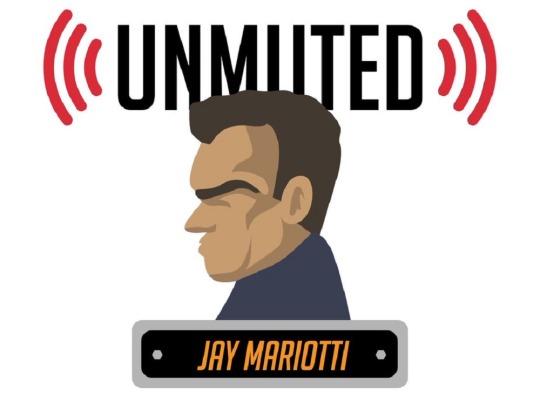
Can a man beat Urban Meyer and rule a large student body in one swoop? Jimmy Frat House might be the only coach capable of pulling this off. It’s amazing how he keeps his personal headline cycle generating with cool water-cooler buzz that must warm the collective embittered souls of 49ers fans, who at least can root for Harbaugh from afar while their franchise implodes amid a crippling roster exodus and a bizarre coaching appointment. If he already had blown away York and Baalke in the public-opinion race, what’s happened since is a rout akin to the last Seahawks loss.
There was Harbaugh on a snowy afternoon in Ann Arbor, playing good Samaritan when he observed a rollover crash on an interstate highway. Christine Mowrer didn’t know who he was, but covered in blood after her 2003 Jeep Cherokee flipped at least three times, she was relieved to see Harbaugh and another football staff member wrap her and her 73-year-old mother in blankets and administer first aid until help arrived. “He probably kept me from going into shock,” Mowrer, 53, told the Ann Arbor News from her hospital bed. “I had blood dripping out of my nose, and he helped me out and got me onto the ground.”
Meanwhile, in Santa Clara, York and Baalke were trying to explain the identity of Jim Tomsula and douse speculation that Tomsula had undercut Harbaugh to get his job, furthering perceptions that the departed angel had been sabotaged by the worst kind of office politics. As Harbaugh said to a Bay Area columnist, “[You] definitely walk down the halls and people look away or they look at you and you know something’s going on,” adding that it would be a good issue for Tomsula to address. When Tomsula did address it, he blamed the media and never really denied it.

There was Harbaugh, going to Michigan basketball games, belting out the “Hail to the Victors” school fight song and pressing his hand against his heart during the national anthem. There was Harbaugh, staying in a budget hotel with his assistant coaches and eating pre-dawn cereal in the lobby before carpooling to Schembechler Hall and staying until midnight. There was Harbaugh, hanging out with his 25-year-old son, Jay, the new tight ends coach. There was Harbaugh, waving at students who wear “Maize, Blue and Khaki” T-shirts and “Welcome to Ann Arbaugh” clothing lines. St. Jim, they were calling him.
Meanwhile, in Santa Clara, York and Baalke were ducking reporters on a day when serious explanations were needed for fans. Why was Patrick Willis retiring? Why were Frank Gore and Mike Iupati leaving? Why was Justin Smith considering leaving? Why was yet another player in trouble with the law? Why wasn’t the highly regarded Vic Fangio given the head coaching job? And why was Tomsula babbling incoherently during a CSN Bay Area introductory interview?
There was Harbaugh, a big fan of the “Judge Judy” show, using his Twitter feed to congratulate Judith Sheindlin for signing a contract extension, to which she replied with a good-luck wish for his opening collegiate season. There was Harbaugh, hosting NFL prospects Jameis Winston and Bryce Petty for precombine workouts in what only could be a tribute to his standing as a quarterbacking guru.
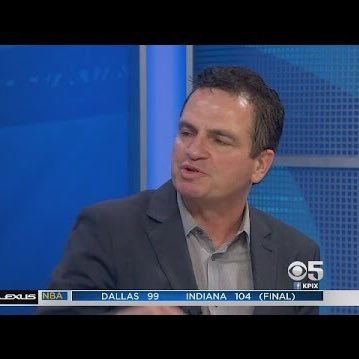
Meanwhile, in Santa Clara, Baalke was denying reports he is shopping Harbaugh’s regressing pet QB, Colin Kaepernick. This while Kaepernick was engaging in Twitter wars and telling one fan, @battman_returns, to “mind your damn business, clown” and to “get better at life!” — all because one Stephen Batten had said Kaepernick’s abs workouts wouldn’t help him find open receivers, which is kind of true.
There was Harbaugh, escaping the Midwest winter for Arizona, coaching first base for the A’s as a “special guest instructor” for an old pal from his Palo Alto boyhood, manager Bob Melvin. And you know what he said after the Cactus League victory? “How does it get any better than this?” he gushed, in a variation of his famous line. “It’s a great day for baseball, and just to be able to put on the uniform … I haven’t been in a baseball uniform since American Legion ball.”
“He’s an inspiration just walking out here,” Melvin said. “He’s got that air about him. He’s always been quite the competitor and everyone knows that. A winner. And whenever you can have guys like that around, guys benefit from it. Plus you don’t find too many guys who want to get in uniform and go out there and interact with the guys during the workout.” Meanwhile, in Santa Clara, emerging defensive star Chris Borland was becoming an inspiration in his own right by retiring from football at age 24, injecting a cursed element into the raging chaos.
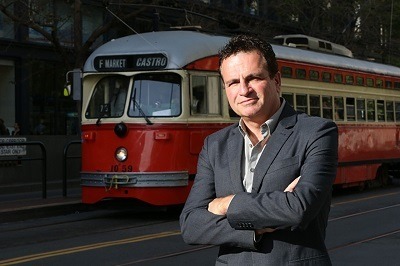
Given the turbulence and in-house leaks that undermined Harbaugh’s final season with the Niners, he deserves to experience a blossoming love affair at his alma mater. If York were an effective CEO, he would have made the Harbaugh-Baalke combination work and buffered their strained relations. The Seahawks have made it work with Pete Carroll and John Schneider, but instead of drawing lines for the coach and GM, York did the covenient management dance and sided with his fellow exec. I covered a fairly famous sports dynasty, the Chicago Bulls of the 1990s, that ended prematurely because an owner couldn’t soothe the differences between a general manager and a coach named Phil Jackson, who went on to win more championships than any coach in NBA history. Yet everyone weathered the storms long enough to win six titles, six more than these 49ers won.
“You have to have like-minded people building a team,” Baalke said in a media gathering after Tomsula’s first news conference. “If you don’t have like-minded people building a team, coach, coaching staff, front office … If we’re not all looking for the same characteristics, the same type of players, it’s tough to build a unit that can go out there on Sundays and win football games.”
We’re still waiting for York to say that he failed in letting the marriage collapse, in choosing a winner and a loser. Clearly, he wasn’t overly interested in appeasing Harbaugh after using his ultrasuccessful debut season to help get a $1.3-billion stadium built in Silicon Valley. The coach was too popular and wanted too much power, and regardless of his three consecutive appearances in the NFC title game, the big bosses wanted control and no tugging of the rope. Now, Baalke gets to pull the strings of his puppet, Tomsula, and tell him which assistants to hire and which players to acquire. Now, York can preside over his sterile, quiet stadium — the high-tech antithesis of Candlestick — and count megaprofits from Super Bowl 50, WrestleMania 31 and an outdoor hockey game.
Each party in this debacle has gained total control — Harbaugh in Ann Arbor, York and Baalke in Santa Clara. Yet only one man is going to win a lot of football games anytime soon. Someone asked Harbaugh if he viewed himself as the messiah of Michigan.
“I’m not comfortable with that at all,” he said.
Oh, yes, he is. Very comfortable.
Be happy for him. He deserves that much.
Mariotti is sports director and lead sports columnist at the San Francisco Examiner. He can be reached at [email protected]. Read his website at jaymariotti.com.
1 note
·
View note
Link
The Odyssey is about a man. It says so right at the beginning — in Robert Fagles’s 1996 translation, for example, the poem opens with the line, “Sing to me of the man, Muse, the man of twists and turns.”
In the course of the poem, that man plots his return home after fighting the Trojan War, slaughters the suitors vying to marry his wife Penelope, and reestablishes himself as the head of his household.
But the Odyssey is also about other people: Penelope, the nymph Calypso, the witch Circe, the princess Nausicaa; Odysseus’s many shipmates who died before they could make it home; the countless slaves in Odysseus’s house, many of whom are never named.
Emily Wilson, the first woman to translate the Odyssey into English, is as concerned with these surrounding characters as she is with Odysseus himself. Written in plain, contemporary language and released earlier this month to much fanfare, her translationlays bare some of the inequalities between characters that other translations have elided. It offers not just a new version of the poem, but a new way of thinking about it in the context of gender and power relationships today. As Wilson puts it, “the question of who matters is actually central to what the text is about.”
Why it matters for a woman to translate the Odyssey
Composed around the 8th century BC, the Odyssey is one of the oldest works of literature typically read by an American audience; for comparison, it’s almost 2,000 years older than Beowulf. While the Iliad tells the story of the Trojan War, the Odyssey picks up after the war is over, when Odysseus, the king of Ithaca, is trying to make his way home.
Both poems are traditionally attributed to the Greek poet Homer, but since they almost certainly originated as oral performances and not written texts, it’s hard to tell whether a single person composed them, or whether they are the result of many different creators and performers refining and contributing to a story over a period of time. (The introduction to Wilson’s translation includes a longer discussion of the question of who “Homer” was.)
Wilson, a professor of classical studies at the University of Pennsylvania, has also translated plays by the ancient Greek playwright Euripides and the Roman philosopher Seneca. Her translation of the Odyssey is one of many in English (though the others have been by men), including versions by Fagles, Robert Fitzgerald, Richmond Lattimore, and more. Translating the long-dead language Homer used — a variant of ancient Greek called Homeric Greek — into contemporary English is no easy task, and translators bring their own skills, opinions, and stylistic sensibilities to the text. The result is that every translation is different, almost a new poem in itself.
A battlefield epic, the Iliad has very few major female characters. The Odyssey, however, devotes significant time to the life (and even the dreams) of Penelope. Circe, Calypso, and the goddess Athena all play important roles. This was one of the reasons I was drawn to the Odyssey as a teenager, and why I’ve returned to it many times over the years.
But the Odyssey is hardly a feminist text. Odysseus may have trouble getting home, but at least he gets to travel the world and have sex with beautiful women like Calypso and Circe. Penelope, meanwhile, has to wait around while boorish suitors drink and carouse in her family’s home, pressuring her to marry one of them. To buy time, she says she can’t marry until she finishes weaving a funeral shroud for her father-in-law, but every night she undoes the day’s work, making the task last as long as she can. “His work always gets him somewhere,” Wilson told me. “Her work is all about undoing. It’s all about hiding herself, hiding her desires, and creating something whose only purpose is to get nowhere.”
Some feminist readings of the Odyssey have tried to cast Penelope as heroic in her own way, sometimes by comparing her to Odysseus. “I think there’s so many things wrong with that,” Wilson said. “She’s constantly still being judged by, is she like him.” What’s more, the heroic-Penelope reading focuses on a wealthy woman at the expense of the many enslaved women in the poem, some of whom meet an untimely and brutal end. When Odysseus returns home and kills all the suitors, he also tells his son Telemachus to kill the slave women who had sex with (or were raped by) the suitors. “Hack at them with long swords, eradicate / all life from them,” Odysseus says in Wilson’s translation. “They will forget the things / the suitors made them do with them in secret.”
As a woman, Wilson believes she comes to the Odyssey with a different perspective than translators who have gone before her. “Female translators often stand at a critical distance when approaching authors who are not only male, but also deeply embedded in a canon that has for many centuries been imagined as belonging to men,” she wrote in a recent essay at the Guardian. She called translating Homer as a woman an experience of “intimate alienation.”
“Earlier translators are not as uncomfortable with the text as I am,” she explained to me, “and I like that I’m uncomfortable.” Part of her goal with the translation was to make readers uncomfortable too — with the fact that Odysseus owns slaves, and with the inequities in his marriage to Penelope. Making these aspects of the poem visible, rather than glossing over them, “makes it a more interesting text,” she said.
Wilson’s translation is different from its predecessors in subtle — and not so subtle — ways
Part of the way Wilson challenges previous readings of the Odyssey is with style. Her translation made a splash months before it was published, when an excerpt ran in the summer 2017 issue of the Paris Review. I and other Odyssey fans were excited by Wilson’s opening line: “Tell me about a complicated man.” In its matter-of-fact language, it’s worlds different from Fagles’s “Sing to me of the man, Muse,” or Robert Fitzgerald’s 1961 version, “Sing in me, Muse, and through me tell the story / of that man skilled in all ways of contending.” Wilson chose to use plain, relatively contemporary language in part to “invite readers to respond more actively with the text,” she writes in a translator’s note. “Impressive displays of rhetoric and linguistic force are a good way to seem important and invite a particular kind of admiration, but they tend to silence dissent and discourage deeper modes of engagement.”
“There’s an idea that Homer has to sound heroic and ancient,” Wilson told me, but that idea comes with a value system attached, one that includes “endorsing this very hierarchical kind of society as if that’s what heroism is.” Telling the story in plainer language allows readers to see Odysseus and his society in another light.
There are flashes of beauty in Wilson’s Odyssey. “The early Dawn was born,” she writes in Book 2; “her fingers bloomed.” Of the forest on Calypso’s island, where many birds nest, she writes, “It was full of wings.” But throughout the book, there’s a frankness to Wilson’s language around work and the people who do it. Of Eurymedusa, a slave in the house of princess Nausicaa, she writes, “She used to babysit young Nausicaa / and now she lit her fire and cooked her meal.”
The slaves in older translations of the Odyssey do not “babysit” — often, they’re not identified as slaves at all. Fagles, for instance, calls Eurymedusa a “chambermaid.” Fitzgerald calls her a “nurse.” “It sort of stuns me when I look at other translations,” Wilson said, “how much work seems to go into making slavery invisible.”
Wilson, by contrast, uses the word “slave” for Eurymedusa and many other enslaved characters, even when the original uses a more specific term. The Homeric Greek dmoe, or “female-house-slave,” Wilson writes in her translator’s note, could be translated as “maid” or “domestic servant,” but those terms would imply that the woman was free. “The need to acknowledge the fact and the horror of slavery,” she writes, “and to mark the fact that the idealized society depicted in the poem is one where slavery is shockingly taken for granted, seems to me to outweigh the need to specify, in every instance, the type of slave.”
While Wilson’s language is often plain, it’s also carefully chosen. She told Wyatt Mason at the New York Times magazine she could have begun the poem with the line “Tell me about a straying husband,” an even more radical choice that would still have been “a viable translation.” But, she said, “it would give an entirely different perspective and an entirely different setup for the poem.” She spoke, Mason noted, with “the firmness of someone making hard choices she believes in.”
Those choices show up clearly in her treatment of Penelope. Penelope is a frustrating character — it’s not entirely clear why she doesn’t simply send the suitors away or marry one of them, and the poem offers limited access to her thoughts and feelings. Wilson didn’t try to make Penelope easier to understand — “the opacity of Penelope,” as she puts it, is one of the aspects of the poem she wants to trouble readers and make them uncomfortable.
But small details can tell us something about even the most frustrating of characters. At one point in Book 21, Penelope unlocks the storeroom where Odysseus keeps his weapons — as Wilson writes in her translator’s note, this act sets in motion the slaughter of the suitors and the resolution of the poem. As she picks up the key, Homer describes her hand as pachus, or “thick.” “There is a problem here,” Wilson writes, “since in our culture, women are not supposed to have big, thick, or fat hands.” Translators have usually solved the problem by skipping the adjective, or putting in something more traditional — Fagles mentions Penelope’s “steady hand.” Wilson, however, renders the moment this way: “Her muscular, firm hand/ picked up the ivory handle of the key.”
“Weaving does in fact make a person’s hands more muscular,” she writes. “I wanted to ensure that my translation, like the original, underlines Penelope’s physical competence, which marks her as a character who plays a crucial part in the action — whether or not she knows what she is doing.”
Wilson does not give Penelope more agency or power than she has in the original poem, but she also does not take any of the queen’s original power away by making descriptions of her conform to modern gender stereotypes.
“Part of fighting misogyny in the current world is having a really clear sense of what the structures of thought and the structures of society are that have enabled androcentrism in different cultures, including our own,” Wilson said, and the Odyssey, looked at in the right way, can help readers understand those structures more clearly. The poem offers a “defense of a male dominant society, a defense of its own hero and his triumph over everybody else,” she said, “but it also seems to provide these avenues for realizing what’s so horrible about this narrative, what’s missing about this narrative.”
Recent events have led to a widespread debate over how audiences should consume the work of people we know to be abusers of women. This is intertwined with the question of how we should consume art that has racist, sexist, or otherwise bigoted elements. Often elided from this conversation is the fact that people of color and women of all races have been consuming racist and sexist art in America for generations (in many classes on Western literature, for instance, they have had little choice), and developing their own responses to it, responses that are often deeply nuanced.
Conservative talk of “special snowflakes” demanding trigger warnings ignores the fact that people marginalized in the Western canon have long read literature from it in exactly the way Wilson describes: both as an endorsement of its author’s values, and as evidence of how horrible those values can be, and whom they leave out.
Wilson’s translation, then, is not a feminist version of the Odyssey. It is a version of the Odyssey that lays bare the morals of its time and place, and invites us to consider how different they are from our own, and how similar.
2K notes
·
View notes